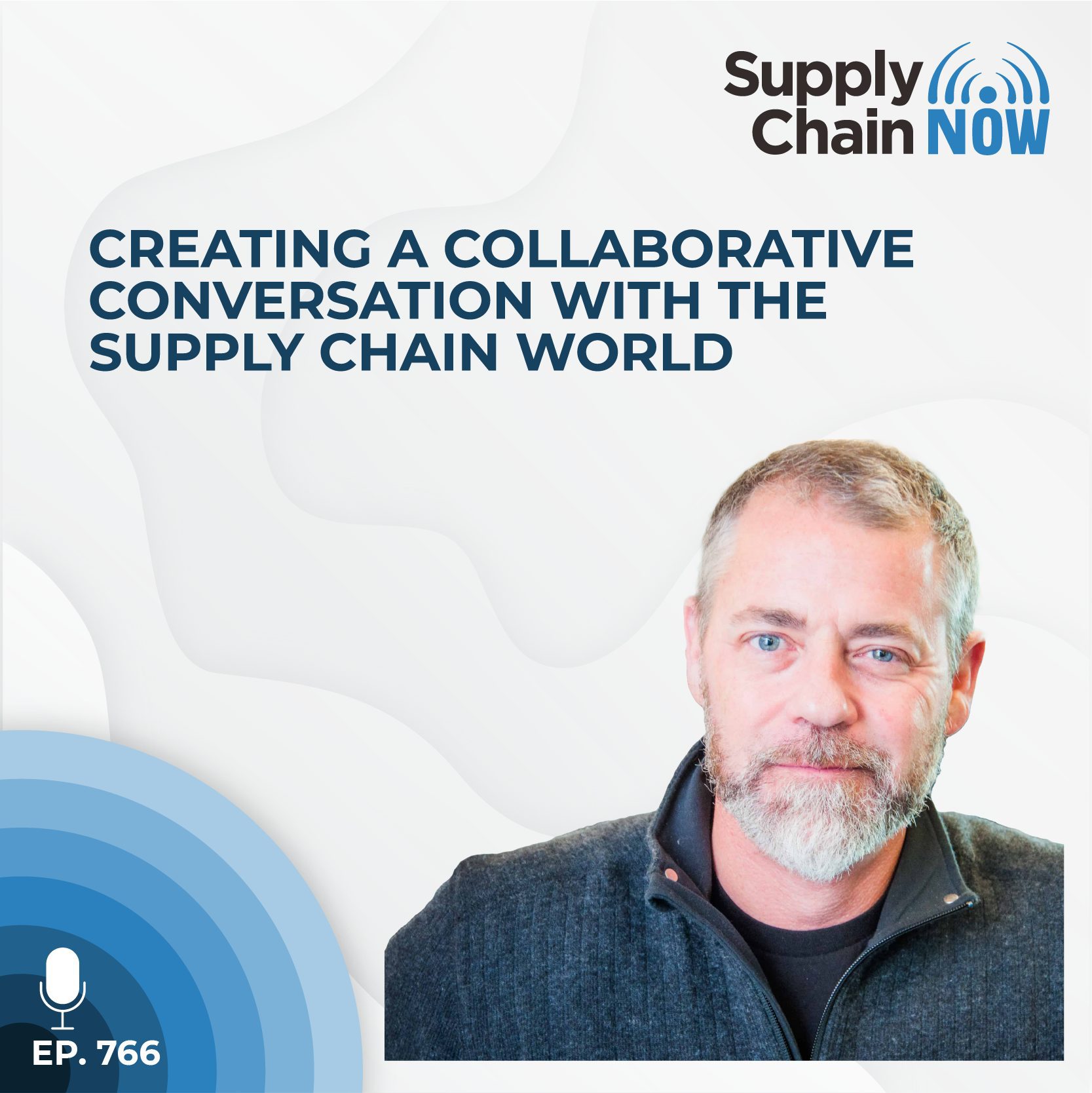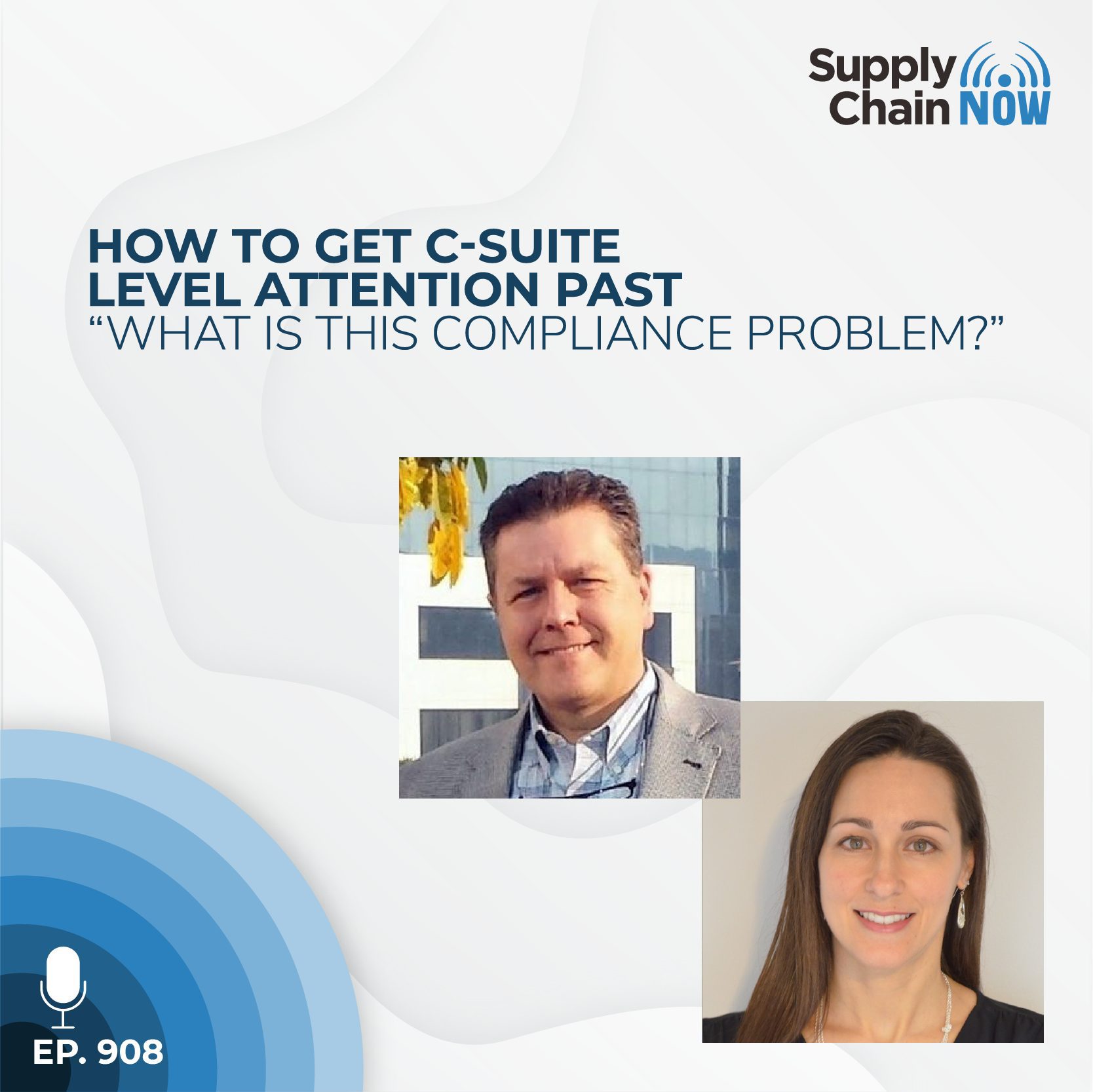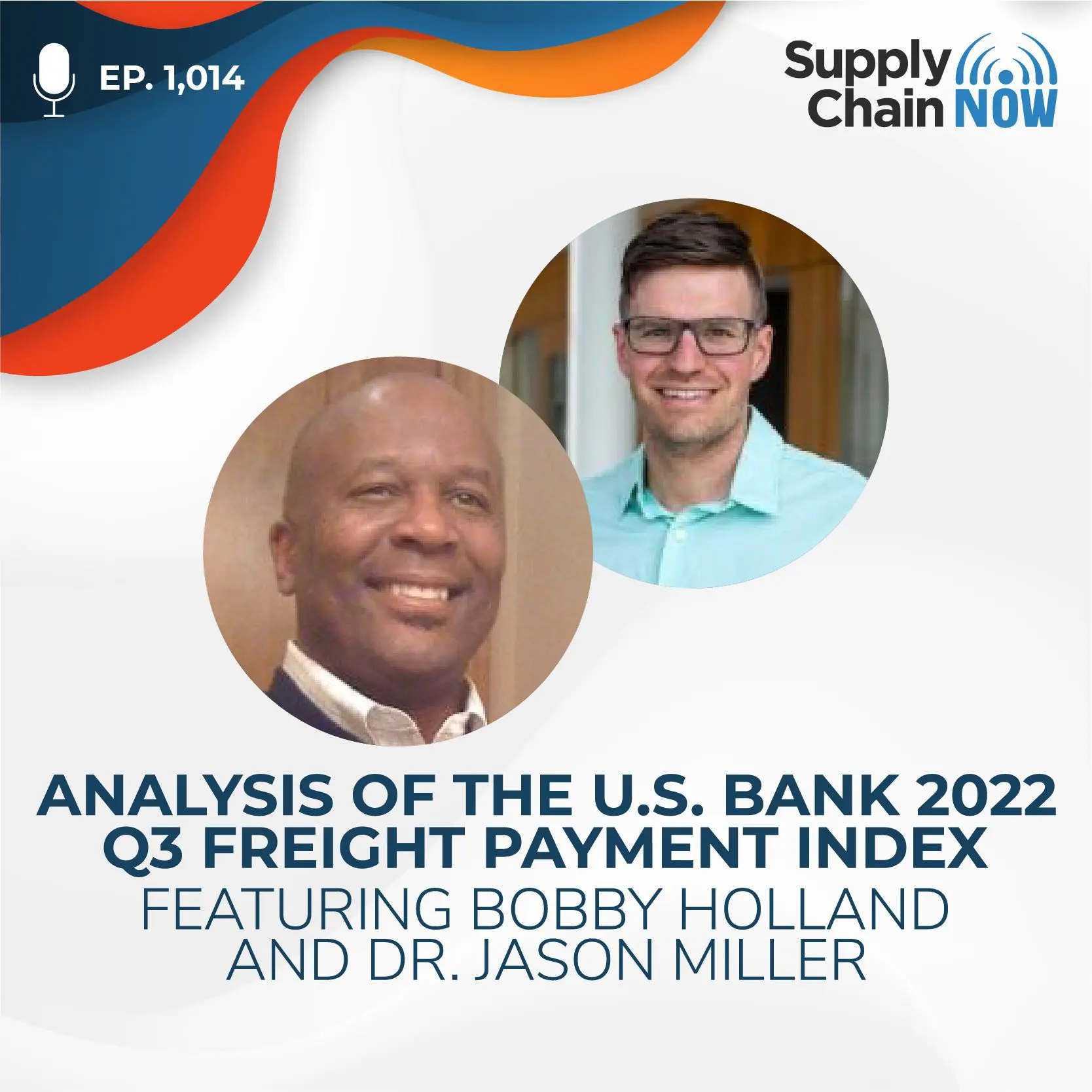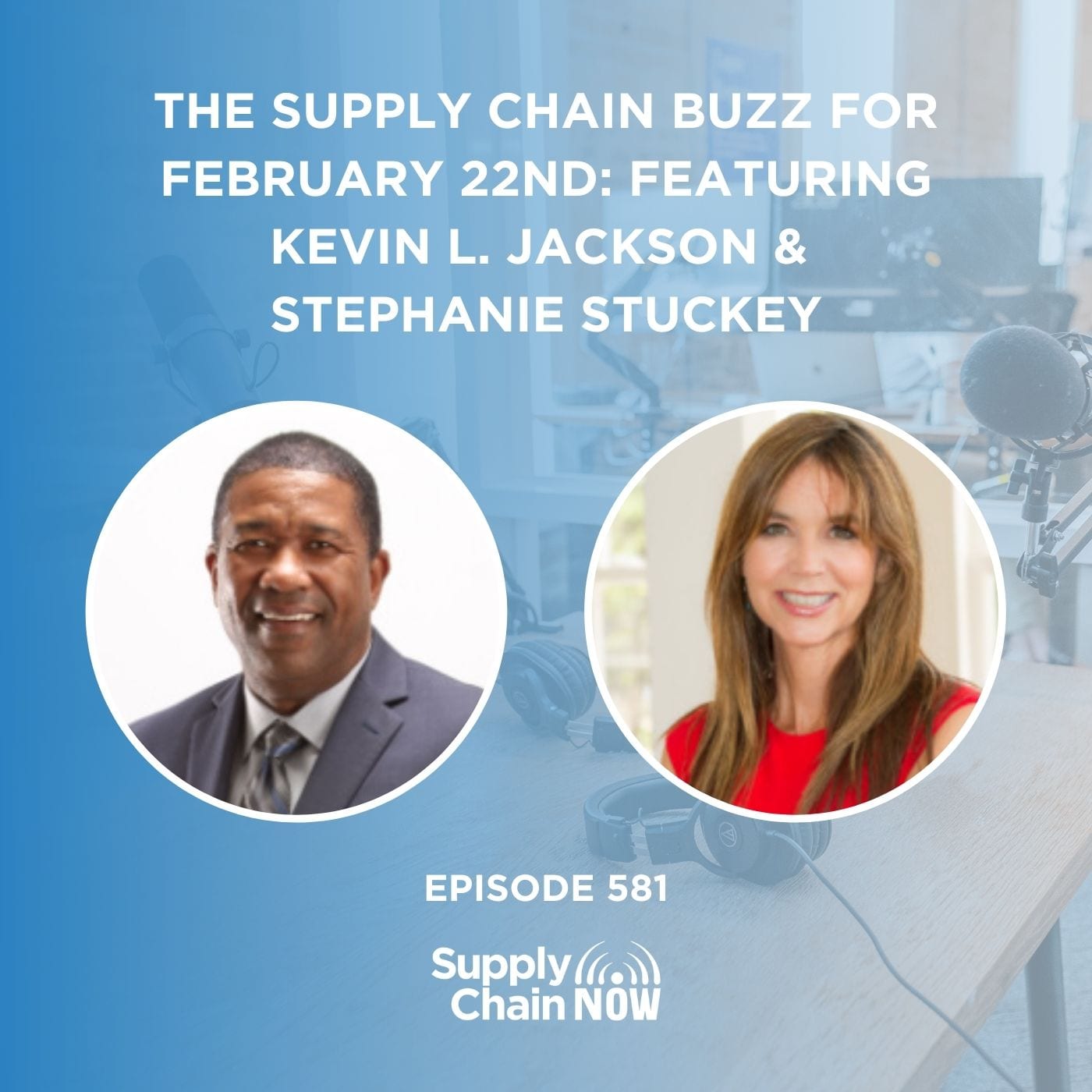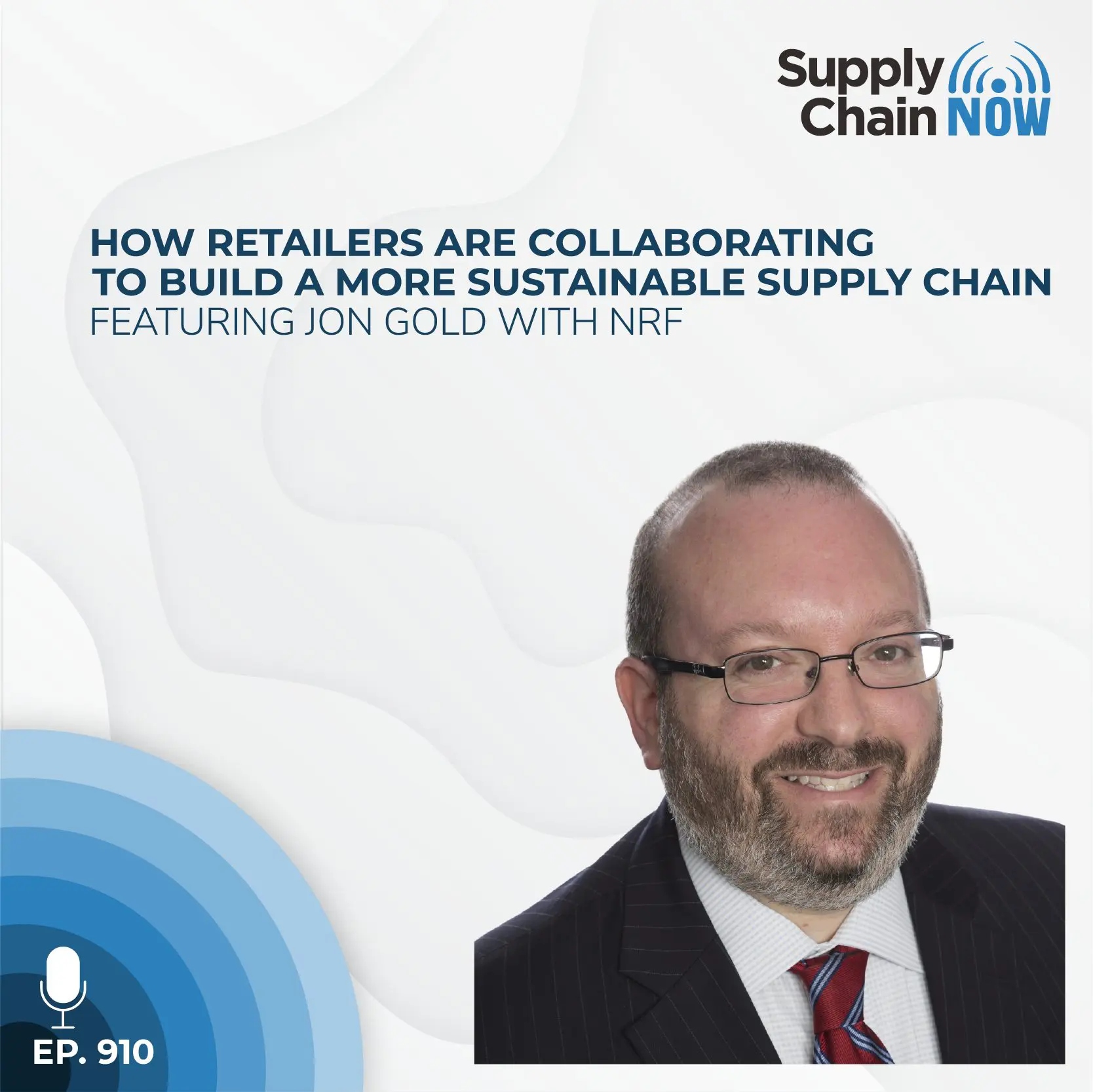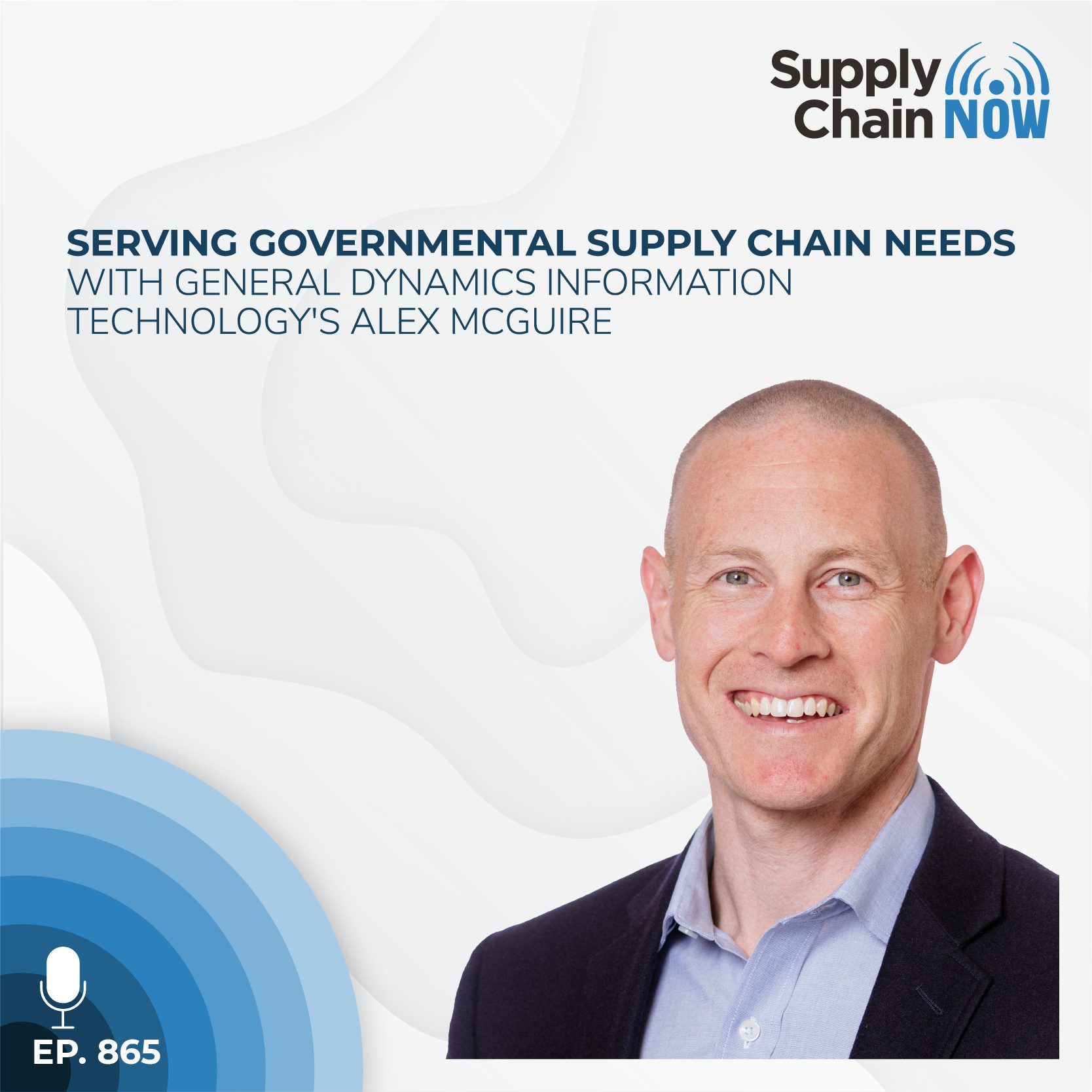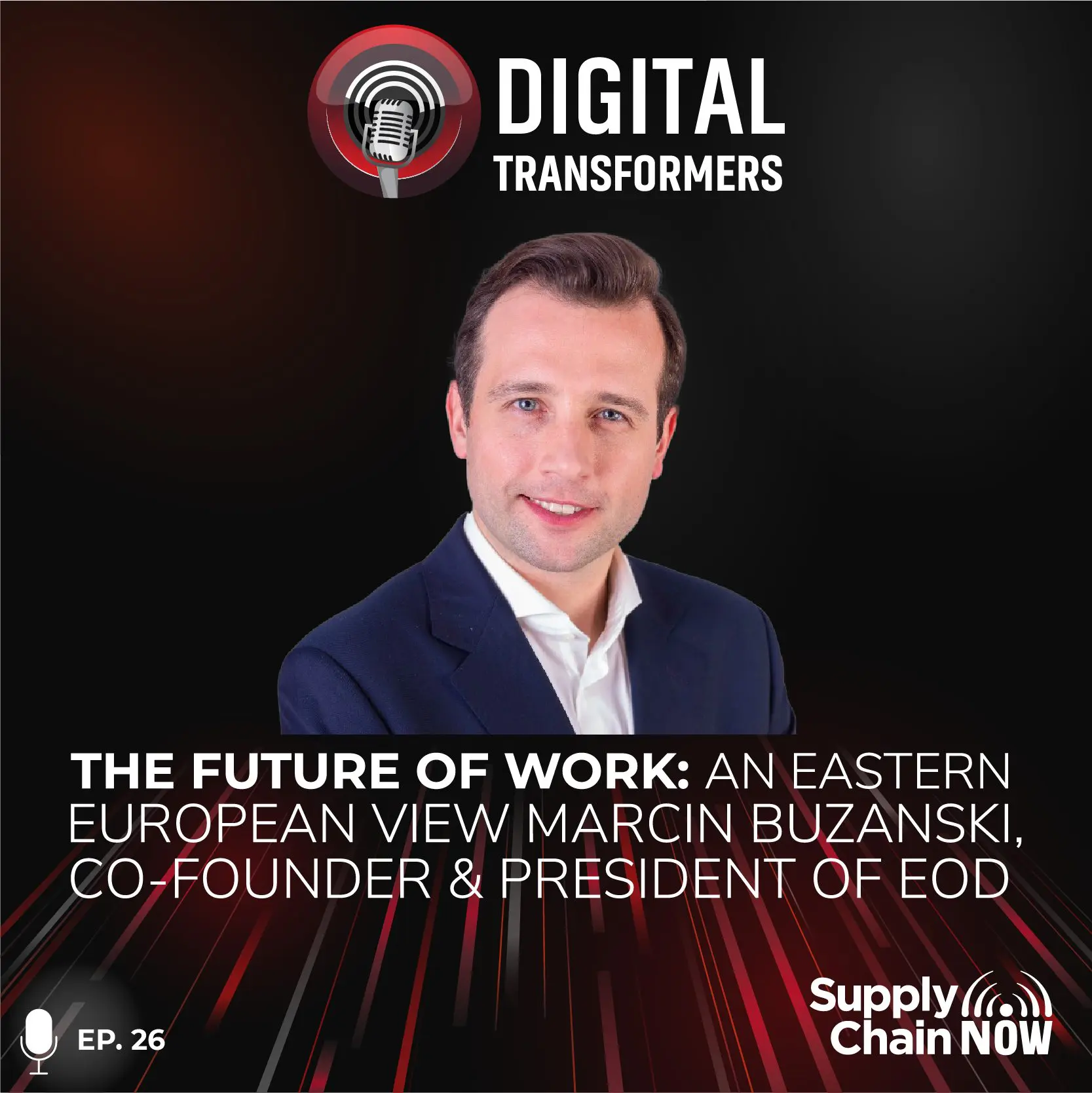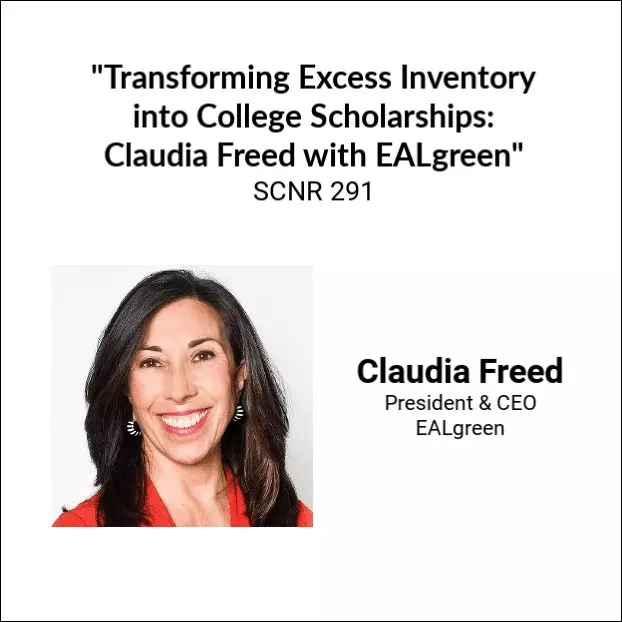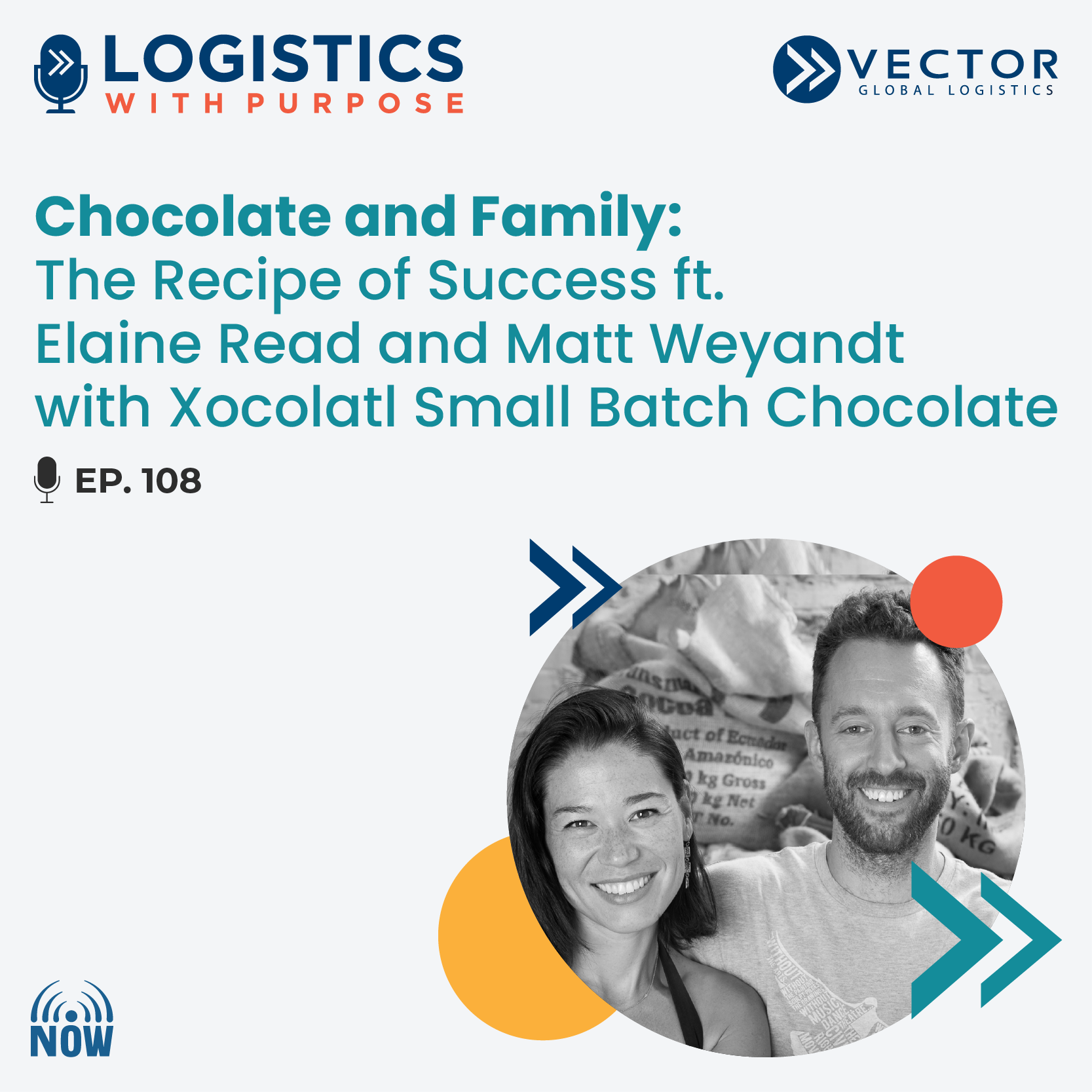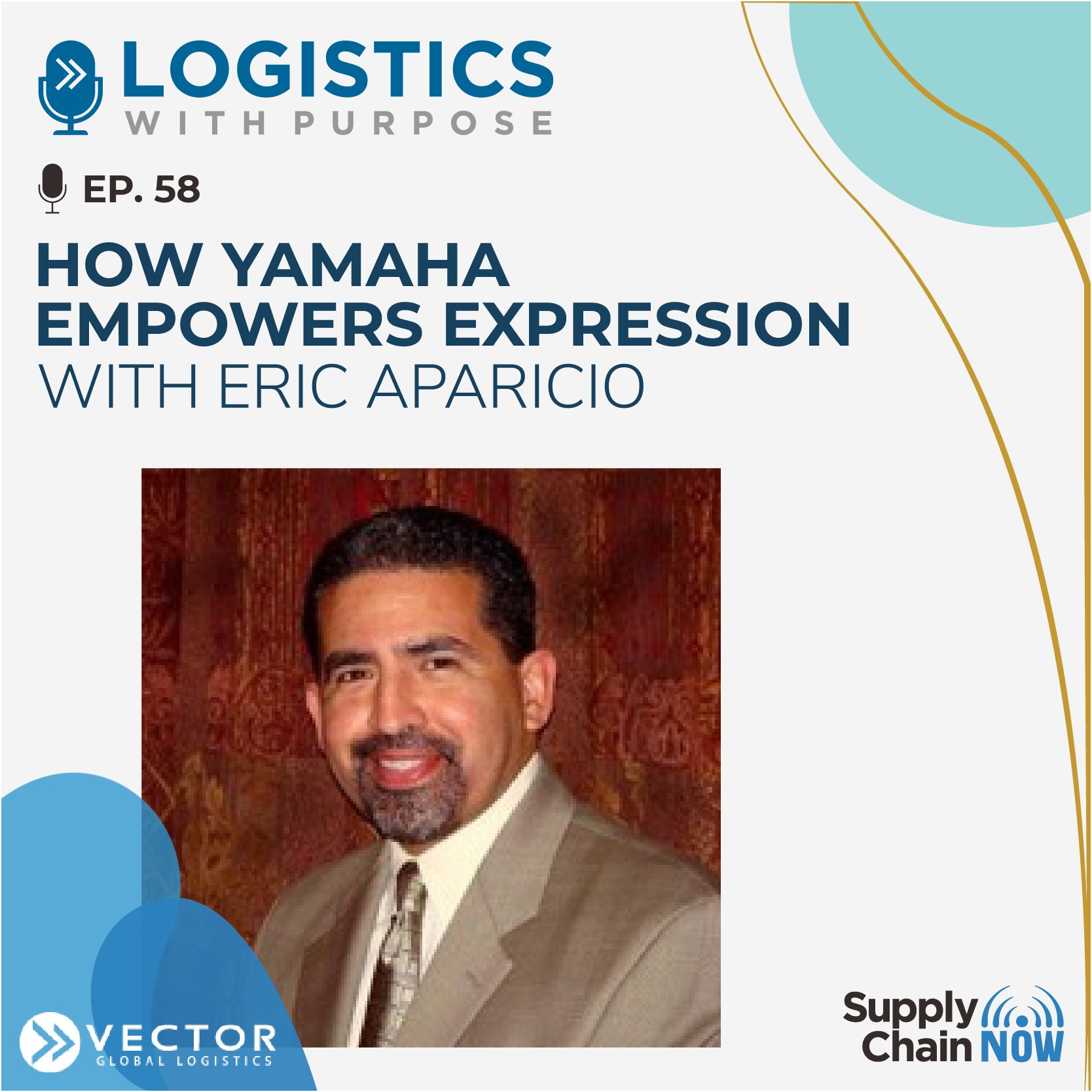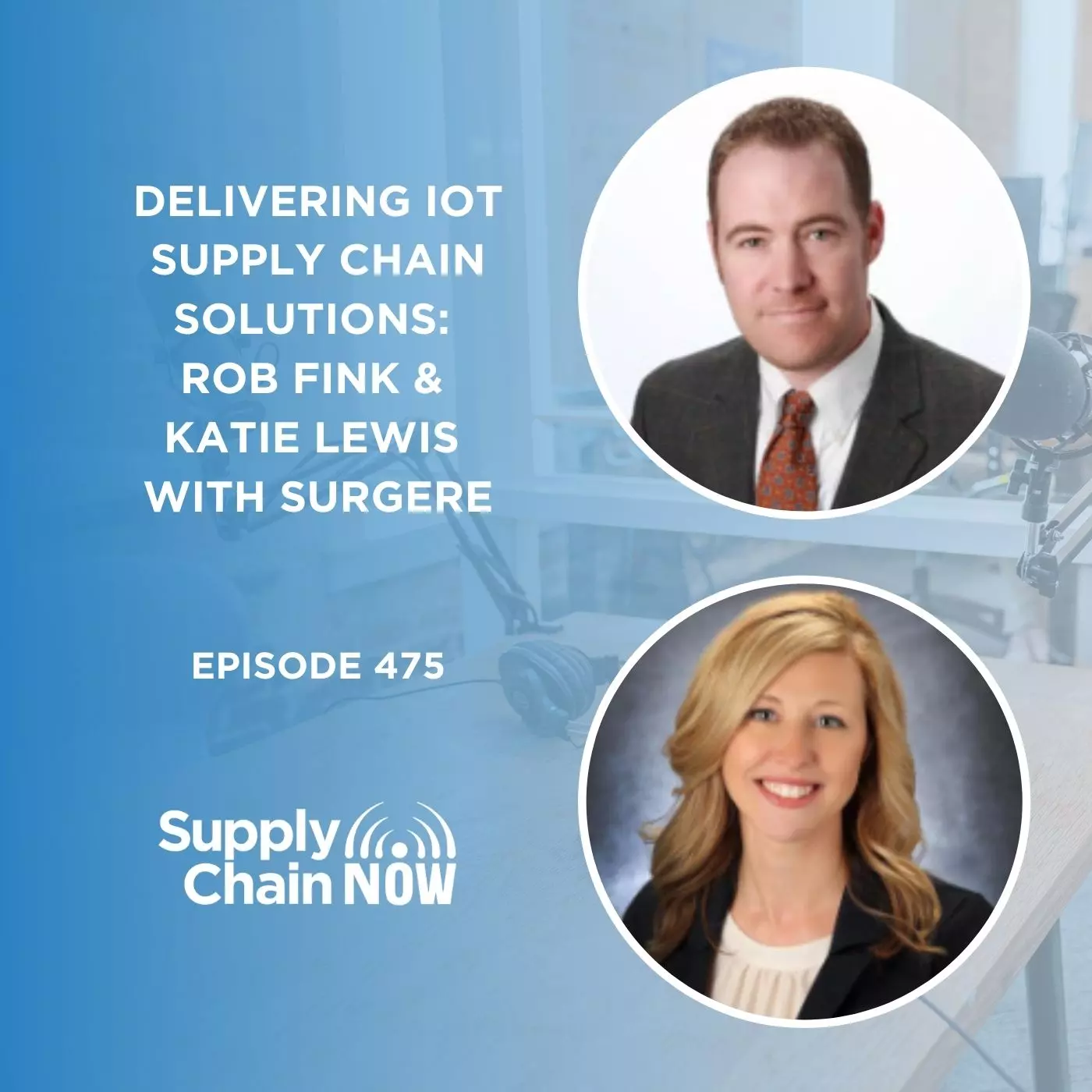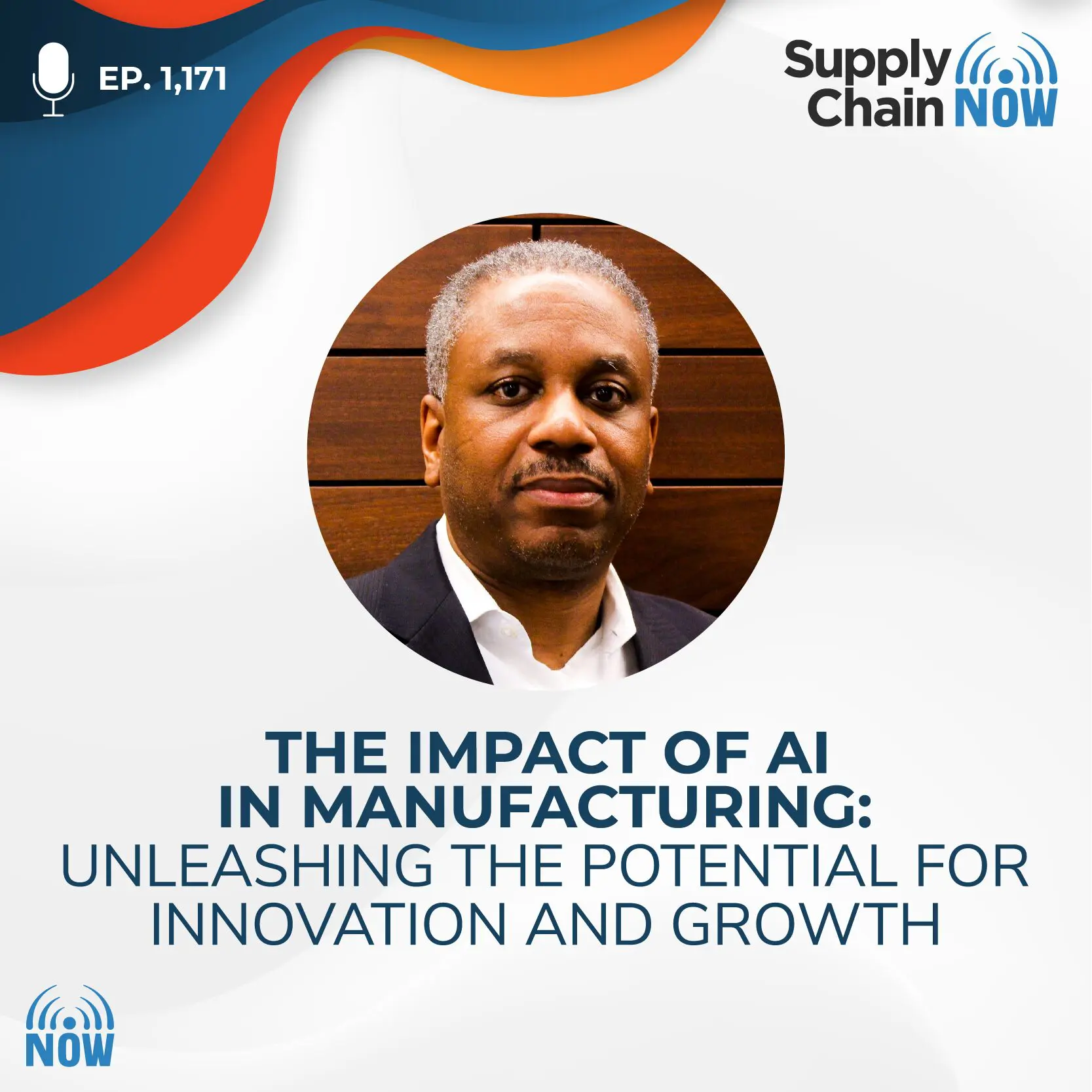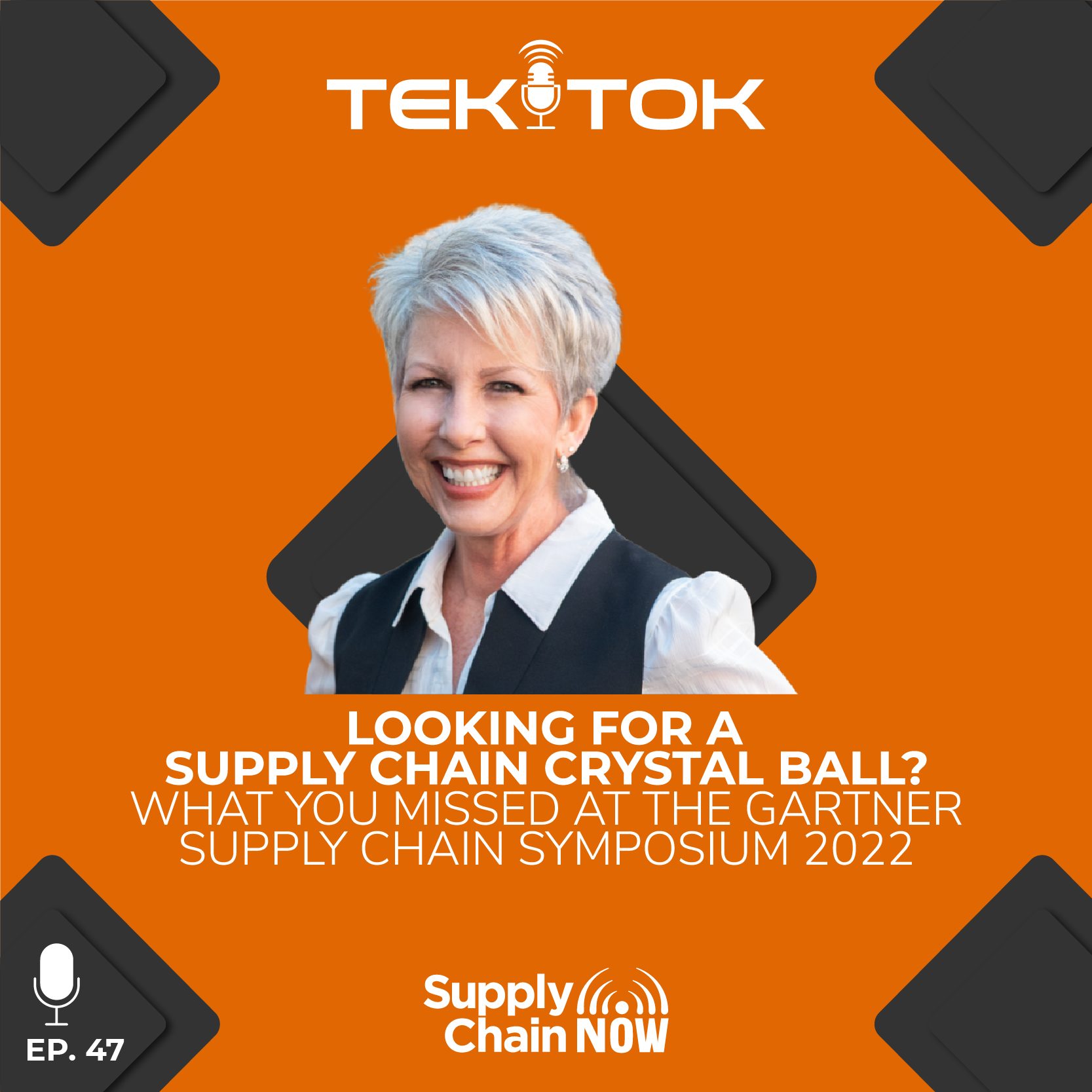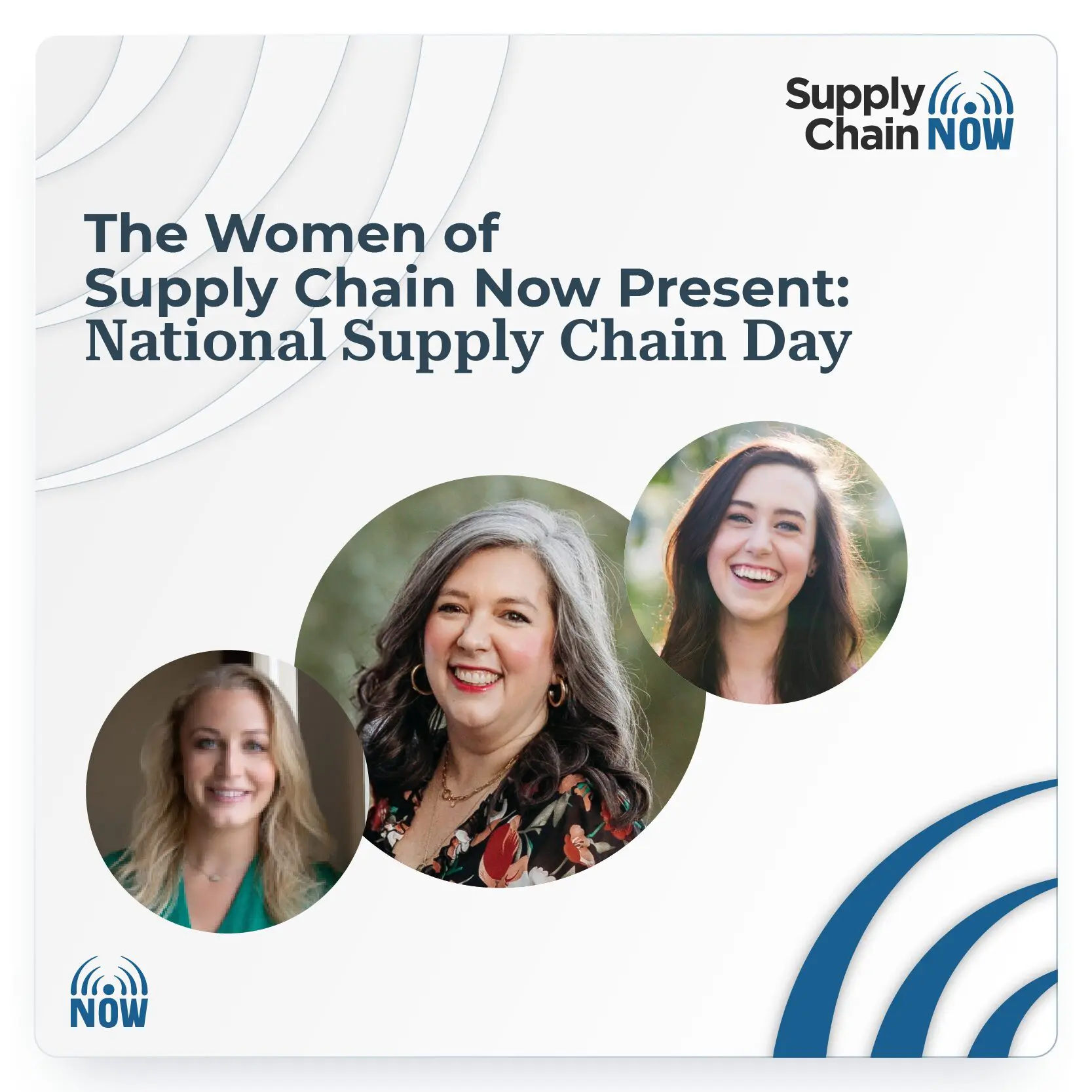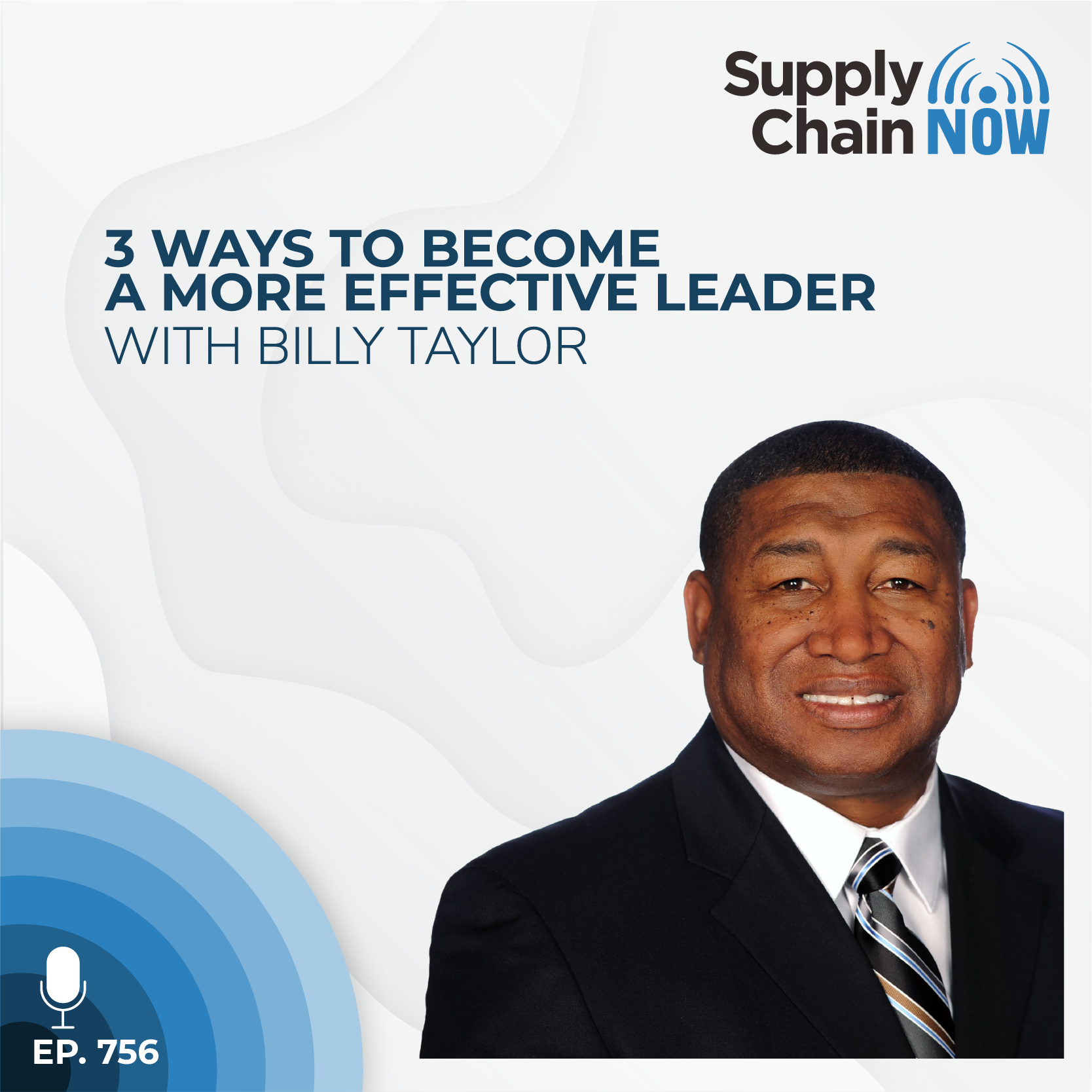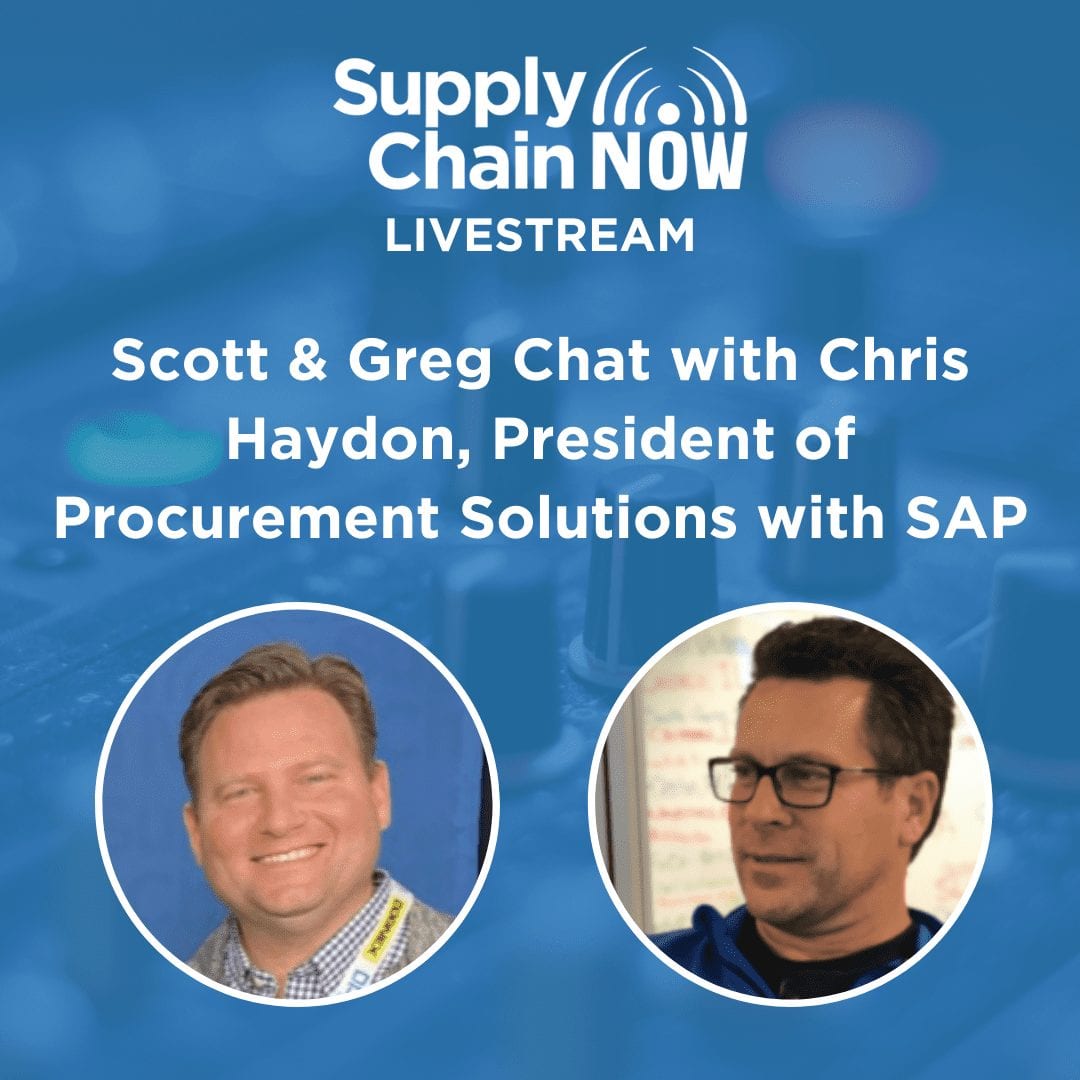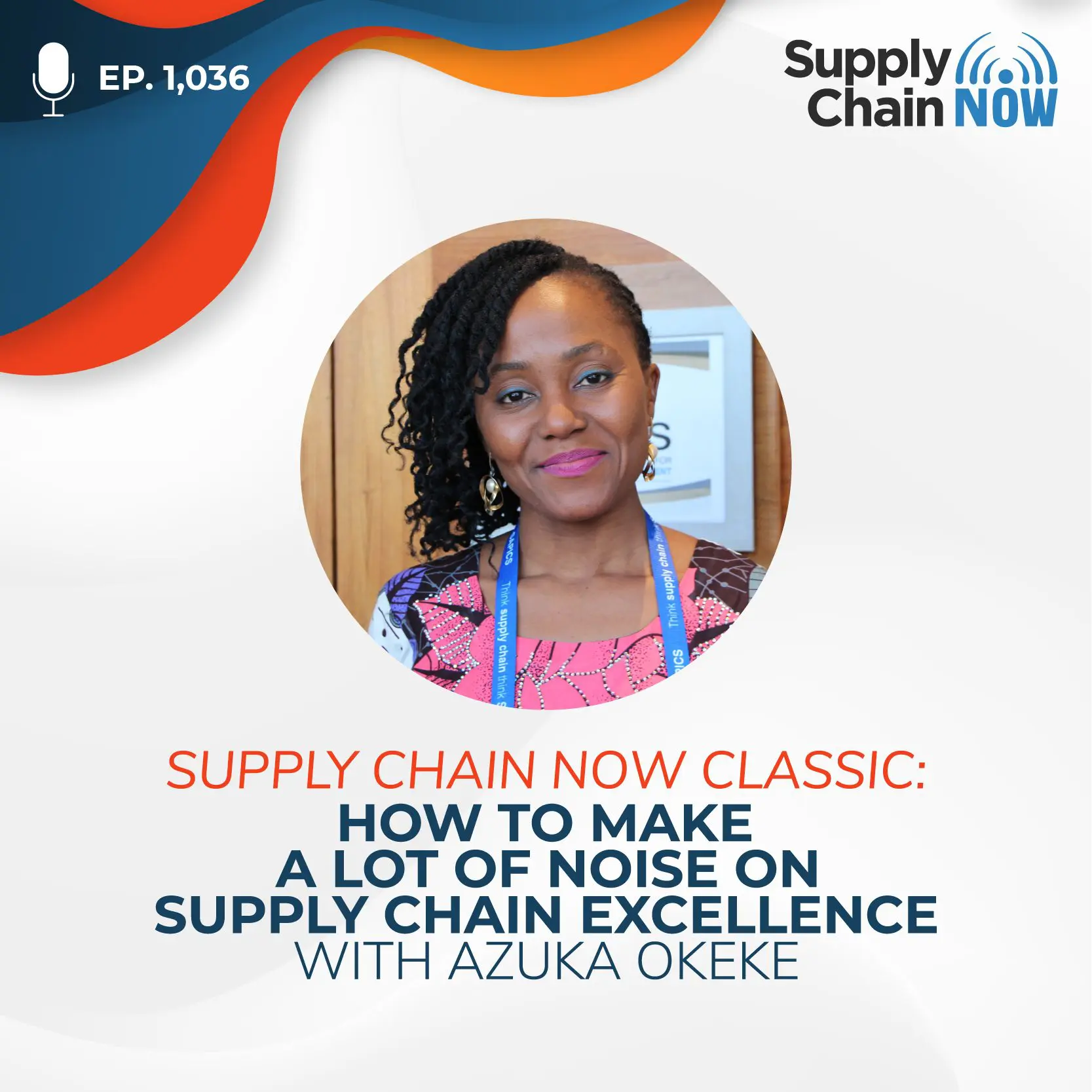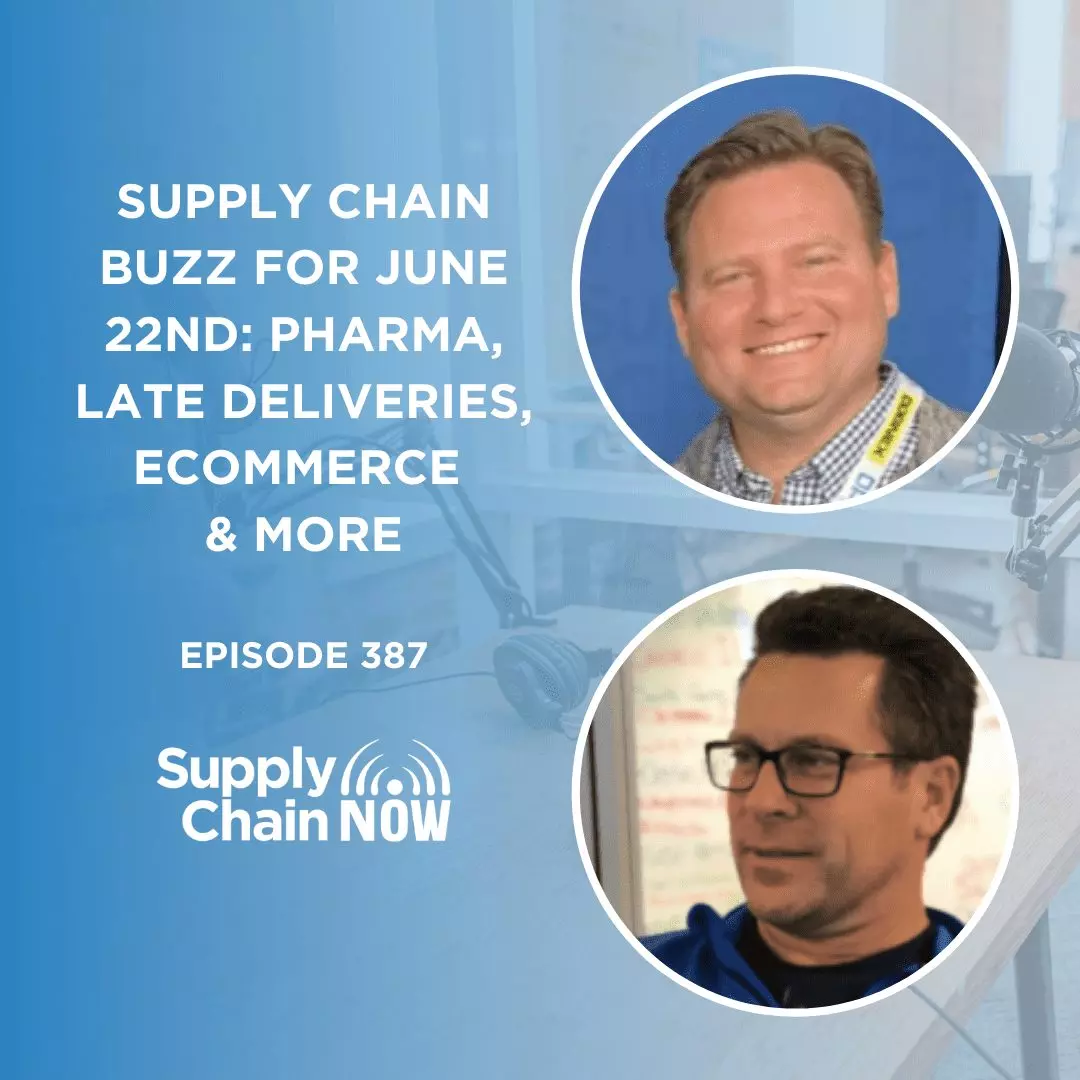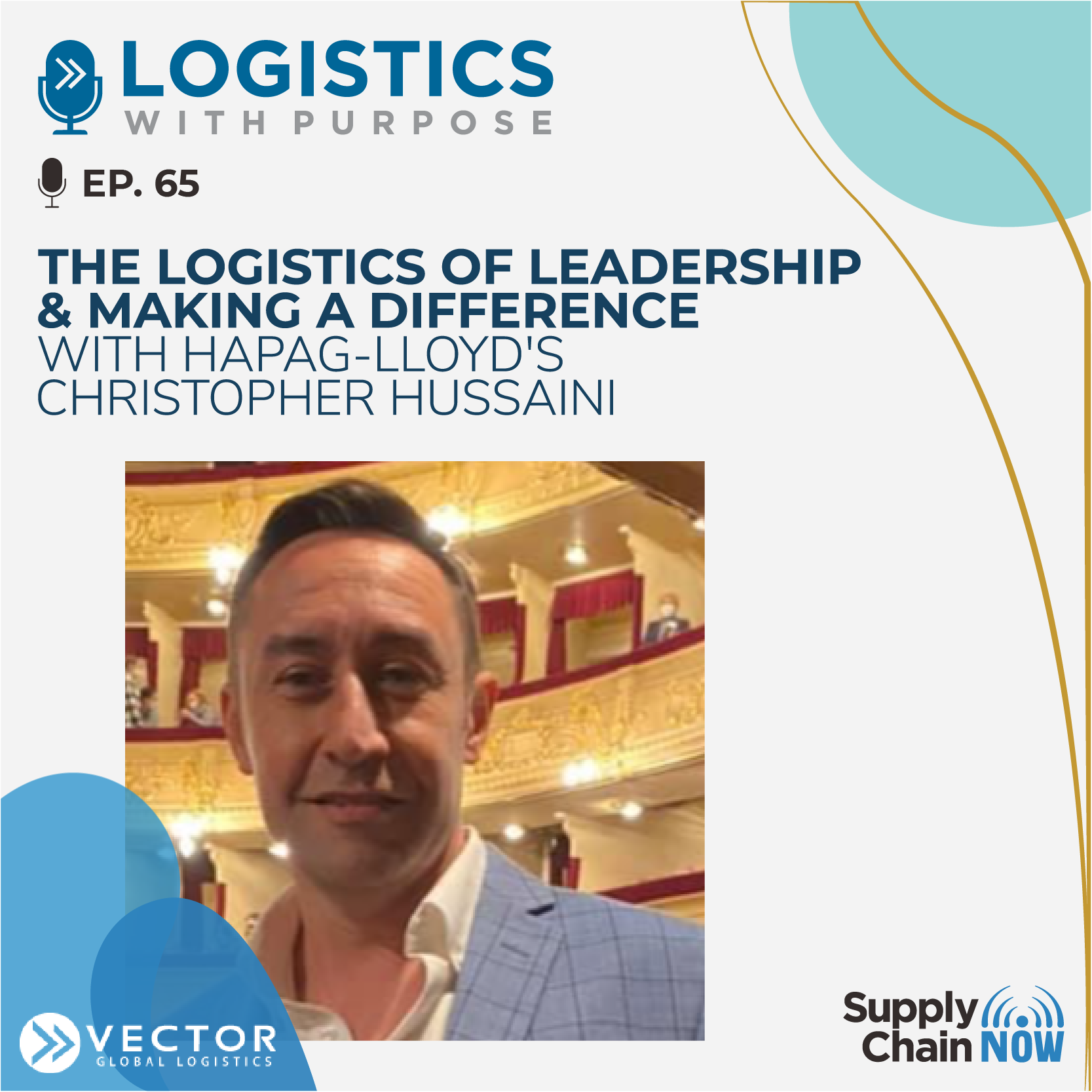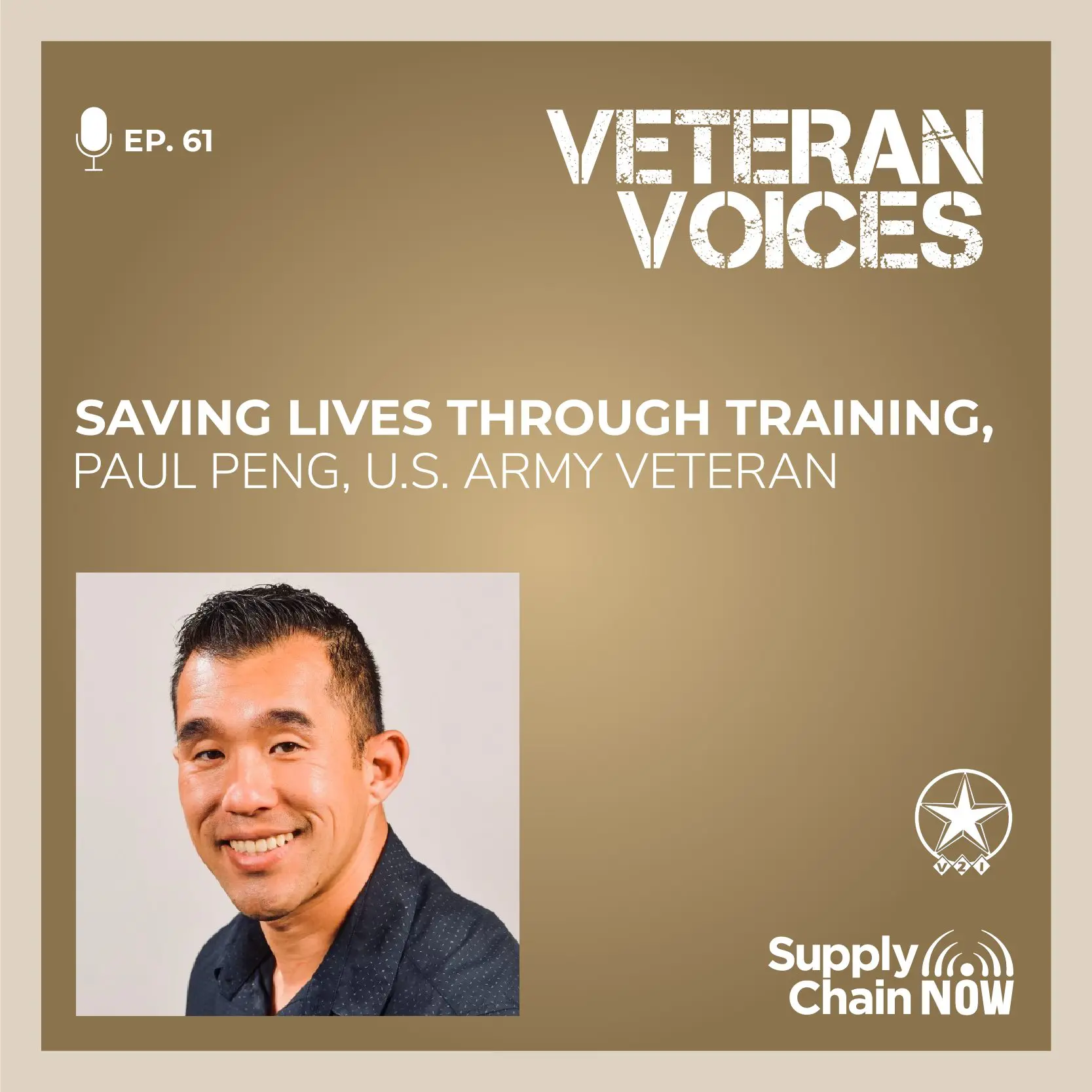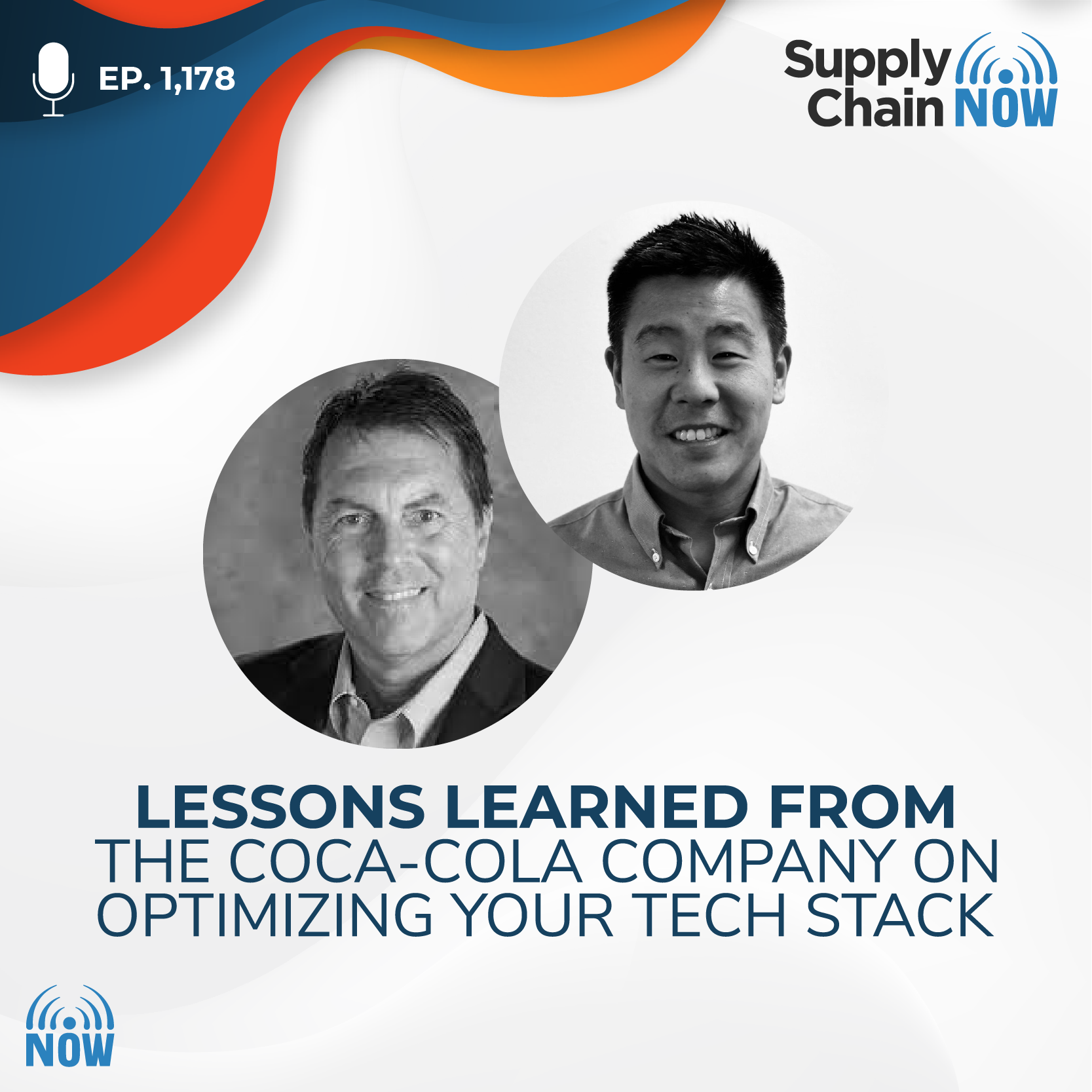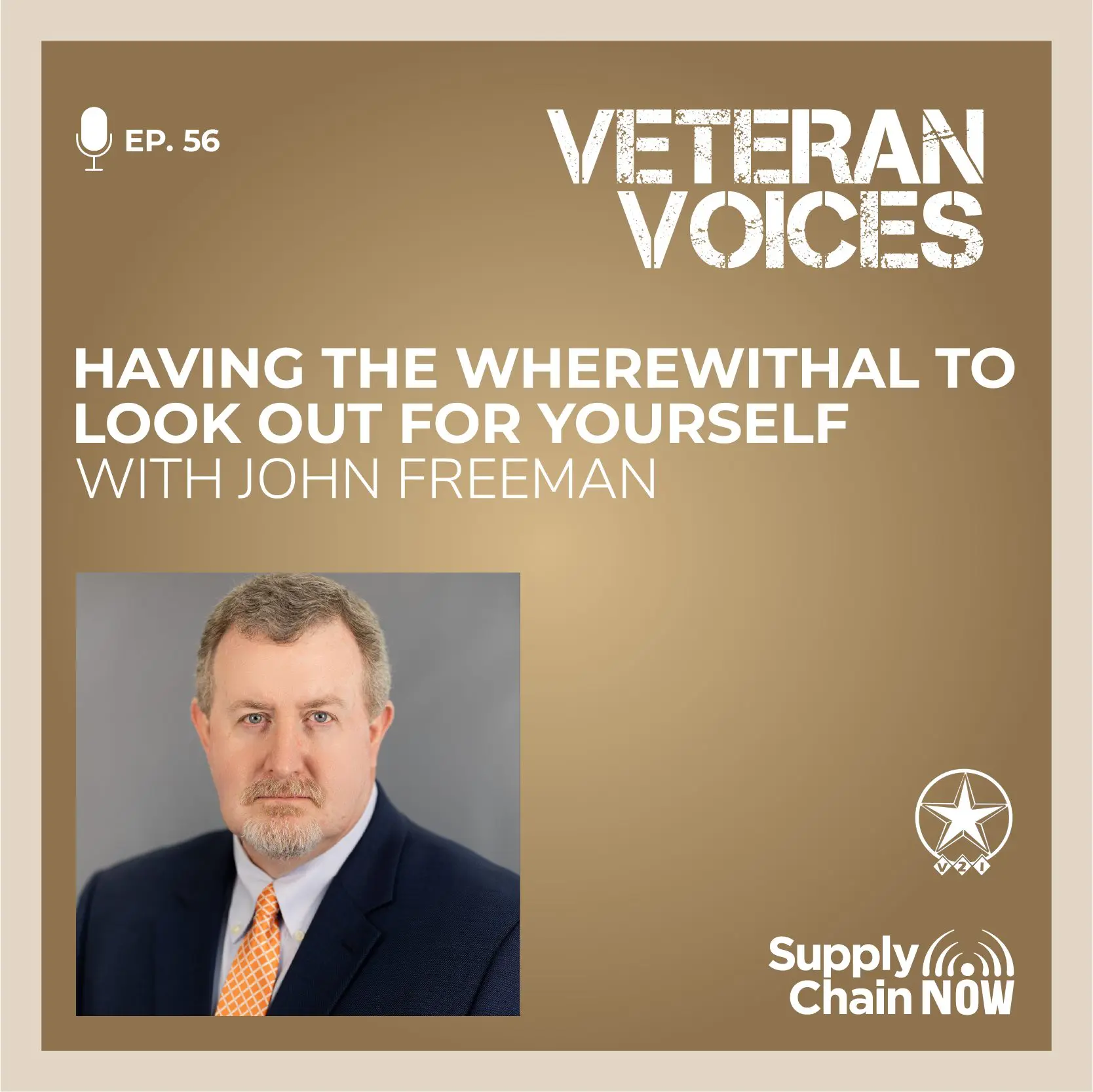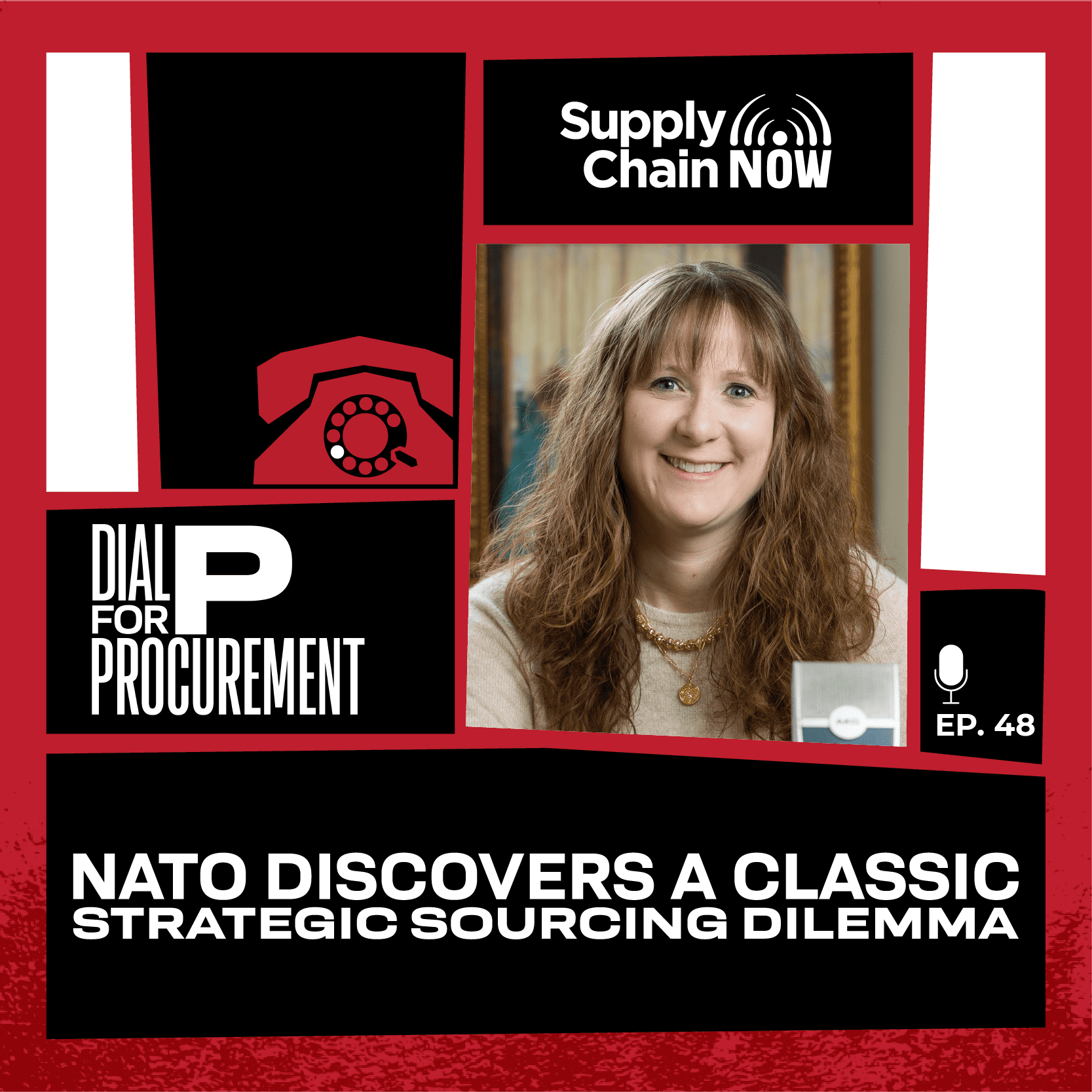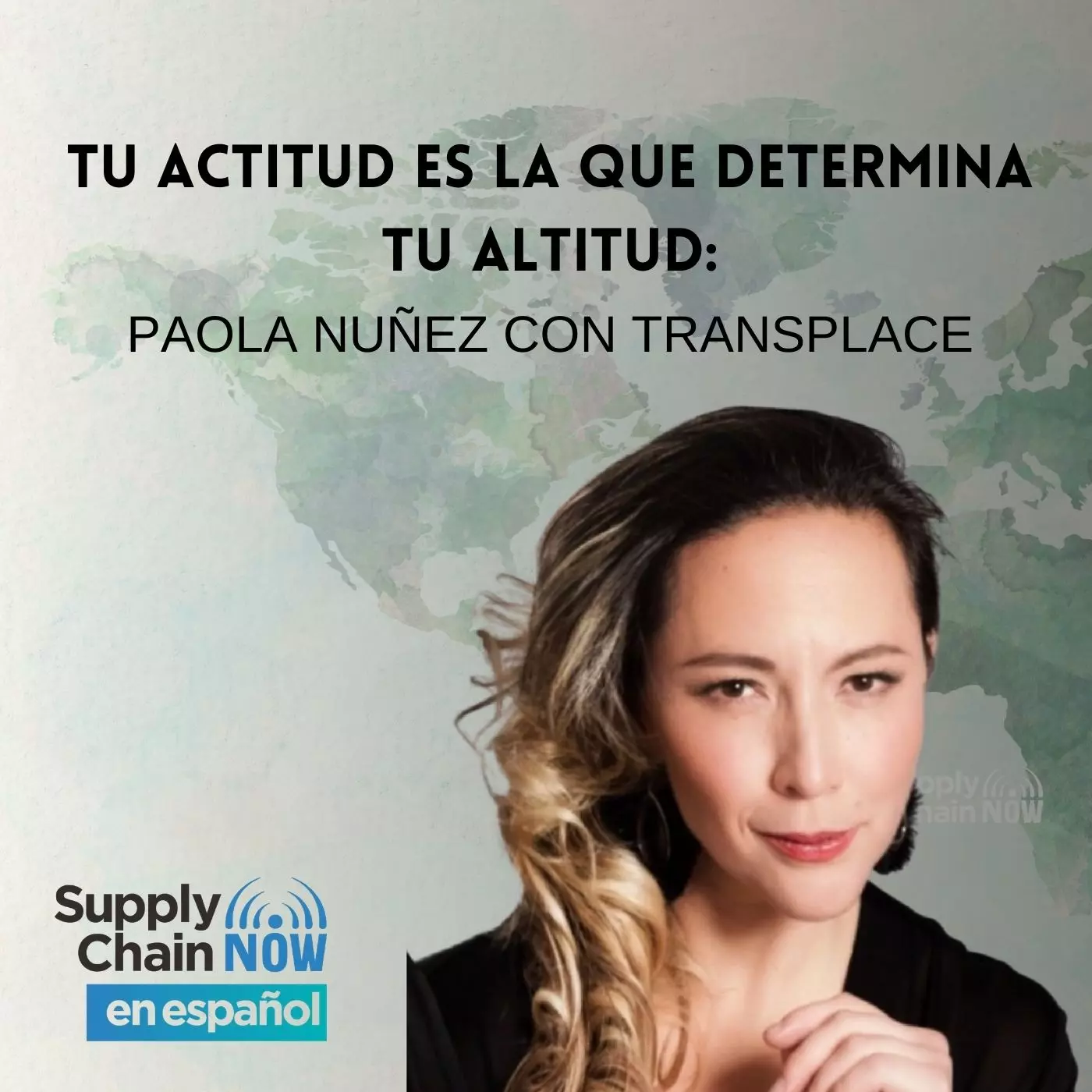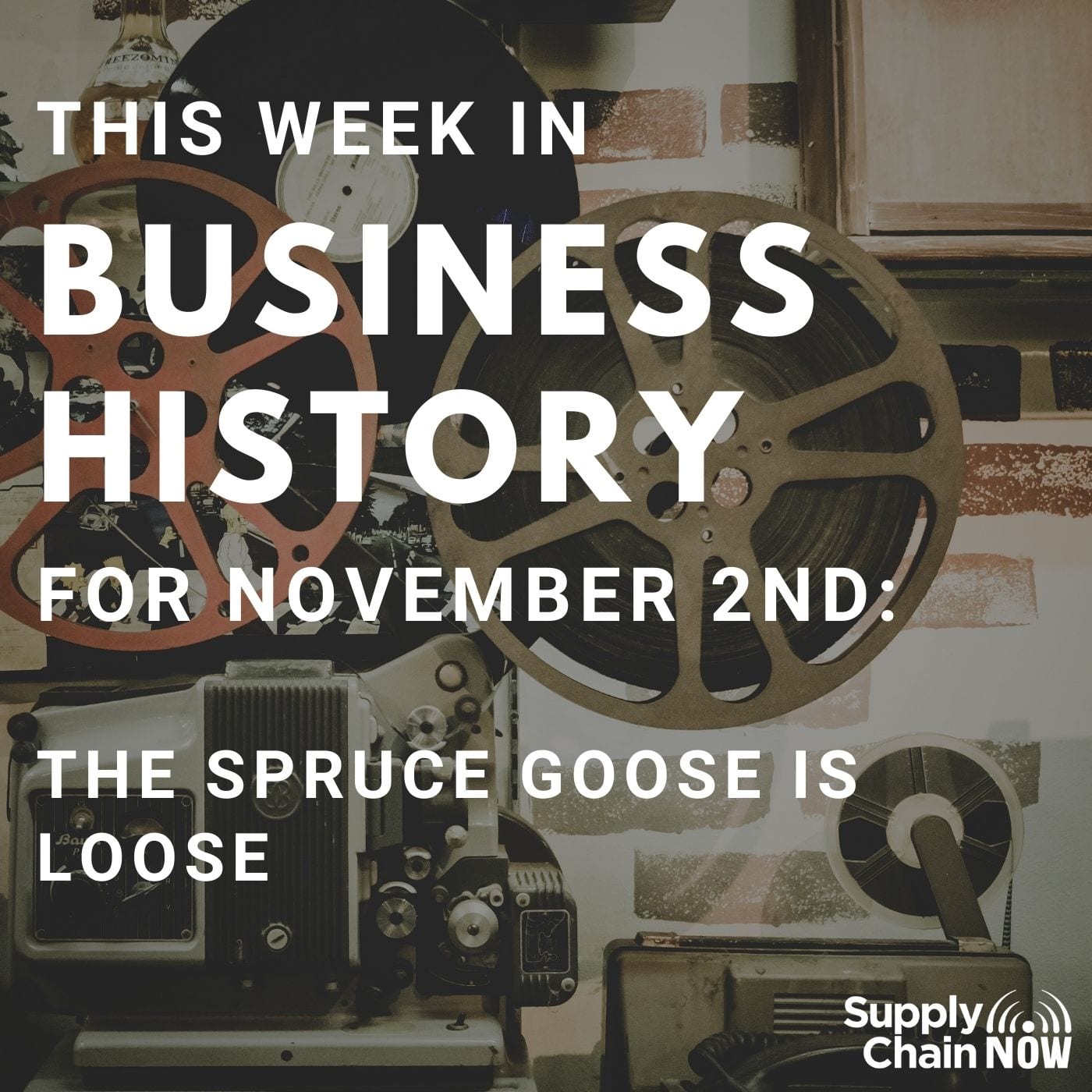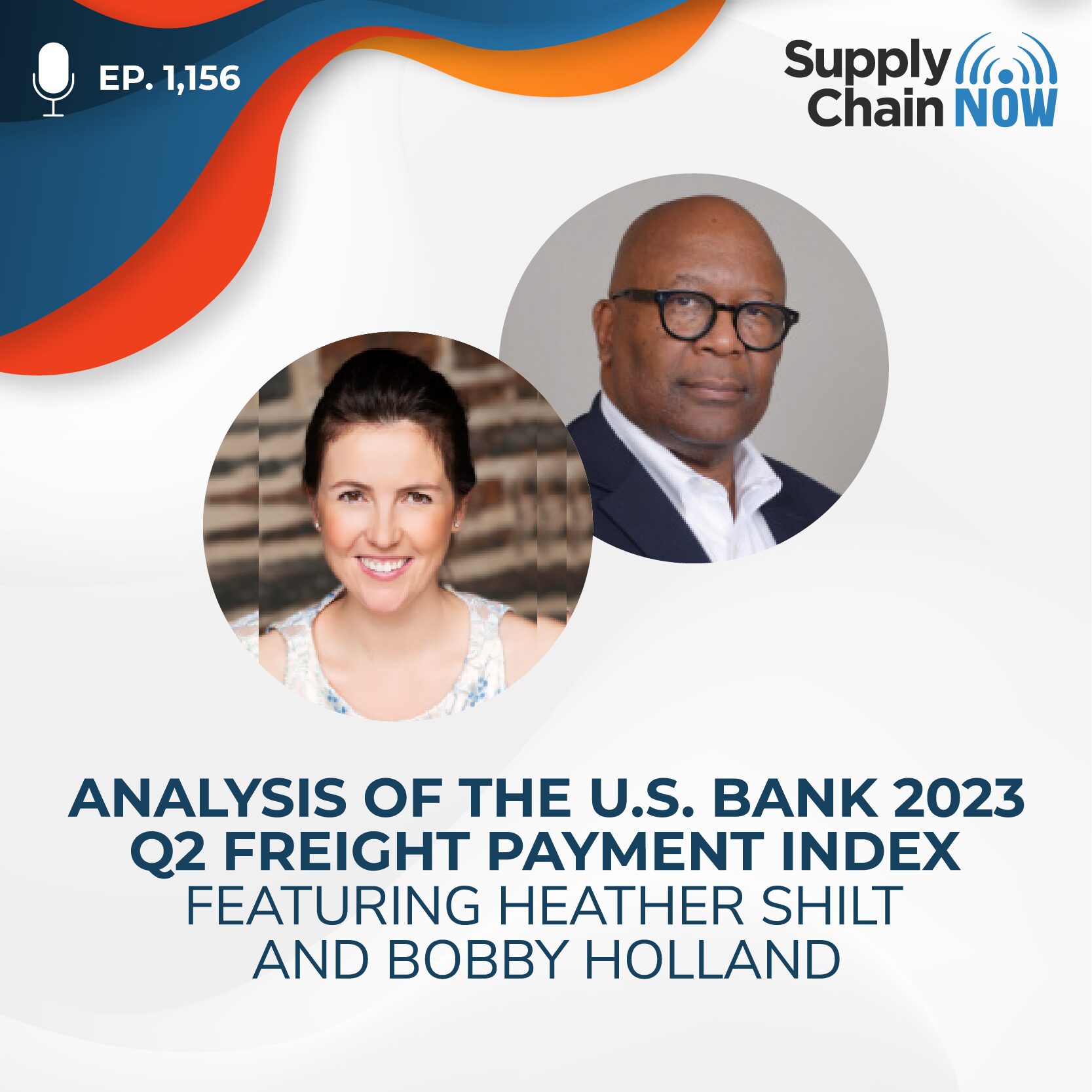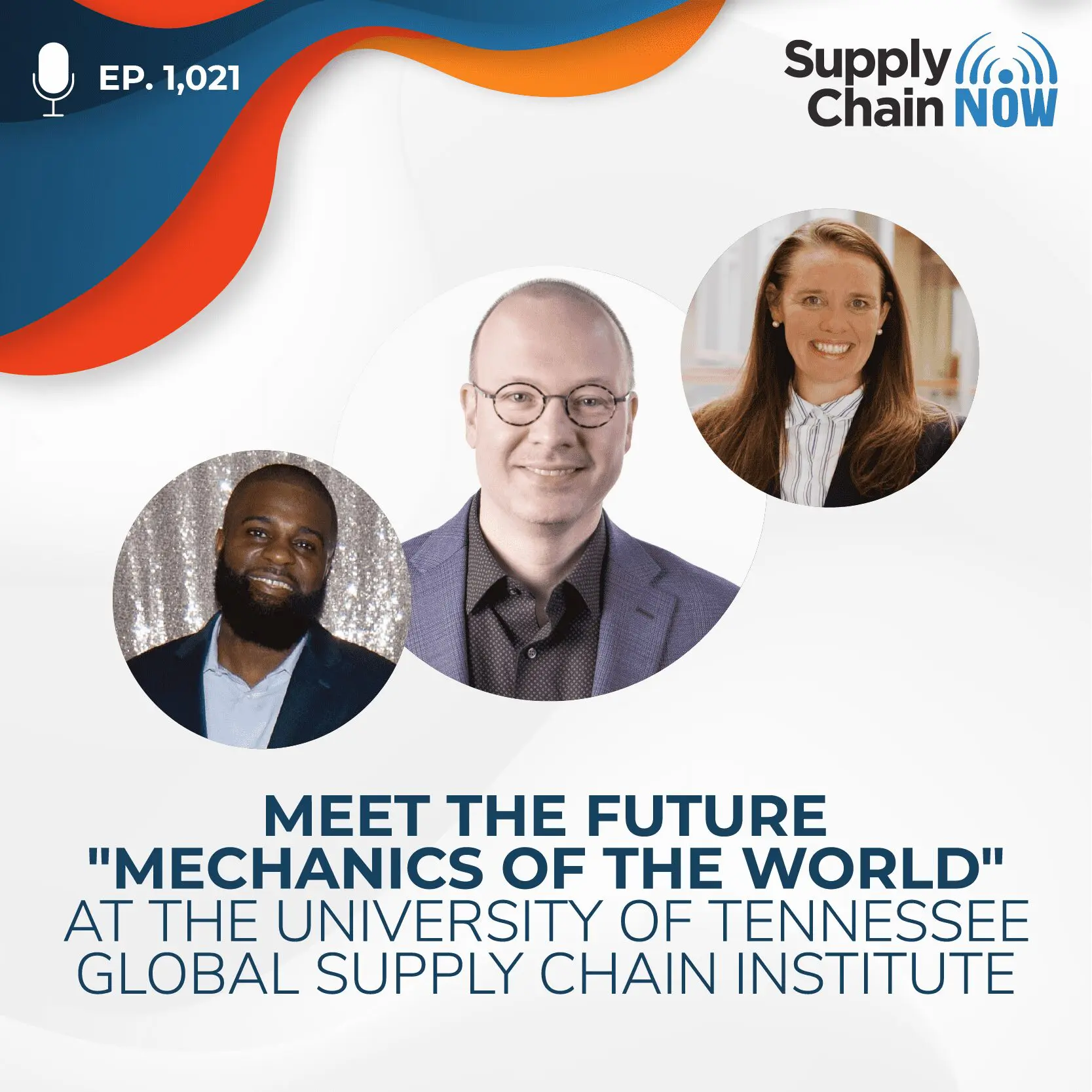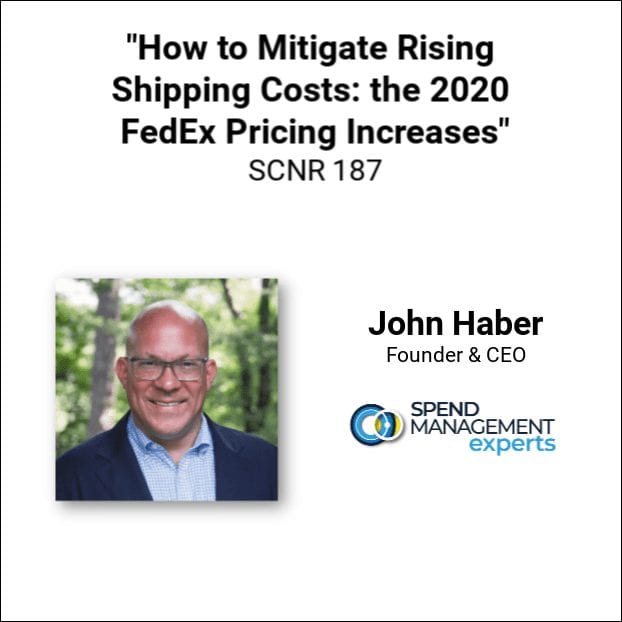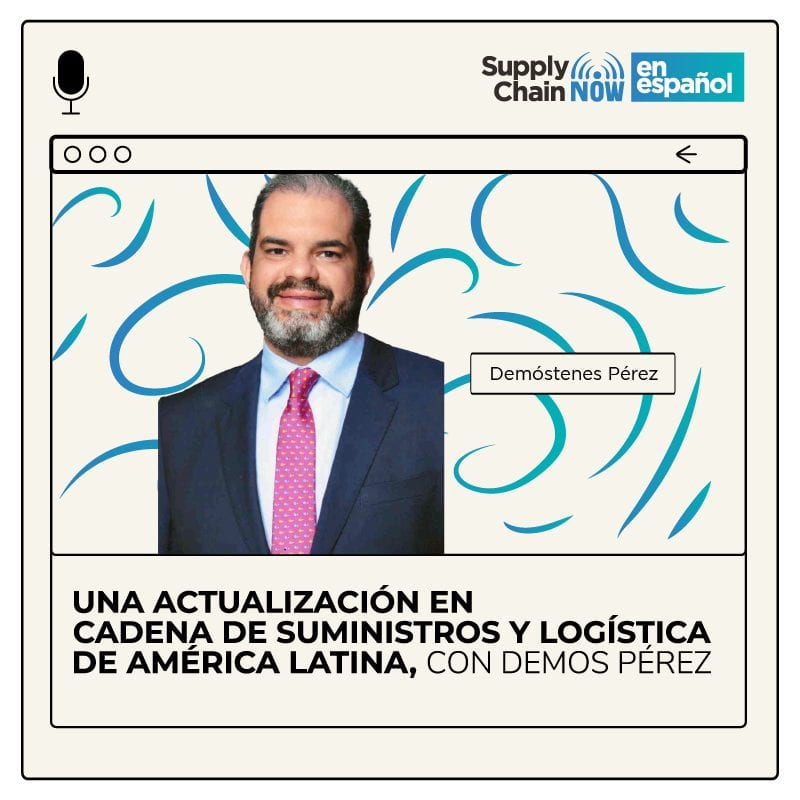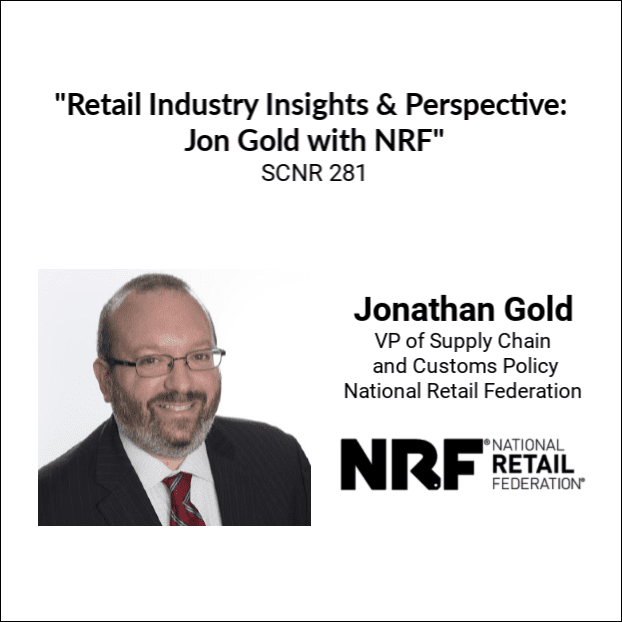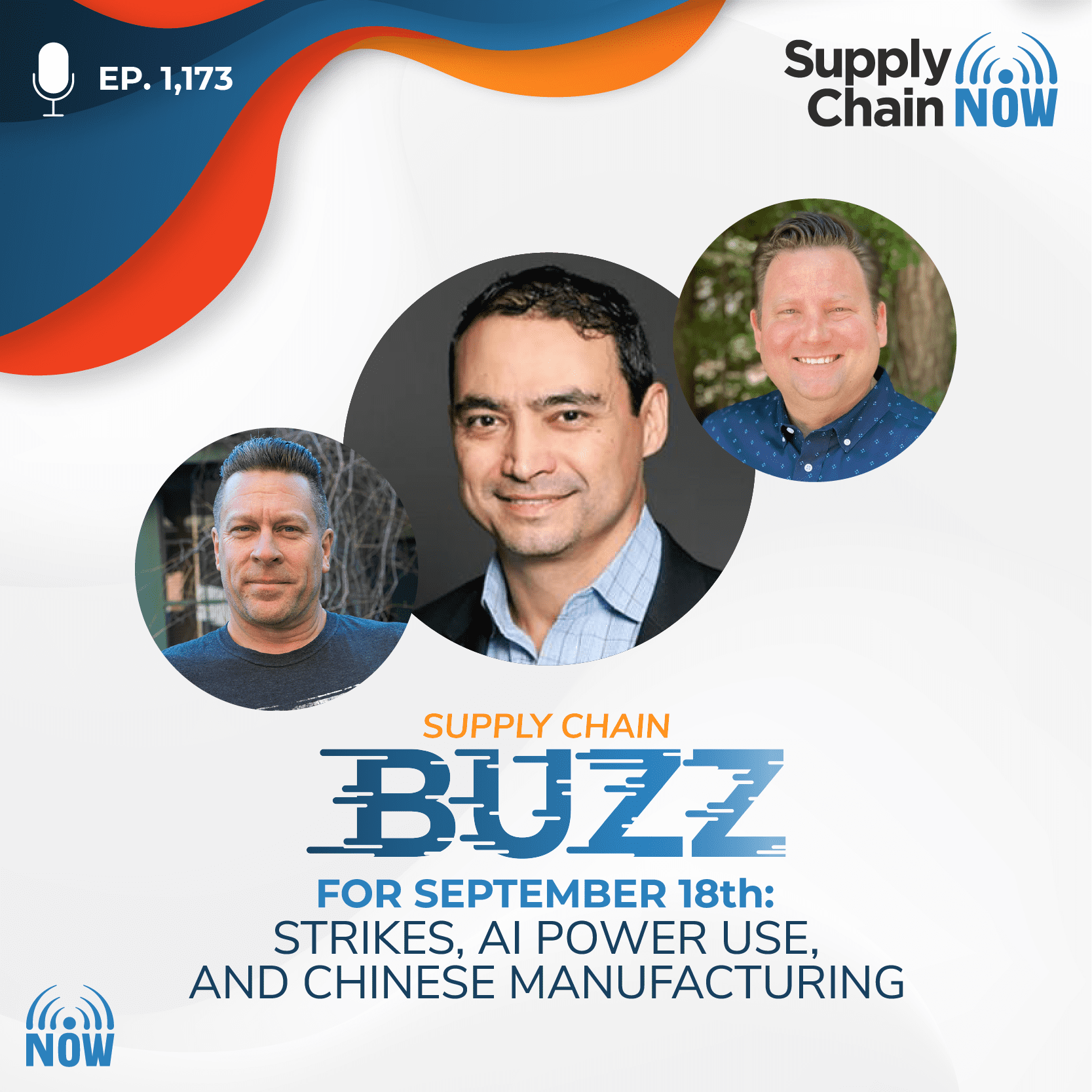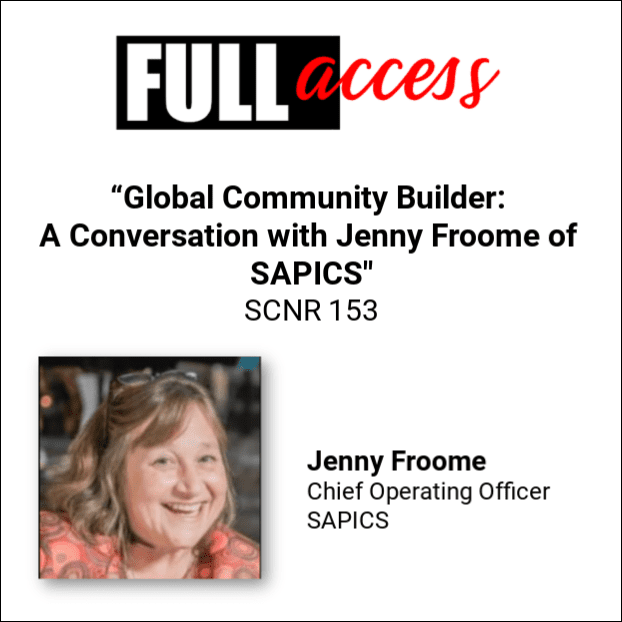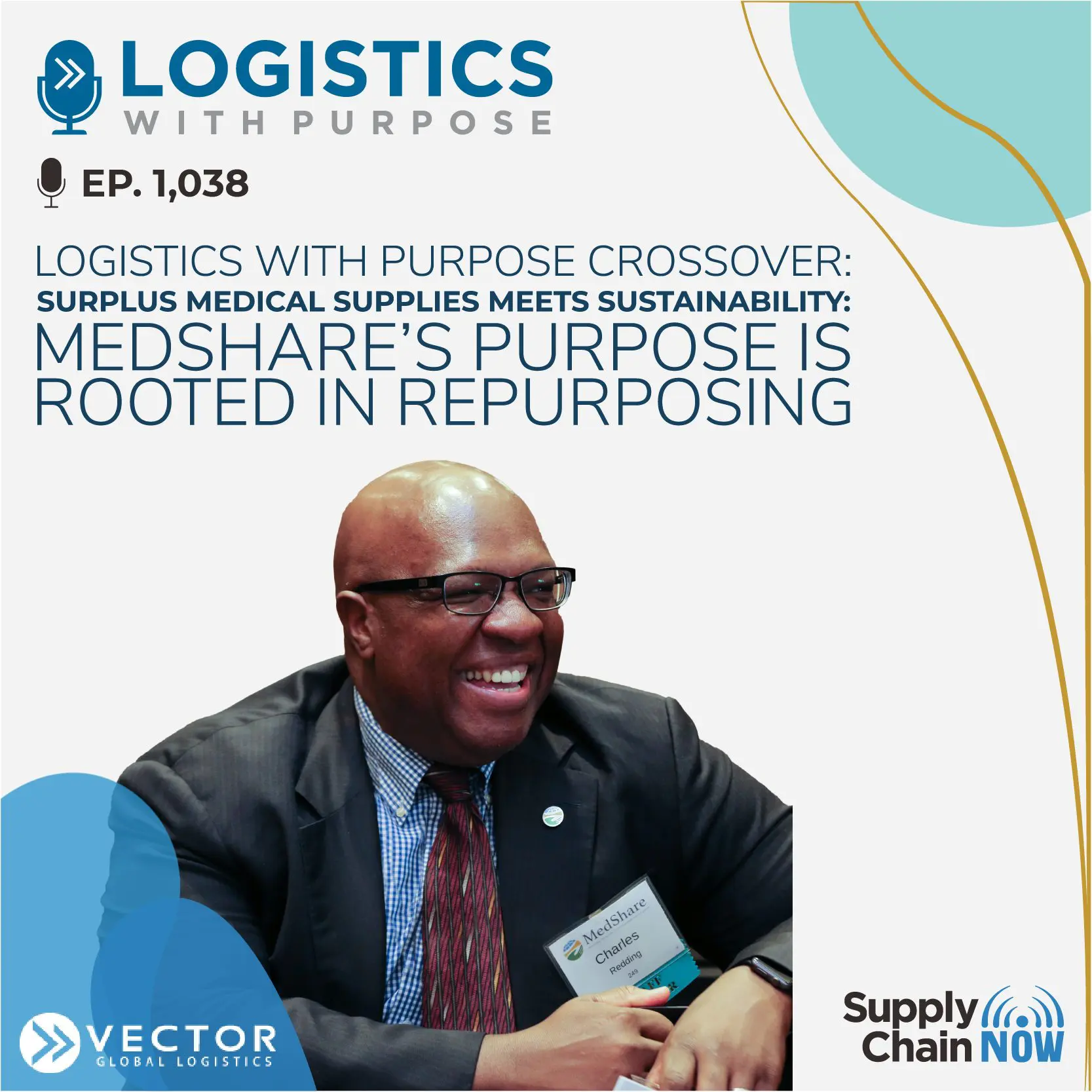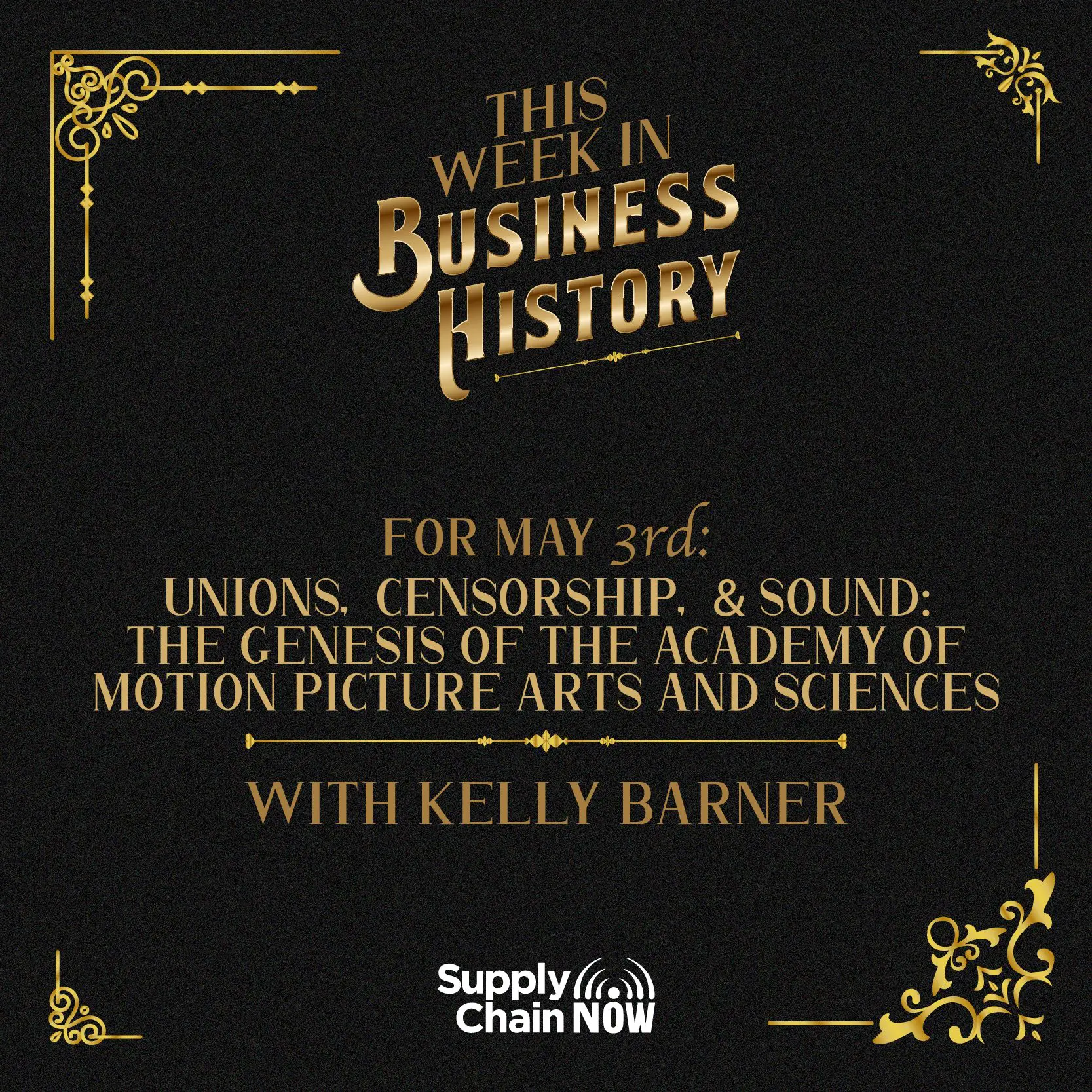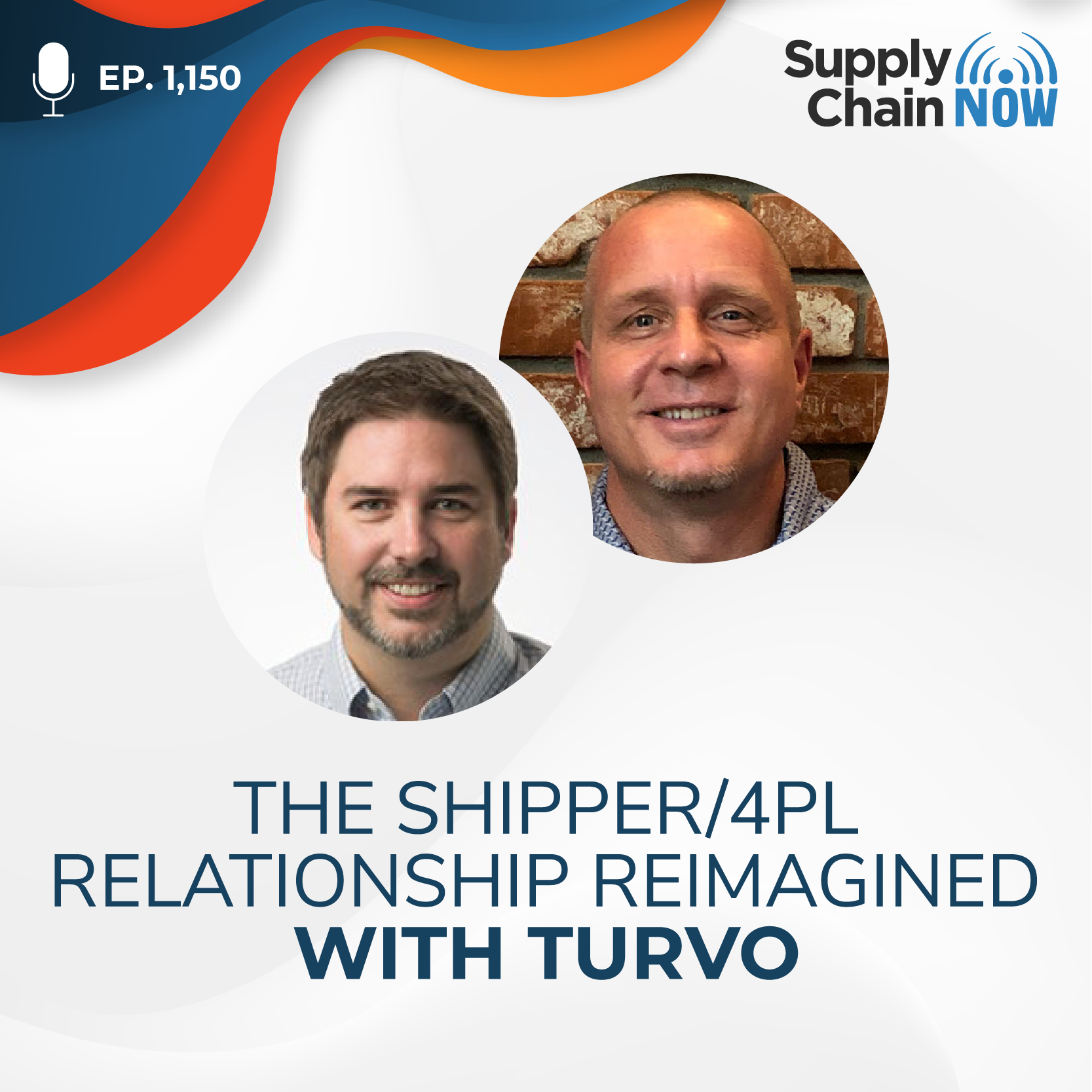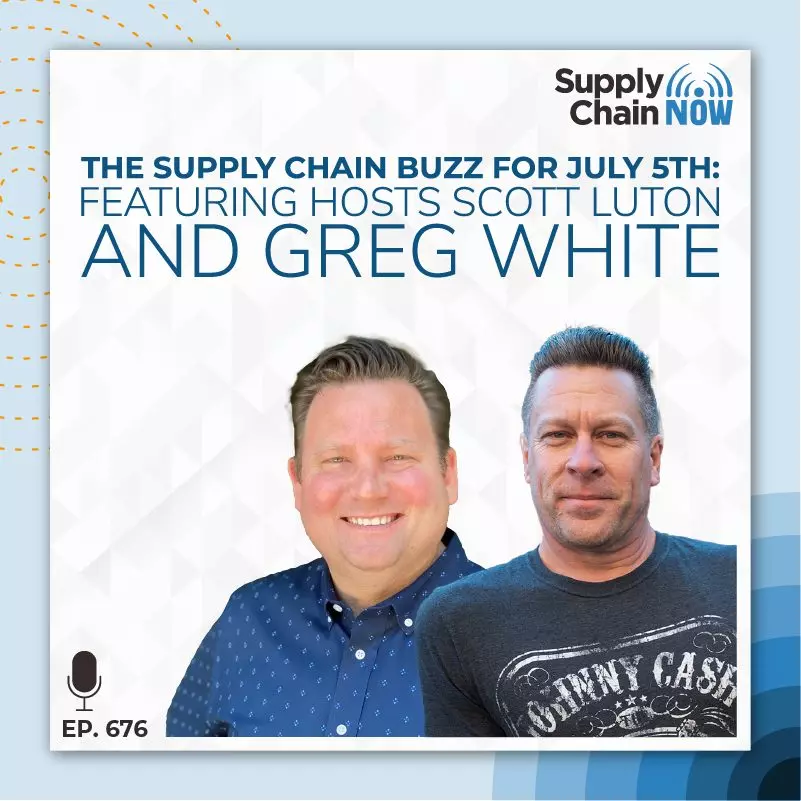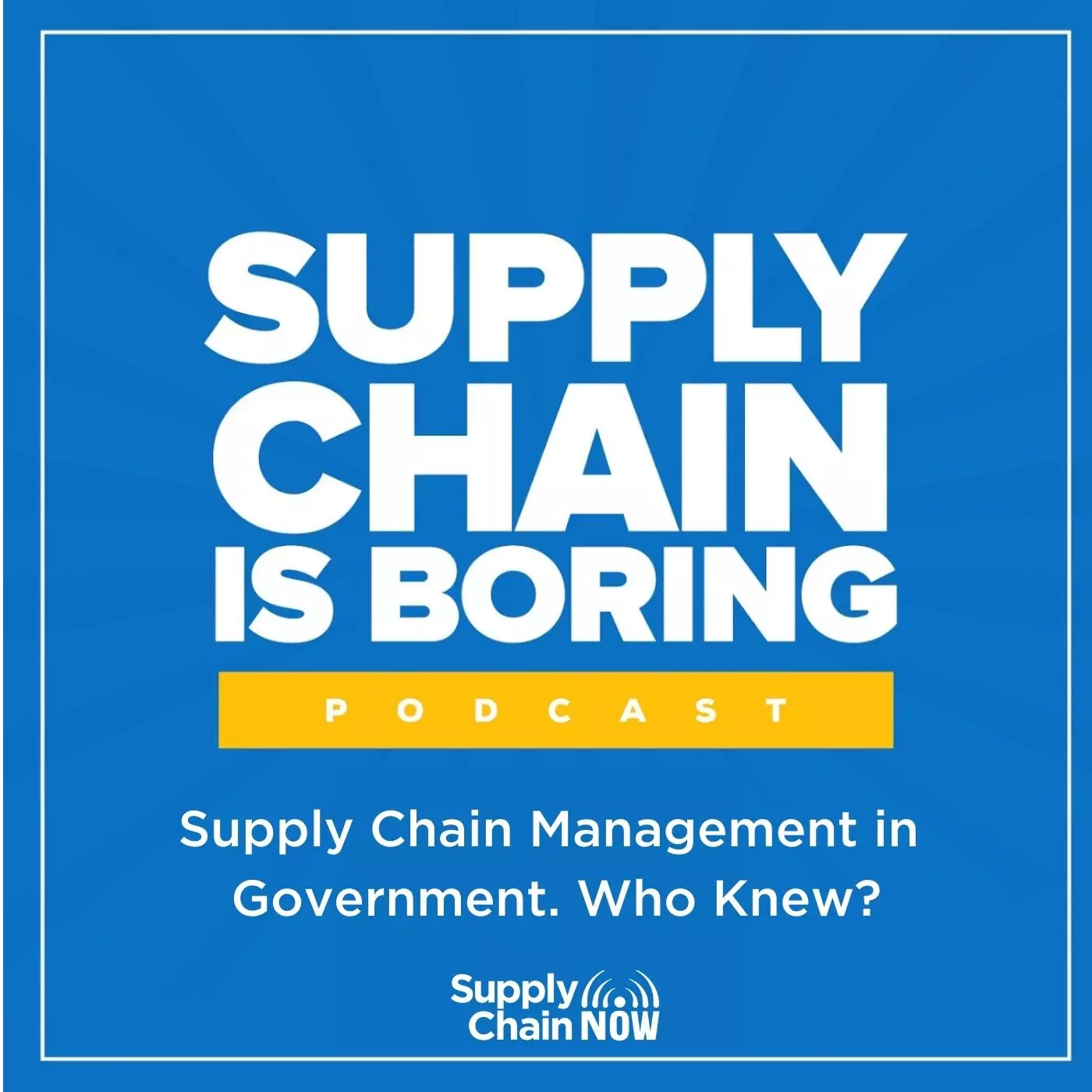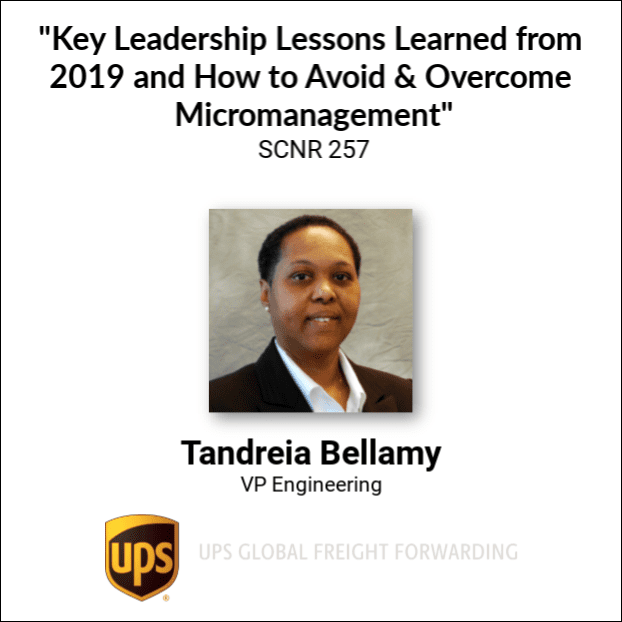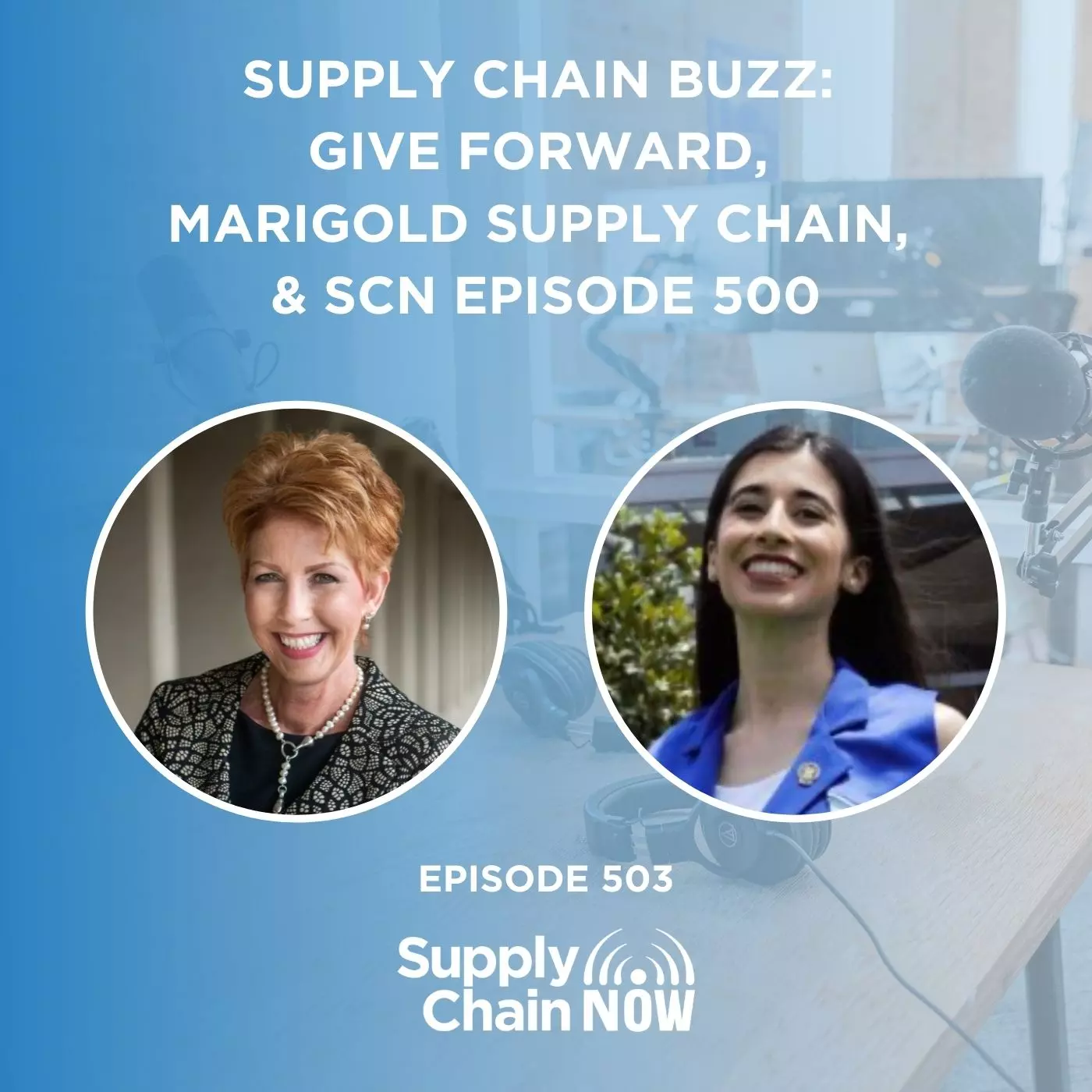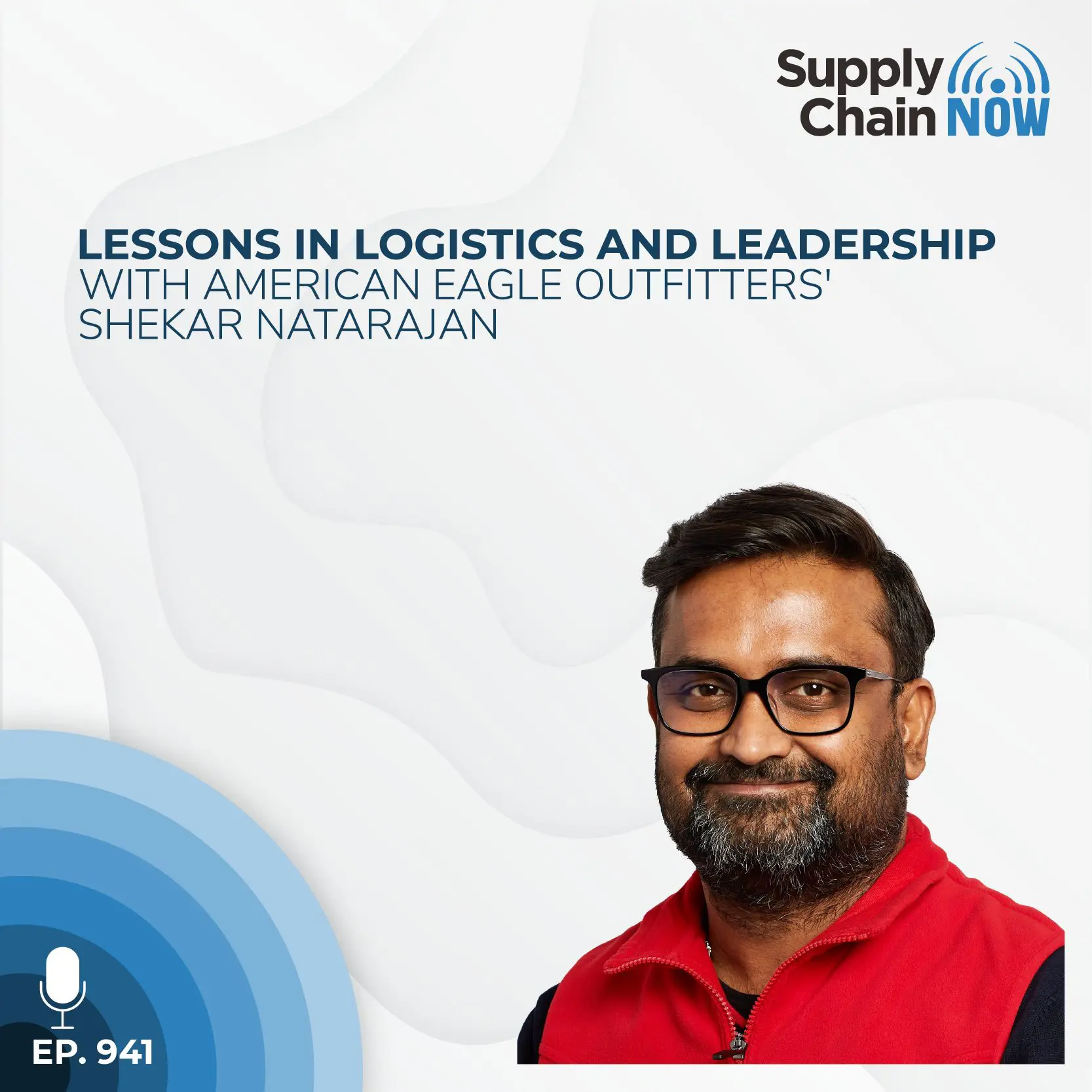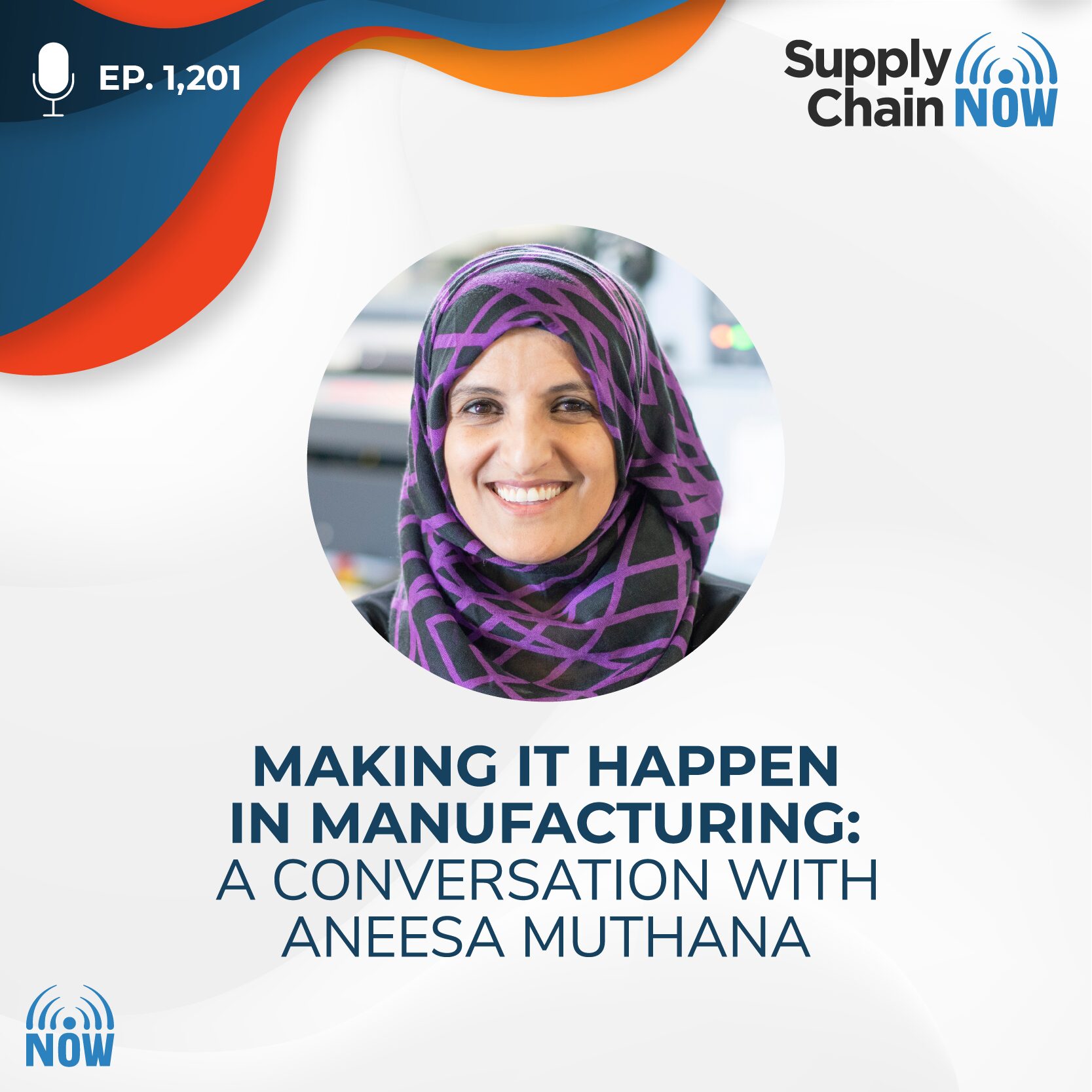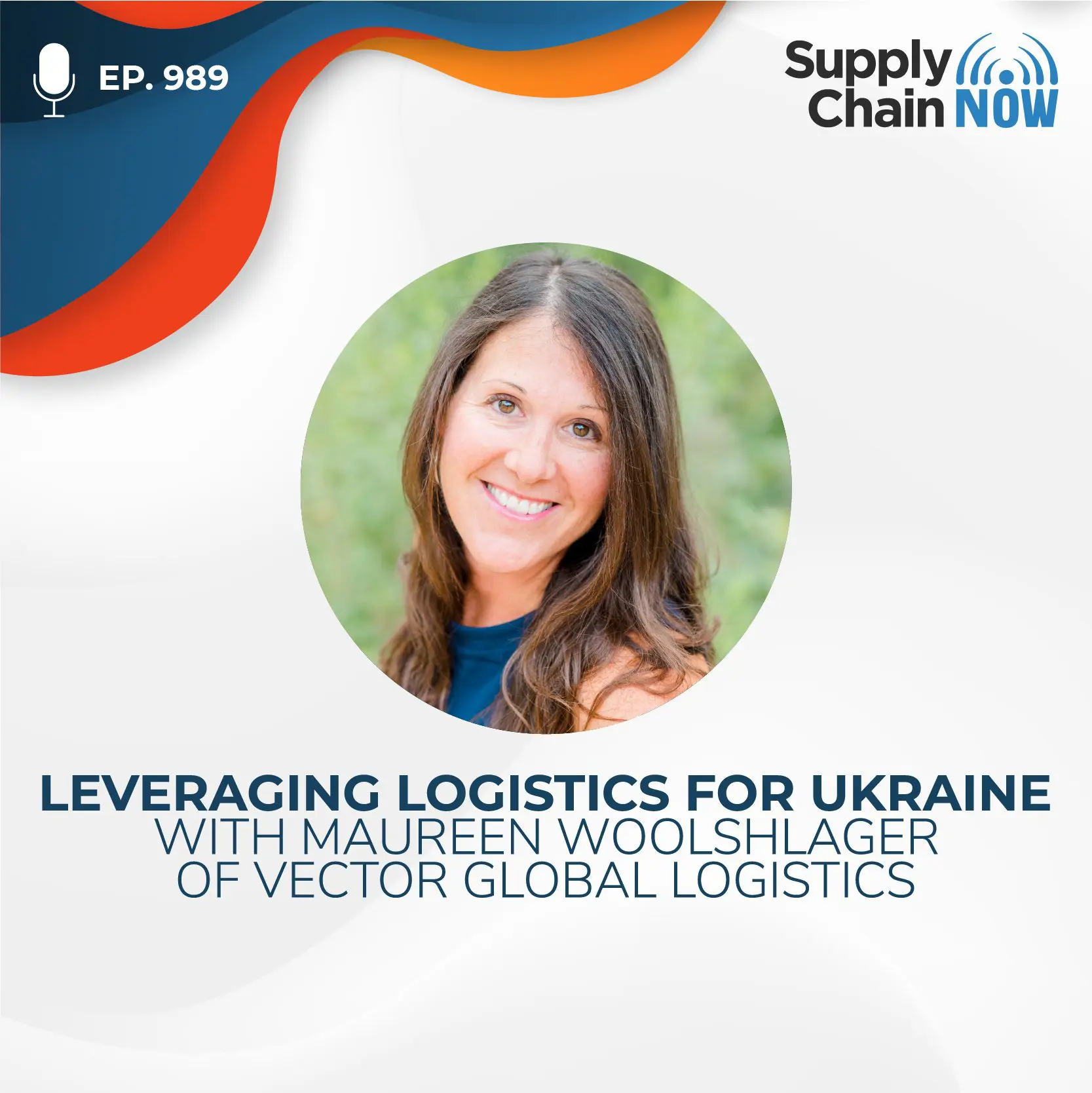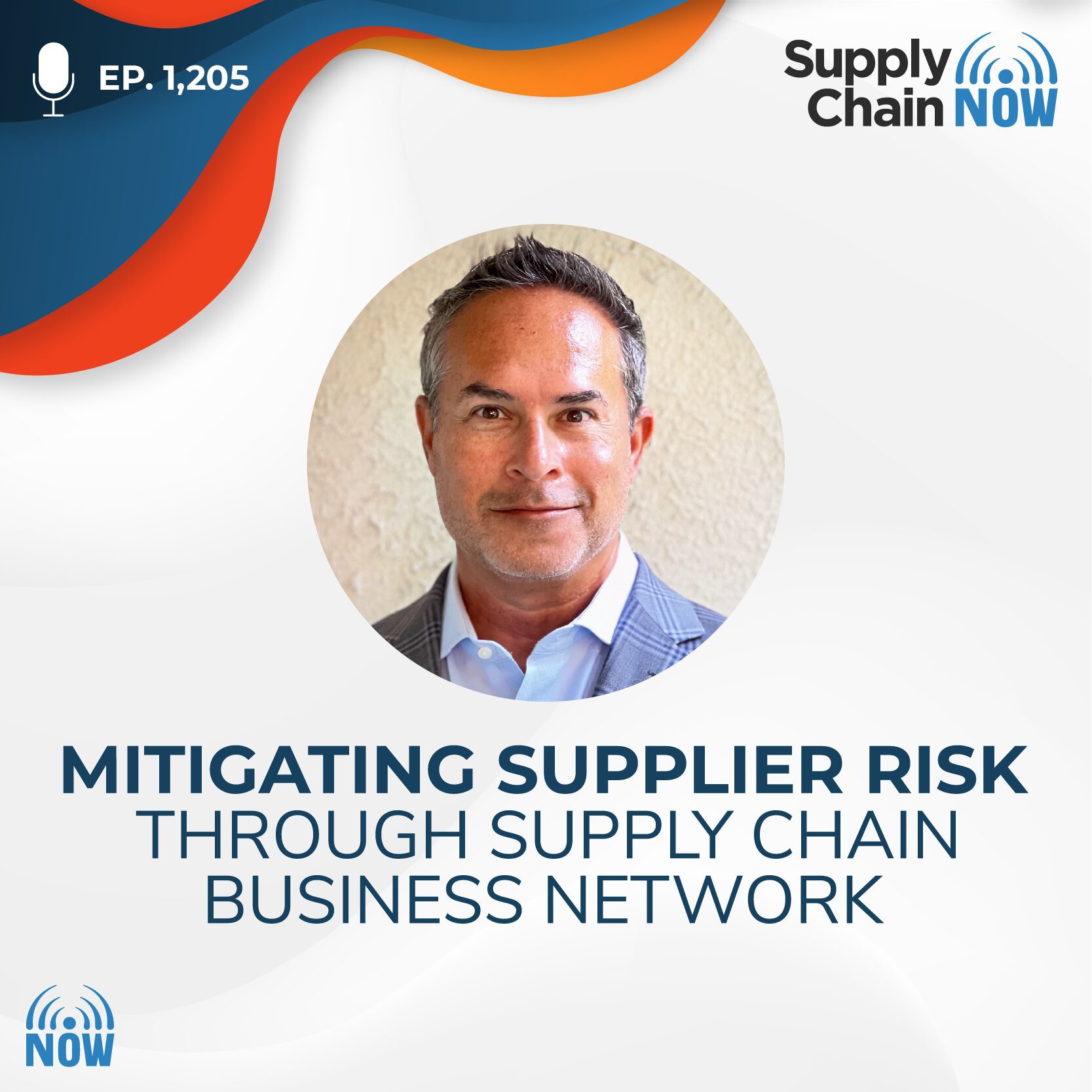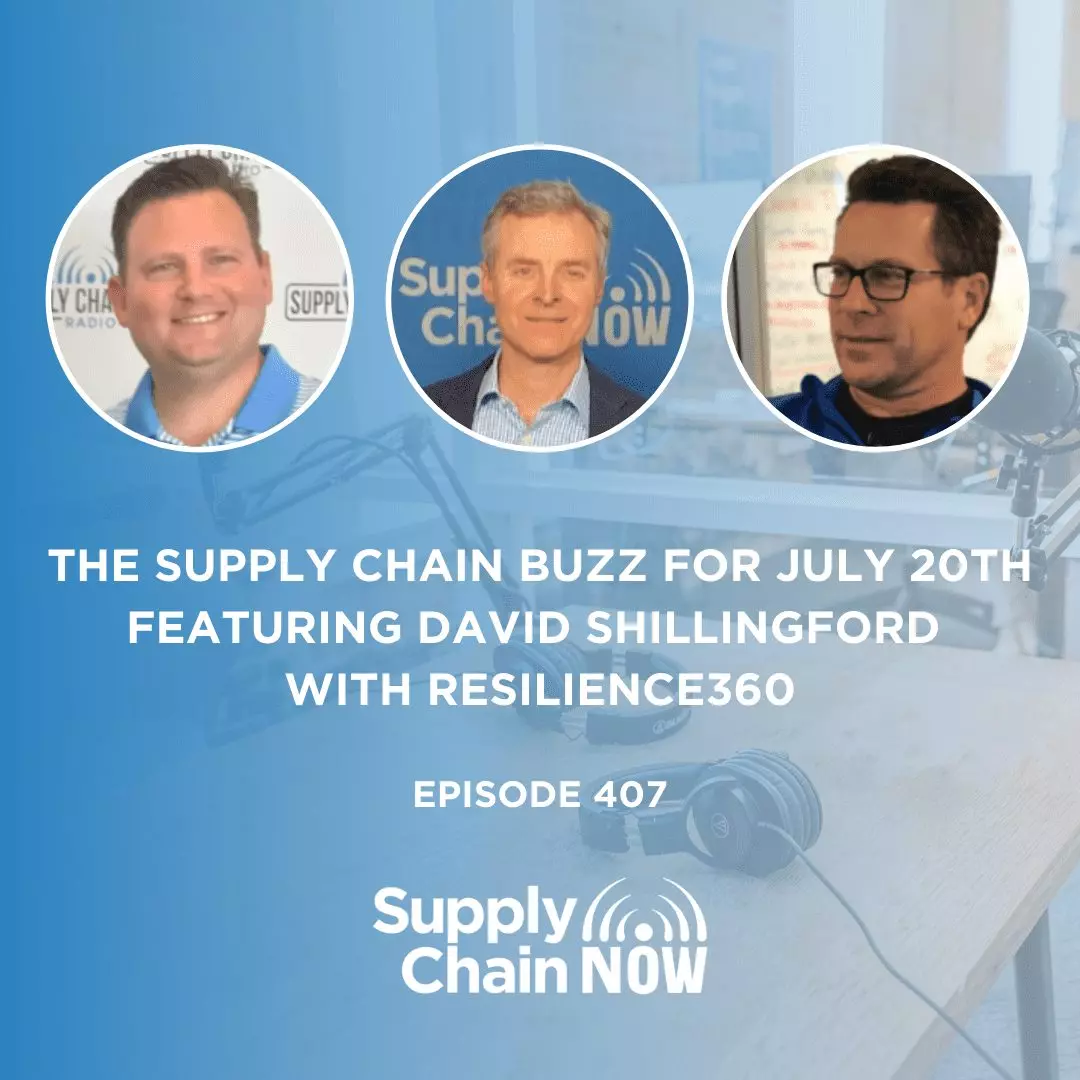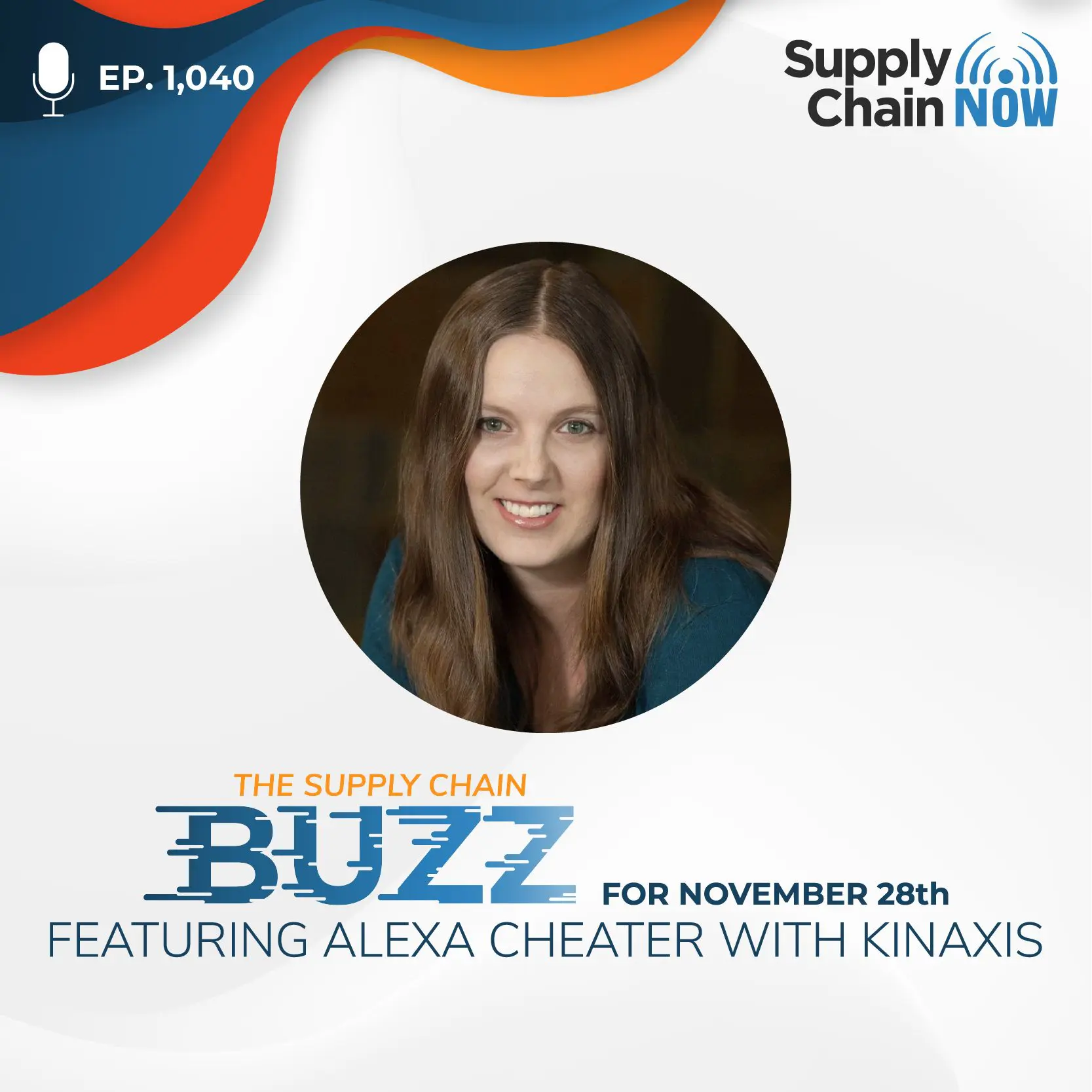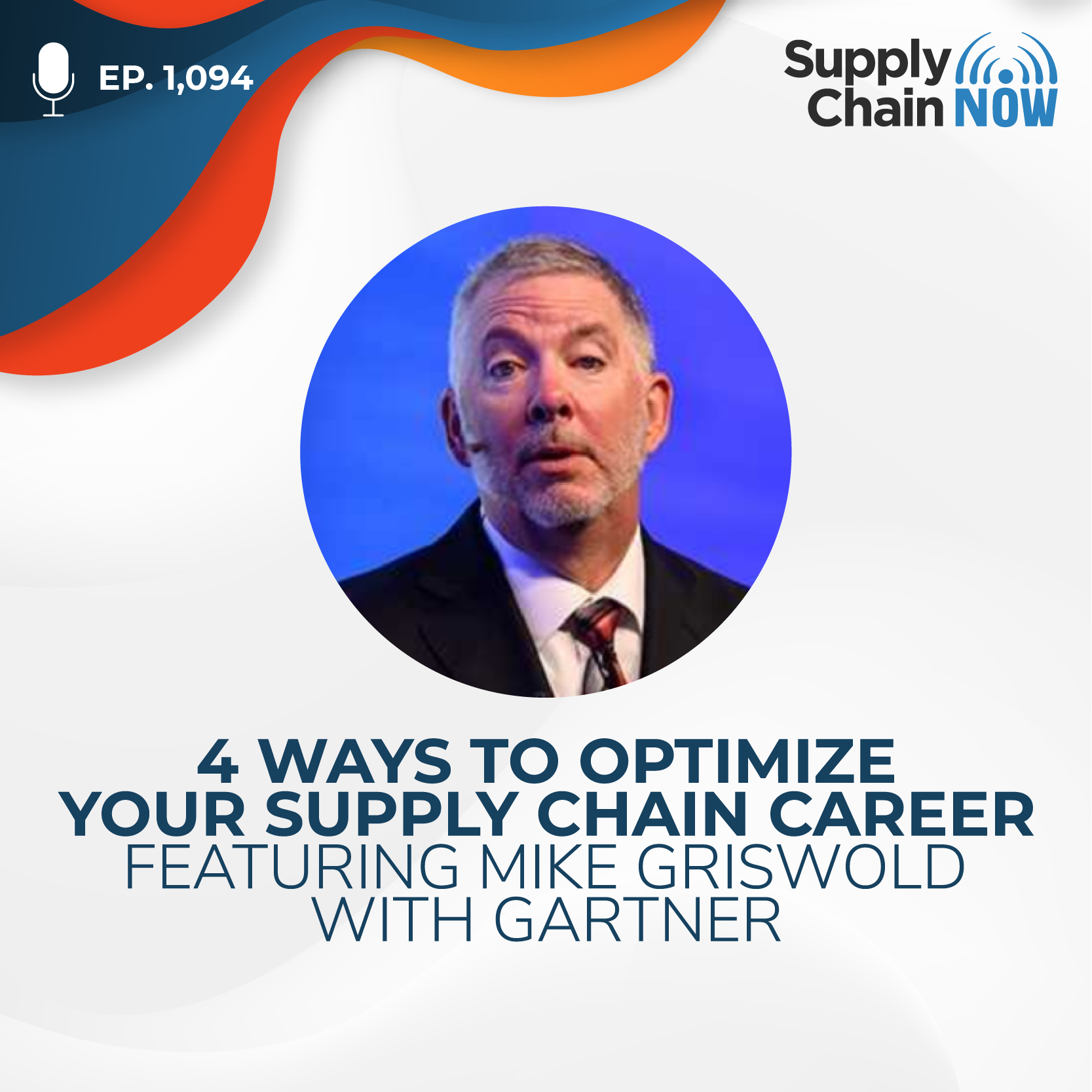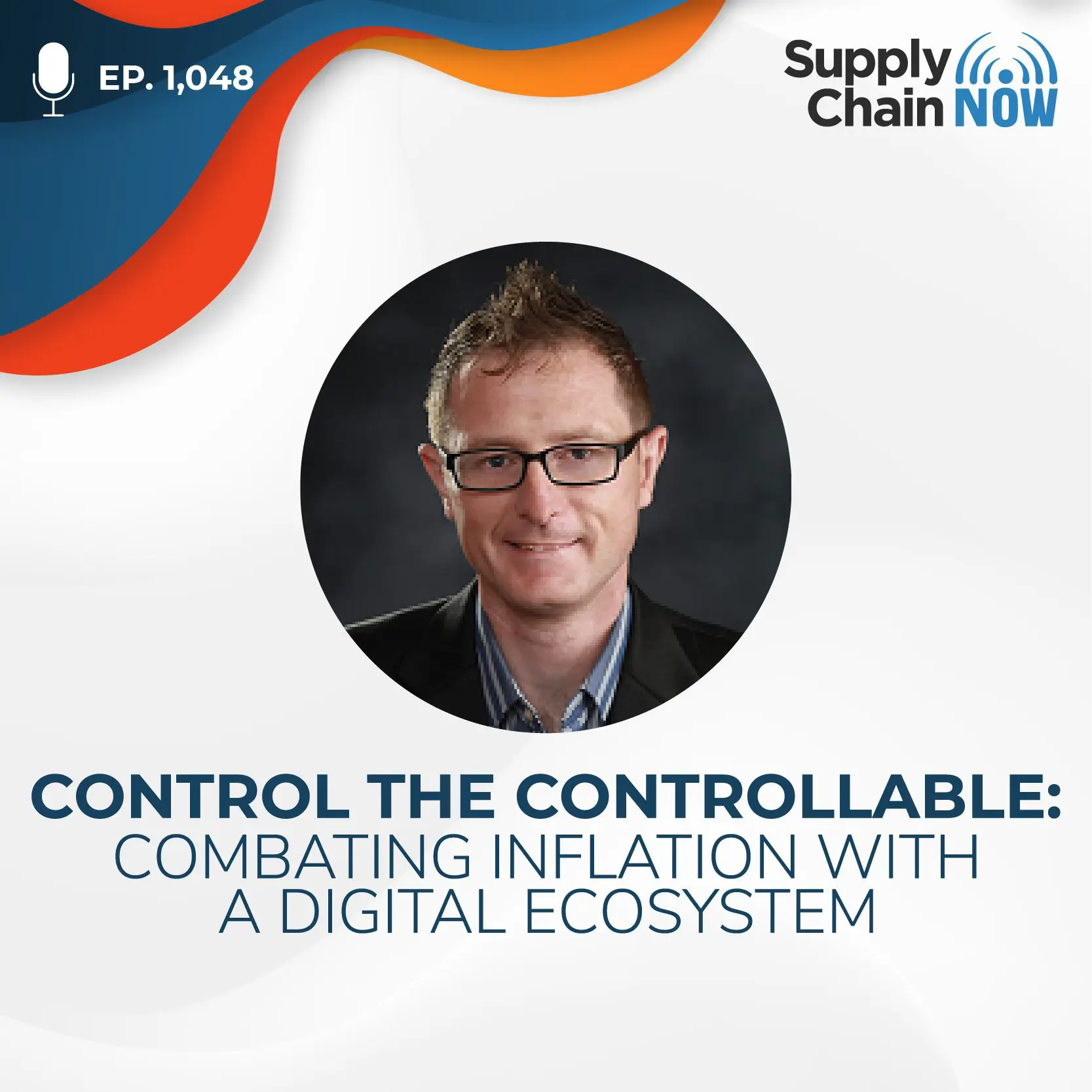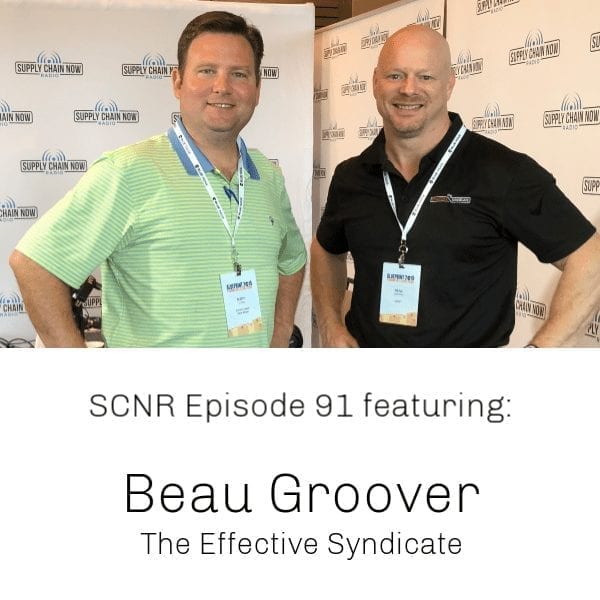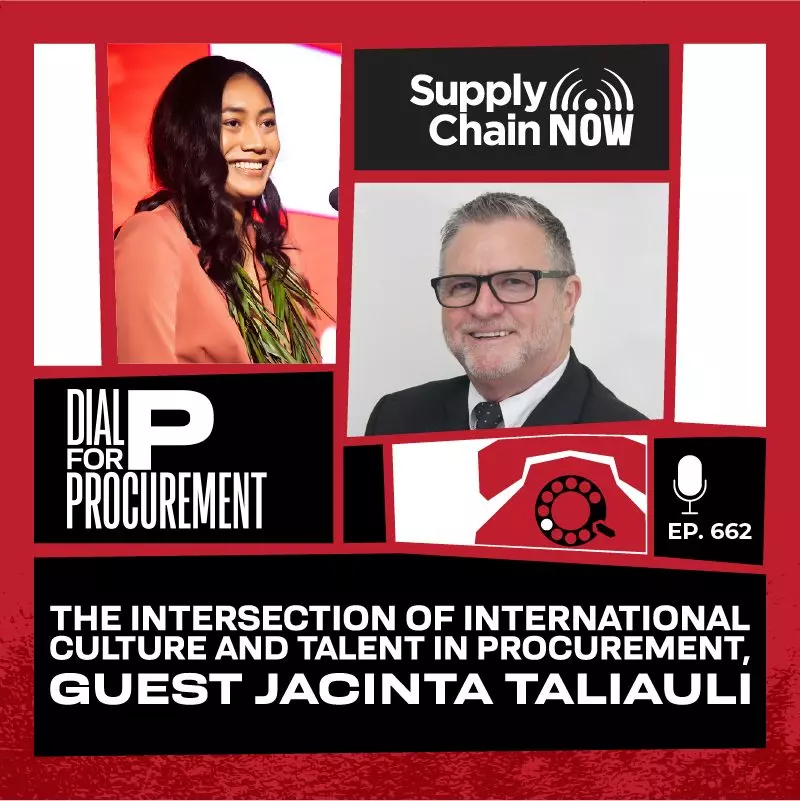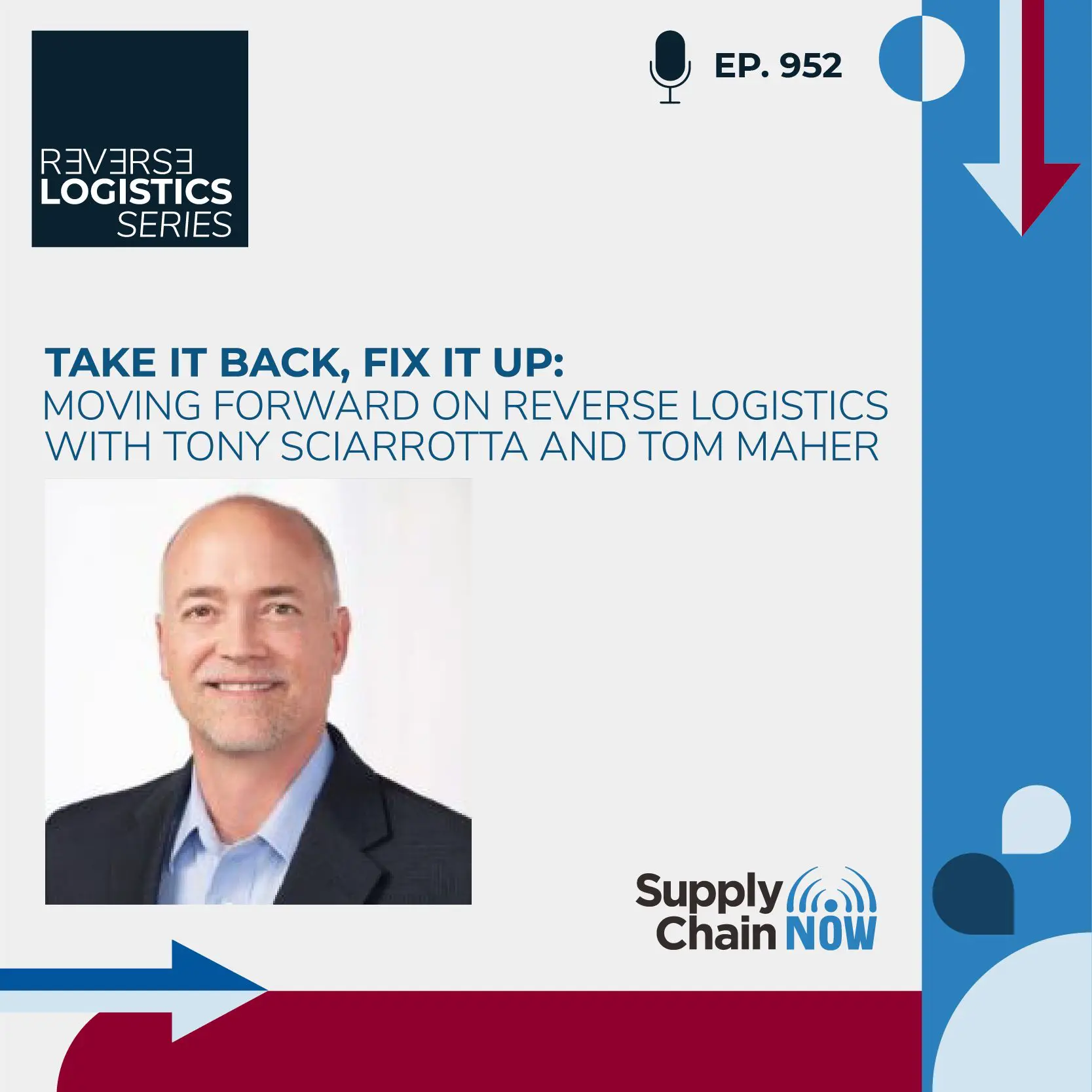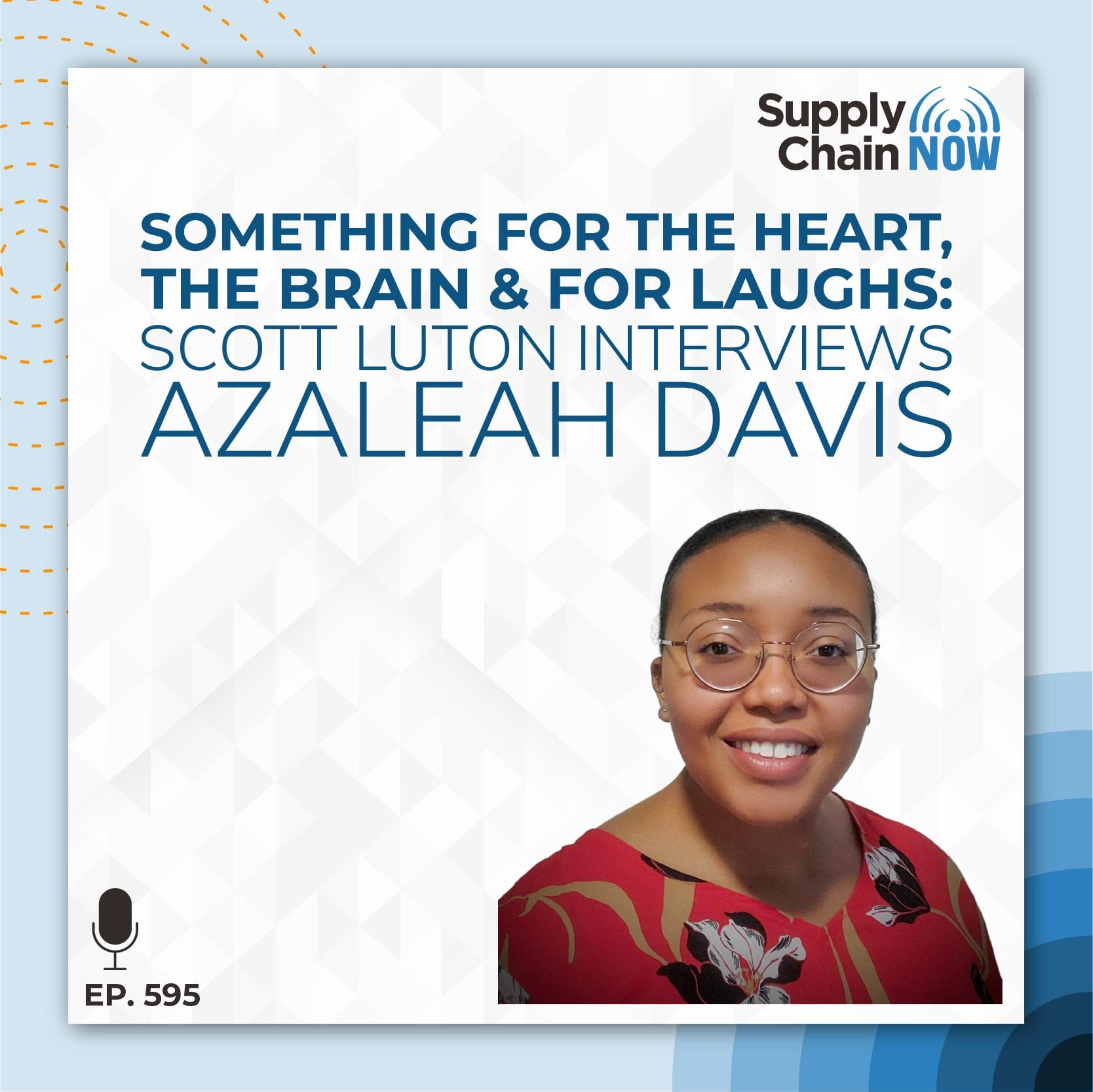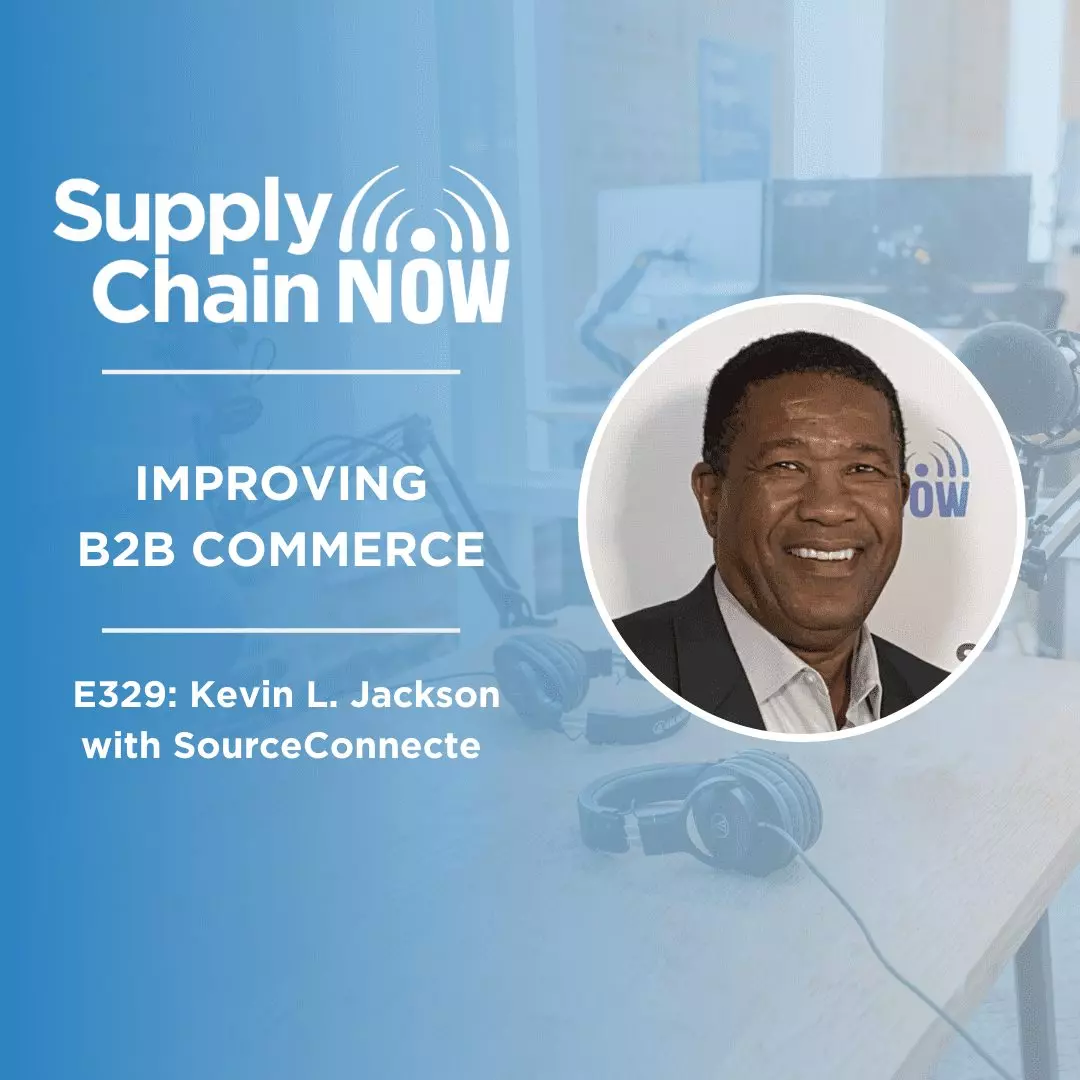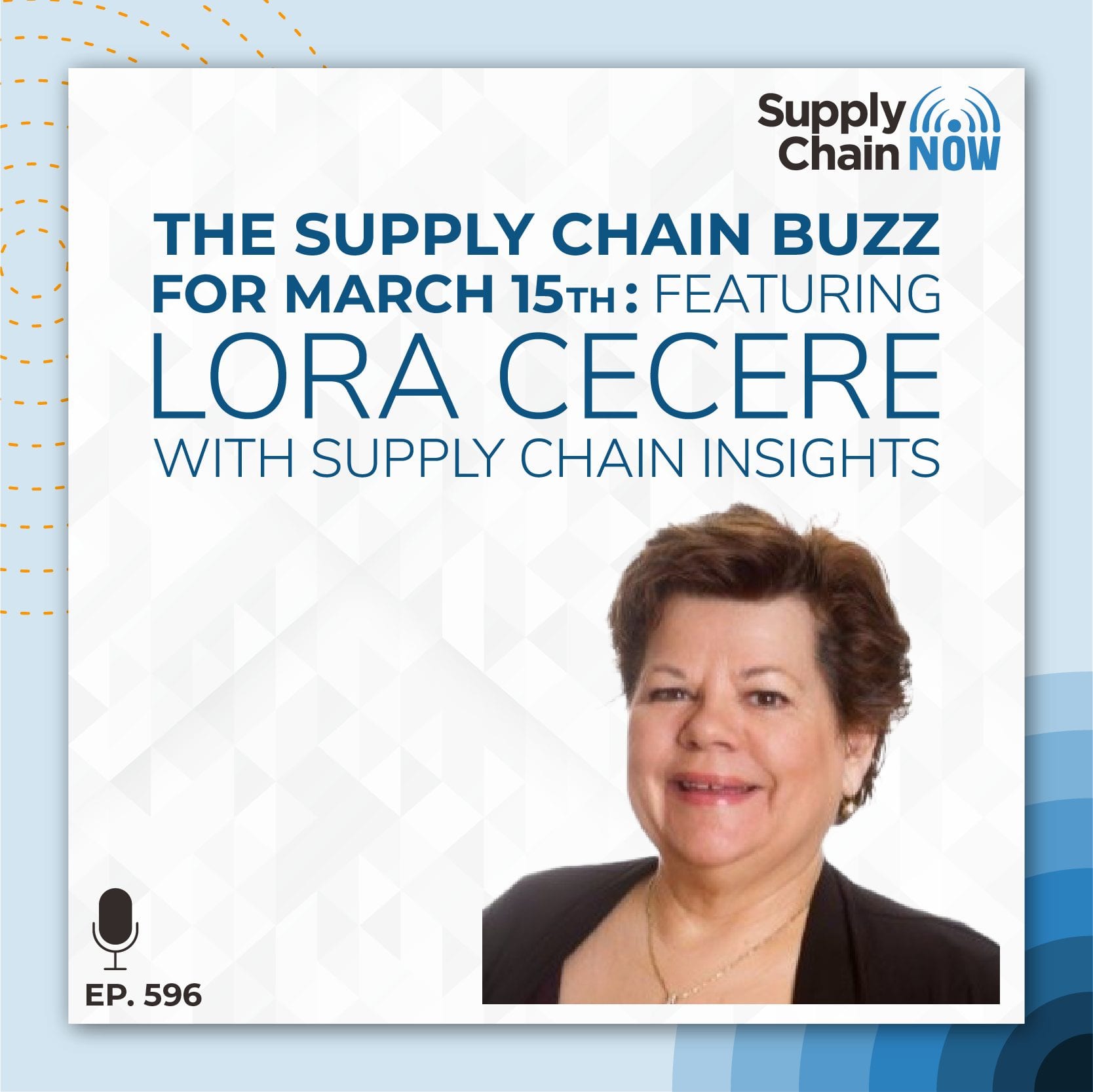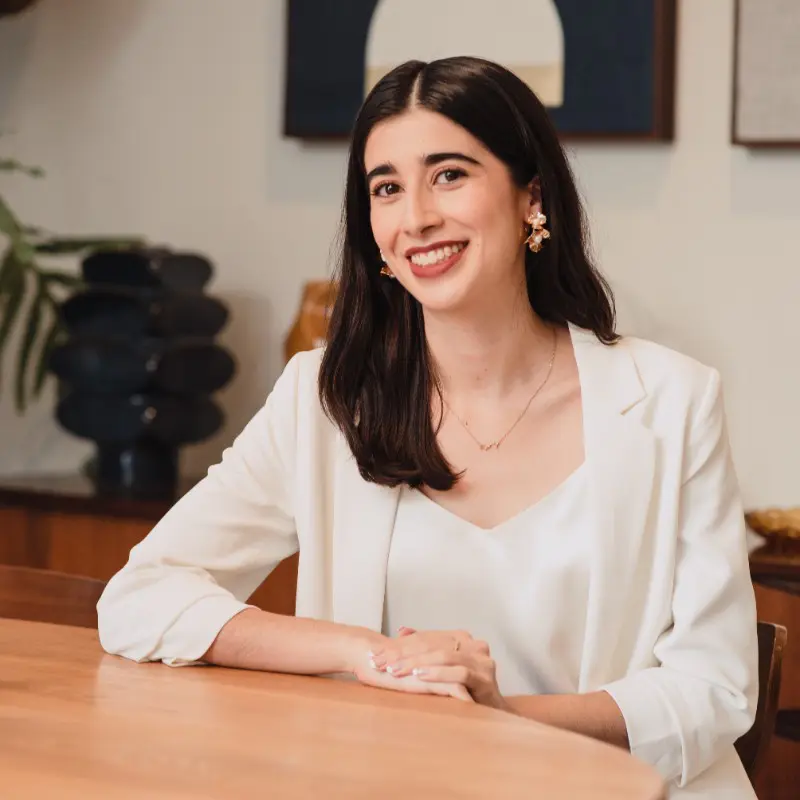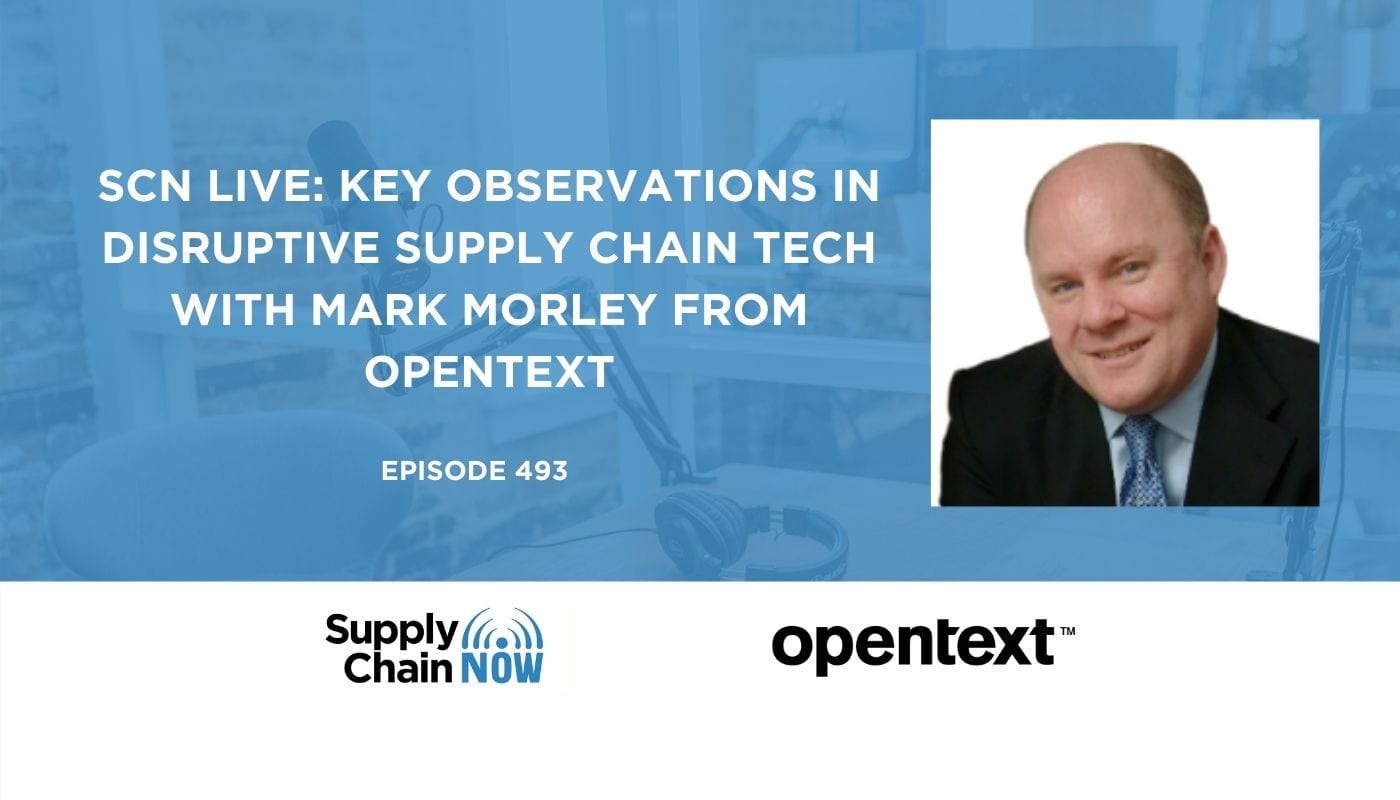
Episode Summary
“All of these new technologies – whether it’s AI, IOT, blockchain, augmented reality, etc. – we’re talking about potentially getting the next generation of supply chain leaders interested in supply chain.”
”Mark Morley, Product Marketing Director for Business Network from OpenText
Many supply chain professionals are enthusiastic about the potential of emerging technologies, but how do they need to come together to ensure the supply chain meets complicated business needs? AI, machine learning, IoT, and blockchain – each has unique strengths and a specific role to play in the cohesively designed digital supply chain.
Mark Morley is a ‘cloud integration evangelist’ with a strong background in manufacturing and emerging technologies. He has seen enough complex projects to be confident recommending an approach that emphasizes slow, careful progress.
In this conversation, Mark connects his vision for emerging technologies with the requirements of daily supply chain management with Supply Chain Now Co-hosts Greg White and Scott Luton:
· The importance of ensuring transactions, purchase orders, and invoices are transmitted electronically
· How the control tower concept may be changing in order to incorporate data that is not supply chain specific
· Why the first step for companies interested in the value of data and visibility is to digitize the supply chain itself.
Episode Transcript
Speaker 1 (00:00:05):
It’s time for supply chain. Now broadcasting live from the supply chain capital of the country. Atlanta, Georgia heard around the world, supply chain. Now spotlights the best in all things, supply chain, the people, the technologies, the best practices and the critical issues of the day. And now here are your hosts.
Scott Luton (00:00:40):
Hey, good morning, Scott Luton, Greg white with you here. Supply chain. Now welcome to today’s live stream. Hey Greg, we’re really excited about this, but first off, how are you doing? I’m doing very well. Thank you. Yeah. Uh, you know, today is my Instagram takeover day, whatever that is. So I’m filming everything. So whatever, whatever gets goes up on the, on our Instagram channel. Yes, you could be in it as well. So congratulations. I’m always looking forward to this. We get to talk about big brainy topics whenever we talked to Mark. So I’m excited. Yes, we’re. I am certainly punching over my weight class. Uh, this is, uh, this is a very sharp technology business leader that is driving big things globally with, uh, as we’d like to talk about one of the largest companies that, that some folks have never heard of OpenText. Uh, we really enjoyed, um, a great podcast episode.
Scott Luton (00:01:38):
We took a deep dive into kind of Mark’s background. He was, he was such a gamer. He played with our, uh, he, he went along with our lightning round. We’re gonna do a little bit of that here today. We’re going to pose some questions to our audience, and we’re really excited about this, this conversation on with Greg. We are, and I think around a million people probably know who OpenText is around a million more. Right. So depending on who has tuned in before, during and after our, uh, our last session, so we can add another million here, I’m with you. Well, before we do, let’s, uh, two things, we’re going to say hello to a few folks that are already, man. You know, we were worried cause they were way earlier. I know we’re going to call you out for being a part, uh, and bringing it as always.
Scott Luton (00:02:22):
So, uh, but if you enjoy today’s episode, be sure to find this and subscribe wherever you get your podcasts from. And of course send us some feedback. We’ve got that new tool on our website that allows you to, to share what’s on your mind. Take advantage of that. We might touch on that at the end of today’s live stream and subscribe. So you don’t miss a single conversation like that today. All right. So let’s say hello to a few folks that are here. Part of the stream, Sylvia, Sylvia, Judy is, is with us once again, a supply chain leader, entrepreneur, uh, Xtrordinair, uh, jam manufacturer, right in Charleston, South Carolina is right.
Greg White (00:03:00):
She is maintaining the jams supply chain supply chain jam.
Scott Luton (00:03:05):
Love it. Co-lead from Egypt via YouTube. Hey Claire, how are you doing great to see you there
Greg White (00:03:11):
Finally we’re on early enough, right? The people in Africa in the middle East and not all of them are in bed yet. Right? So there’s, some of them are probably even still at work. So that’s awesome. We’re working
Scott Luton (00:03:22):
On our earlier am programming for sure. Uh, Cynthia. Hey, good morning. Via LinkedIn. SIADH via LinkedIn as well. Hello. Good morning. Francoise. One of the last lab rooms. We had a friend SWAT heat, man. He, he really brought it a ton of perspective. So we’re expecting you set a high bar Francoise. We’re expecting you to, to meet that here today. Once again, Kayla via LinkedIn. Great to have you here. Kayla Russell. All right. It’s not a live stream without David, right?
Greg White (00:03:53):
Right. Yeah. And um, and I, I expect Dave and that you need to be reaching out to her FOD and waking him up and making sure he joins us in banter.
Scott Luton (00:04:04):
Right. Barbara Wade. Good morning, Barbara, via great to have you here. We’ll lead, uh, via LinkedIn as well. Great to have you Daria Bandari has really been bringing it great to have you here again. I think, I think he’s a, he’s a fellow of Metro Atlanta. And
Greg White (00:04:19):
Was that right, Greg? I recall that I think, uh, Francoise is as well, correct. He was in Norcross or Orangeville, something like that. Yep.
Scott Luton (00:04:30):
Uh, critique. Great to have you again, via LinkedIn. I think he was an active member of the procurement focus lives for, we had a week or so ago with the great folks over at Omnia partners. And Oh, one of our favorites, Jenny Froom, COO at st. Pics. They’ve got a great event coming up in November. She’s doing some wonderful things on, uh, throughout Africa and beyond in that supply chain community and great to have you there always Sylvia says I should start a go-to commercial.
Greg White (00:05:02):
Yeah, I think so. Seriously. We can, we can see it’s not, it’s not that tough of a drive from Charleston to Atlanta. We’ve done it so we can verify. Absolutely.
Scott Luton (00:05:13):
All right. So many folks won’t say hello to, uh, adult Berto, Alberto from Brazil. I think I got that right. I apologize if I didn’t. Okay. Thank you, Greg. Um, but to know via LinkedIn, great to have you there outstanding country. In fact, we’ve got a show coming up tomorrow where we’re gonna be talking a lot more about South America, Greg, between your background and Marshall wave’s background. A lot of things international in the episode tomorrow. Okay. And one last, hello, Sophia Reavis Herrera, who has an upcoming TEDx, I think it’s a few months away, but um, Sophia does wonderful, uh, perspective analysis. You name it and everybody be on your best
Greg White (00:05:58):
Behavior because she is re recording this for posterity.
Scott Luton (00:06:04):
All right. So thank you all. And even those that we, those that we couldn’t get to. Thanks so much for joining us here today. You’re in, you know, you’ve got a great, uh, treat coming up with our guests. We want you all to as active as you are on the front end, keep it right there because we want to hear your feedback and your input questions, comments throughout on really disruptive supply chain tech. That’s the whole focus here today. Really focusing in on IOT, AI and blockchain and in particular, that’s why you’re here in particular, Greg, how Mark and OpenText teams working with companies to leverage all those together and the confluence. If you remember that, when I, when I was prepping for this call, if you remember three rivers, stadium, Pittsburgh pirates, it was only at the confluence of three rivers and I, I can’t name them all, but that’s, uh, that’s what I thought of as we’ve talked about how they’re using these technologies, not one off, but in a consolidated, integrated manner to really help companies thrive during these challenging times. So we’re going to dive into that.
Greg White (00:07:06):
Yeah. I think we also need to challenge someone from Ohio to Pennsylvania, Pennsylvania, sorry. Yeah. The name those I know the Monongahela is one. Yes. Well, last I checked. I checked this morning.
Scott Luton (00:07:23):
Pittsburgh is still in Pennsylvania. I maybe
Greg White (00:07:25):
That’s changed with the constant moving of the, of the planets.
Scott Luton (00:07:32):
That’s right. Hey, one more person to say lo to our friend Mike Darden, who a thought leader in the freight space, the digital freight space, for sure. So Mike, great to have you here enjoyed your episode with us a month or two ago. All right. So let’s welcome in Mark Morley, product marketing director for business network and open text. Hey, good morning, Mark. How are you doing
Greg White (00:07:57):
Morning guys. Thanks. Ben. Allow me to be on our show again. Yeah, of course. It’s what time there is a nearly 3:00 PM in the afternoon. So we’re winding up and you’re winding down. I’ve done that which way I prefer, but you’re closer to a cold brew. So exactly.
Scott Luton (00:08:19):
So the dog is finishing out. So Mark, we, we, we tackle only the hardest hitting subjects of the day, including the three rivers that, uh, that the, the stadium was on dog says Allegheny and Monica Haleigh. Yes. Was other two rivers. So thank you for saving, saving us, their dog. All right. So Greg, um, we really enjoyed the episode we had with Mark, uh, episode four 49. And I think Amanda and Claire are gonna drop those in the comments in case folks that weren’t able to check that out. We’ll take a deep dive in the Mark’s background and really get to know him as well as dive deeper on some of the, some of his observations in this crazy year. That is 2020, the day’s conversation though. We’re going to focus specifically on those three technologies that we’ve mentioned and specifically how, what he’s seeing, how those, uh, in an integrated fashion they’re leveraging those. But Greg, we want to kind of throw a question out to the audience before we get, start with Mark, right?
Mark Morley (00:09:17):
Yeah. So everyone here is really, really smart. Um, and a lot of people working in varying areas of the supply chain. So I think what we’re curious about is who is, uh, or has started to experience working with IOT or blockchain, uh, AI, and, and drop that in the comments, how you’re using it, uh, or maybe even how you see it could be used in your environment. And, uh, we’ll, we’ll put that to Mark. Let’s see if we can stump the expert here.
Scott Luton (00:09:55):
That’s like what a great challenge, but, but you know, Greg you’re right. Hey, let us know, let us know what you’re seeing and how you’re using it. So drop that in comments. We’ll pose that to Mark. Great way to start, Greg. I love that idea. All right. So Mark star on the show here, let’s let’s for folks that may have missed that episode four 49, uh, let’s refresh their memory in a nutshell of, of your background. So tell us a little about yourself as we get started here.
Mark Morley (00:10:18):
Okay. So let’s, uh, Scott says, my name is Mark Molly. I currently work for a company and information management company called open tax if I go back 25 years or so to where I started, um, I worked for a company called computer vision and their product life cycle management space. So 3d CAD cam engineering design, whereas a solution consultant. So that really got my techie vibes going, should we say in terms of wanting to learn more about virtual reality and all those kinds of technologies at that time? Um, I then joined, uh, I decided to leave that company and I took a part-time, uh, MBA over four years with a dissertation that sort of focused on the space tourism industry. Um, so an industry that didn’t even exist at that time. And I was building a business plan for a company based in the UK called star chaser industries.
Mark Morley (00:11:08):
And that company is still going, however, they’ve been overtaken, as you’ve probably seen in the press was Virgin galactic, and now obviously space X, right. But that really got my interest going for industry based marketing. So doing the research, understanding the trends, the drivers. And so when I joined my former company GXS, that was actually taken over by open text. I was, I spent nine years in the industry marketing team focused on manufacturing automotive high-tech, um, basically building messaging solution offerings around, um, the products that we have at that time for those industries. And then roll forward to today, um, and a product marketing role looking after the product marketing here at, uh, business network. And I’ll elaborate more on what that is and just one moment. Um, but another part of my key role is driving thought leadership. So looking at the technologies that we’re about to discuss on this particular program today. So that’s the very short nutshell is my background.
Scott Luton (00:12:05):
Well, and it is tough given all the experience and leadership roles you’ve had. And of course ever changing environment is tough to put anything in a two-minute timeframe these days. Um, but that’s why I love how we’ve got the sales conversation really focused on these three particular technologies and what you’re seeing. But before we get there, let’s have a little fun Mark. You’ve been such a, a gamer earlier, um, and to our audience, Hey, y’all answer these questions as well as, as Mark does. We’re going to put him through the lightning round. Greg, are you ready?
Mark Morley (00:12:34):
I’m ready. I don’t know if he is, but I’m ready.
Scott Luton (00:12:38):
So a quick, quick question to answer what we’re after, you know, kind of get a little bit of your personality out there, Mark. Uh, and, and again, audience y’all answer these questions too. So the first question, favorite all time, food, Indian, Indian food. Do you have a, do you have a favorite restaurant in the restaurant?
Mark Morley (00:12:57):
Um, we have a couple where I live here in Redding in the UK that we, uh, we go to quite frequently, but yeah, India is certainly top of mind.
Scott Luton (00:13:04):
And one last question when food, can it ever be hot enough?
Mark Morley (00:13:07):
Um, really spicy, hot, like really spicy food. So all the mild side, shall we say?
Scott Luton (00:13:13):
Okay, fair enough. Um, favorite sports team?
Mark Morley (00:13:17):
Um, if I look at motor sport, it would be McLaren formula, one team. Um, one of the organizations that I used to work for for a year in the race, in the racing world, which is quite interesting. So they set a lot of standards in terms of how I’ve done things over the recent years. Um, so yeah. How about football? Uh, dare I say, Manchester United. And that probably goes back to what I was at school where I really liked the colors of the kit. You know, the red, black, and white together. That’s probably goes back that far. It’s been a tough year, hasn’t it, but I still support them to stay. So yeah,
Scott Luton (00:13:55):
He says, we Brits love a Curry Dave and likes Hungarian food. And your father talked about Bosnian food and Cynthia never hot enough, Cynthia I’m with you kindred spirits there. All right. So, uh, we’ve talked automotive, we talked, uh, football, the real football let’s favorite thing to do on a pretty, really pretty weekend morning.
Mark Morley (00:14:18):
It would be going out. Um, I mean we live, we live near the countryside and I guess, you know, having a busy week in the office, it’s nice to be able to relax, chill out. We’ve got a, a huge Lake near where we live, so I’ve been able to explore that, um, and, you know, meet all the other walkers around there as well. So just basically trying to switch off from work, I guess, as most people would like to try and yes,
Scott Luton (00:14:39):
Unplug a bit is so important to figure out when, when and where you can and, and, and how long you can. Um, alright, one final question. As we finished up the lightning around and thanks for everyone playing along in the comments, favorite recent read or source for really outstanding insights, news and perspective.
Mark Morley (00:14:59):
So the most recent thing that I actually downloaded was last night from Gardner’s portal and I was doing some research around the supply chain towers control towers. So, so another project that I’m involved with at the moment that’s the most recent, but I guess the most interesting ebook that I’ve downloaded funnily enough, was from mr. Daniel Stanton around supply chain management for dummies. Um, so you can never stop learning about supply chain. He’s caught it cut to a T really in terms of how he drives the insights and what’s going on, what it means for companies and here at OpenText, we’ve actually written a few of our own dummies guides. Um, I guess, learning on what Daniel did previously, uh, to sort of align with the solution offerings that we have,
Scott Luton (00:15:44):
Um, Martin, just to prep for all of our conversations. I’ve had to read 27 copies of various technology for dummies books, kind of level the playing field with, with someone as sharp as you, but
Mark Morley (00:15:56):
Worry,
Scott Luton (00:15:58):
Hey Greg, before I turn it over to you, we’ve got a couple answers as it relates to your question. You posed run in, uh, Siaad says working on industry 4.0 concept in Pakistan, and he says virtual reality, very common in that country nowadays. Interesting. And then Francoise always bring him inside both, uh, or bring we’re building and using a component of AI in our sourcing company to best match importers RFQ with factories in our network and using a customer centric service for a lot of what tech can’t do, like developing the product specs with the factories and feedback on samples. Okay. And I think those are the only two comments up front. So let’s, let’s dive in deeper, uh, Greg into, uh, uh, Mark’s expertise and thoughts on subject. And I’ve got that visual ready whenever you are ready.
Mark Morley (00:16:49):
Yeah. So we, we have talked in the past with you Mark about things like AI and IOT and blockchain, even, uh, EDI and the confluence of all of those technologies in, you know, in supply chain, but just in general in communication between companies. So give us a few key insights from your studies and your, uh, expertise around, around these technologies. Yeah. So I know it’s just one of the comments a moments ago is around I think, virtual reality technology. And I’ll probably add that into the mix as well, because, and the reason being is that when I was doing my master’s degree, I was looking at virtual reality technology and the context of engineering visualization, and one area that I looked at a couple of years ago, just as an example, is some of the thought leadership that I’ve been leading here at the company.
Mark Morley (00:17:43):
Could we use augmented reality or virtual reality for supply chain visualization? Imagine before I get onto those other topics, having a virtual representation of a supply chain laid out on a tabletop, you’re using a Microsoft hollow lens. You want to add more suppliers in, you want to add more logistics carriers, you see the documents flowing to and from the customer and the supplier, you know, you, it allows you to really do that. What if type scenario, what if we added more suppliers in China? How’s it going? How’s the simulation going to run across the supply chain? So that’s an area that I’ve looked at as well. Um, um, I guess I’ve always been looking at the leading edge technologies and certainly augmented reality from a supply chain visibility. I guess we’re just sort of scraping the surface at the moment. But when we look at the other technologies, so having that digital backbone, that digital foundation in the supply chain is key.
Mark Morley (00:18:37):
If companies are exchanging paper-based transactions across their supply chain, you know, you’ve got to digitize that information, firstly, to make it meaningful, to be able to take it into AI and then maybe retain it in a blockchain of some description. So we are all about today, helping companies digitize their supply chains. We offer the world’s largest value. I did network or fan there’s a common term used in supply chain today to help digitize over a million trading partners around the world. And that’s really what we are about within business network. So providing that digital foundation is key. And once you digitize the supply chain, then we can start to leverage other technologies such as IOT to provide the insights into where, whereas the shipment, whereas in this journey, being able to take those, that sensor data into AI machine learning to determine from a historical information, how a logistics clothes are performing. Is there a way to optimize the supply chain? And then finally everyone’s been talking about blockchain. It’s still a lot of hype around the technology. Unfortunately, Mark, what’d you say? What was this new word hype, let me give you a technical description, take a big concrete block and you run a chain through it. Yes. There you go.
Scott Luton (00:19:58):
Court real quick to your point. Every I think when it comes blockchain that, yeah, everybody we’ve heard that word for four years now and there’s a lot of folks that are still some folks get it and they, they know how it’s being practically leveraged to move the world forward and it’s here to stay. And then Greg has, we’ve talked about a number of different past conversations. You’ve got folks that are still rolling their eyes at times, you know, because they haven’t made that connection yet to, to just how powerful that can be. But we’re going to dive into, you know, proof positive with you here today throughout this conversation. Yep. No, that’d be great. So do we, um, I know we’ve got kind of a Greg, a table setting a visual here. Mark. When do we want to pull that? What, what point do we want to pull the visual into?
Mark Morley (00:20:45):
I can talk about that now and then we’ll see what questions I guess come out of that. So if you wanted to load it up, I can, I can talk through it. Okay. Um, so essentially in the research that I’ve been doing and the thought leadership, you know, there are many organizations out there, analysts firms that are looking at AI, IOT and blockchain independently. Now we certainly believe here at OpenText that it’s really, um, the collective benefits. All of those technologies working together is really where companies are going to benefit. Now, we’re not saying that companies have to leverage that technology from day one altogether, if there is a building block or a stepping stone approach. And the key stage, the first stage is really digitizing the supply chain. So ensuring transactions and purchase orders and invoices are flowing electronically. Um, the second stage, if I talk through this slide, um, at the center of the screen, we have a forklift truck and that could be moving around a warehouse.
Mark Morley (00:21:40):
Uh, if you go through any kind of internal location, should we say? Um, but in this case it’s a connected wifi enabled, um, forklift truck. So we have sensors on it that, uh, detected there’s a potential problem with the forklift truck. So this is the first area in the center of the screen that we’re talking about, IOT, how can we collect data from the forklift trucks, maybe optimize its runs around a warehouse, for example, what are the average loads that it’s been carrying? And the challenge here is making the service center, the technicians aware that there is a problem. So we’re using a predictive maintenance scenario here whereby the sensor data from the IOT devices on the forklift truck are sent to a service center. So maybe they’re the manufacturer of that port with truck, that sensor data is then sent to the top, which is an AI machine learning platform where we can monitor the pump.
Mark Morley (00:22:36):
How’s it operating? What loads of has that we’ve Trump in, uh, moving and also, you know, what are the failure rates of that pump across similar forklift trucks for the top there, and also has the fault truck be maintained. So what you see at the top really is the operational information relating to that forklift truck and the AI machine learning platform in this case is the trying to determine, should we repair or replace that pump before it fails? It’s on the left-hand side, we’ve got the repair scenario, but of course the service technician that’s gonna undertake that repair is an outside contractor. They don’t officially have security or privileges to get access to all of the digital information associated with that particular forklift truck. So we have an identity and access management platform that allows them to securely sign in. Um, they can get access to whatever information they need to download to repair that forklift truck could be a growing a video, um, an animation of some description. Then they can go out and they work on the other side of the coin. If the, if, uh, AI or machine learning platform decides we’ll actually based on historical failures,
Greg White (00:23:46):
We think you should replace that pump. So on the right hand side, uh, training grants network, which is the name Val, uh, van off on United network is used to order the spare parts. That spare part is then delivered from the supplier to the service center or to the warehouse where that forklift truck can be repaired. The final piece of the jigsaw is really blockchain on the bottom there, which has been used to manage the maintenance record of that forklift truck. So what was the maintenance schedule number who actually accessed the service technician, who actually accessed that information from a content management platform? What was the, the purchase order that may have been raised as well?
Scott Luton (00:24:27):
I can pause right there for a second Mark. Cause we’re getting comments and Greg, I want you to weigh in here. Um, how important, I mean, locking that information in, and we’re talking about equipment running through facilities, human interaction, you got safety, uh, uh, considerations, Greg, speak to, um, just how important it is to lock that information in so that the community can see it.
Greg White (00:24:49):
Yeah. I mean, I think if you, as Mark has described this, he’s essentially answered the question that I wanted to ask, which is what is the respective superpower of each of these technologies? And if you think about it with IOT, that superpower is to monitor and communicate virtually electronically things that that need to be communicated. Is this dumps something as simple as is this dumpster full, um, is a part on this forklift failing and, and, uh, communicate that up. And then what AI does is it takes that data takes that information and it translates it into something, for instance, is it failing? Yes. Is it at the point of failing where we need to replace it or repair it or can we let it fail for a little bit longer without risk because AI can learn how long a device can be out of tolerance out of optimal performance until it actually does fail.
Greg White (00:25:46):
So not, you know, it’s not only recognizing that it’s failing, but it’s also recognizing the real risk or the real level of that failure. So we know how long we have to repair that. And then the transaction, the tracking and tracing of all of that becomes really important because who analyzed the data of the sides, AI who made the order, um, who did we make the order to? Can we verify that the part is legitimate? All of those are blockchain tasks was the handoff made from one carrier to another, from the ship to the truck, for the train to the Stripe, to the final mile or whatever. Um, who did it, how was it done? Is it still the same part? We talk a lot about provenance and that sort of thing. If it’s a Caterpillar, um, forklifts, did we get a Caterpillar? We ordered a Caterpillar park. Did we get a Caterpillar part? Those kinds of things can all be verified. So that tracking and tracing is the super power of blockchain.
Scott Luton (00:26:44):
Love it. Hey, excellent. Excellent. Quick. And to the point analysis as always by Greg Mark, I’ve got a question on pose to you, and then I’ve got a relevant, um, a couple of comments around trucking as this might apply to trucking. I want to pose to you, but first question comes from air Aaron and their father had posed a question and then realize you answer SIS or FOD. Appreciate that. Aaron says, Hey, is so is the blockchain the file and secretary for data?
Mark Morley (00:27:12):
Yeah, it is essentially from a Providence point of view, certainly. And I think that the flow of information that I described on this particular slide, so you start with the digital network, the transaction based information, potentially you need that foundation. The second stage is getting the IOT sensor data about the operational conditions of that connected piece of equipment. That sense of data then feeds into AI. And then based on the outcomes from AI machine learning, that then can be retained within blockchain. So that’s a historical record of that particular capability or that interaction that you would say with that IOT device. So, yeah, I mean, prob uh, blockchain has been described as a, an archive, the key difference of course, between or a database. The key difference between the database and the blockchain is that you could modify data in a database. You can’t modify data at the moment within the blockchain, maybe sometime in the future. And even, even though they are talking about the ability to modify data in the blockchain, it’s a multilayered blockchain effect wherein it will be noted who modified it and how they modified the data. And so the tracking and tracing continues, uh, throughout, correct? Yeah. And just irrefutable record and, uh, Nevada is in the trucking. Yes. And I know he probably just read the question. Yeah.
Scott Luton (00:28:44):
And real quick, just to tee this up a little bit and it looks like we’re all, uh, I love these types of comments, but this comments gotten Mike Darden’s and has got David’s attention. But so their says this would be something useful in the trucking industry to notify truckers or the service tech team. If the company’s big enough to have one of their own notified that a fuel pump or a fuel filter engine block, whatever is needed or advised to be repaired ASAP, to avoid catastrophic failure in transit. That is an outstanding comment. And Mark, your quick take,
Mark Morley (00:29:17):
I agree a hundred percent with that comment. And I was chuckling to myself when I was reading the question or the comment there, because one of the areas that we’ve been looking at, uh, if I park the predictive maintenance story of one moment, um, so we have a capability within our network to take an EDI transaction. We can take information from the advanced ship, notice that actually notifies the customer goods are being
Greg White (00:29:42):
Delivered. And we can actually combine that information with real time sensor data on the truck, around the humidity, the temperature of the GPS location. And you basically got one app that combines the transaction data of the purchase order, the shipping information with the IOT sensor data. So you’ve got this Providence built into the journey and the shipment and being able to retain it in a blockchain as well. So you’ve, you’ve had various terms associated with Providence, from farm to fork, et cetera. And there’s many out there. It is. The secretary is the data provenance piece that was described down. Yeah, well that’s terrific problem. That Nearpod is describing. There’s actually a company near fraud in a nearby neighbor of yours. Who’s doing that specific thing in the mining and trucking industry, because imagine not just a semi, which is obviously mission critical and expensive to repair, but imagine those giant, uh, Titan don’t trucks on a site, having a fuel pump go out that is literally millions of dollars of lost productivity. So a company called rhythmic, which is based in Toronto is doing something like that. I’m sure there are others. That’s just one that I know of. Um, and that is an incredibly powerful mechanism along, you know, they’re using AI, IOT and blockchain, uh, all at the same time as well. So the confluence we keep using that term, right? The confluence of those three technologies can be used in physical and virtual and data environments. So the real power of those things,
Scott Luton (00:31:26):
You said it, keep going back to word confluence. I thought you were gonna say provenance cause that’s one of Greg’s favorite words of all time. I noticed it’s also in the primer video into our audience. We’ve got a really neat two minute video that Mark and the team shared with us. And it really, for a non technologist like me, it really very visually just lays it out of how all these things interact to serve the consumer better. So check that out. And provenance is a big part of that, but Greg won’t say hello to a few folks, cause we’re going to take a little bit, step a step or two further with Mark on, on these three key technologies and how they’re working together. But I want to say, uh, so Sylvia says her sister, Christina just completed a project at content shift for blind children to have braille books along with the characters of the books done by 3d printing.
Scott Luton (00:32:15):
She was one of the finalists at the Frankfurter. Um, yes, boom. [inaudible] thinking of new ways of leveraging 3d printing. Awesome. Love to hear that Sylvia, um, uh, Papa Sotiro close. I apologize if I butchered that hello from grace. Great to have you here via LinkedIn and, uh, Sophia liked, um, find her come real quick. Mark. Sophia liked how you were pointing out the super power of each of those technologies and then identifying that and then integrating it. Uh, I love that. Um, and then one final comment wanted to put it out. There is Aaron says diagnostics on the road, what a time saver that would be kind of going back to our, our trucking conversation.
Mark Morley (00:33:01):
We could have that now there’s no way no guarantee that it died knows every single issue, but Mark is a, basically a very small trucking company. And as you can imagine, a vehicle breakdown for a small trucking company, completely hamstrings.
Scott Luton (00:33:20):
Yes. And Mike, in addition to that, it also would decrease the failed deliveries and recoveries. Yeah. Um, and then one last thing I promise, I didn’t know, we didn’t expect such a lovely audience here this morning. Mark, you must come with an entourage or something. Um, but Greg
Mark Morley (00:33:38):
That’s right. That’s good.
Scott Luton (00:33:40):
Your pod says yes. After provenance or after, uh, my homes provenance is Greg’s favorite word. Of course. Referencing the all-star world-class quarterback of the chiefs. Okay. So Greg, let’s keep driving with IOT next, I believe.
Mark Morley (00:33:54):
Yeah. Uh, now we’ve talked about a lot about these technologies and their, and their, um, superpowers. So tell us a little bit about what we’re going to be doing with Bob Slevin and the discussion around IOT in this upcoming webinar. Yeah. So the next part of this program is you, you highlight there relates to something that was described as the connected supply chain. Now it’s goes on, it goes beyond talking about digitizing the supply chain, connecting trading partners and suppliers, et cetera, is really building on what I described earlier on in terms of those connected shipments as probably the best way of describing it. So how can we use the connected supply chain IOT to track shipments? If there is disruption in the supply chain, how can we reroute the shipments? How can we optimize logistics networks based on the various inputs coming from, uh, the IOT platform. So Bob Slavin’s, webinar’s going to cover the connected supply chain that are going into more detail around our IOT platform, um, and how we can leverage sensor data to make more informative business decisions and hopefully to optimize supply chain operations.
Scott Luton (00:35:04):
And let me, let me just step in for men, make sure our audience is connected dots. The next, um, uh, element of this, of this collaboration we’re doing with Mark and, and open text is taking a deeper dive in a November webinar on IOT in particular with Mark’s colleague Bob Slevin. And the neat thing is we’ve got, we’re all about one clicks. We’ve got the registration link in the show notes. So, but we’re going to talk Mark, we’re going to know we’re going to talk a lot more about IOT on today’s live stream as well. Yup. Yep. All right. So, um, so let’s, let’s keep driving there. So, so shed a little more light on what you’re seeing in terms of IOT. And of course the common theme here is how it’s, uh, power, uh, um, partnering with those other technologies to move everybody forward.
Mark Morley (00:35:53):
Yeah. I think the challenge for many companies today is, is knowing where to start. Um, as I said, digitizing that supply chain should be fundamental, um, because if you have got those paper-based ASN Starship notices, how would you sort of align that or aggregate that type of information with IOT sensor data, you can’t sort of jump the curve, so to speak and try and get fully advanced IOT. If the rest of the supply chain is still catching up from a digitization perspective, right? But one of the, sort of the key areas that we’re focused on focusing on for IOT is first and foremost, making sure you have a secure IOT environment because there’s lots of horror stories out there about third parties hacking into connected devices, getting onto the enterprise network, um, maybe downloading production information from a factory, for example. Um, so we get around that problem by assigning an identity to, um, a connected device.
Mark Morley (00:36:49):
So making sure that whoever wants to get access to that information, they’ve got the right permission, the right credentials, uh, to be able to do so. So we sort of lead with an identity driven IOT platform to help secure those connected devices and those connected shipments. That’s the first stage. I’ll pause there for a second. Cause I know Greg mentioned to ask a question, you know, I have so many questions, let me start with the first. I want to reiterate a point that you’ve made a number of times and that is digitization is an important enabler for this. Right. Um, I’m curious, just from a very tactical standpoint, let’s say you do have a paper-based methodology today. Is there a way to, to take those paper-based documents and translate them into data inaction in the field and then enable some of this? Yeah, we ha we have an ability to convert those paper-based documents or transactions into EDI transactions that move across our network.
Mark Morley (00:37:59):
Um, I mean we’re pushing about 26 billion transactions across our network on an annual basis. So I mean, it’s just a huge number. Um, so driving lots of the, uh, the world’s global supply chain. So digitalization is first and foremost, we have the ability, if we wanted to scan in a piece of paper remotely to take that information using OCR, optical character recognition, and be able to convert even that information into an EDI transaction as well, if we needed to. So if it’s in paper format, yes, we can digitize it no matter what the format is or where it’s going to be going. And okay. And that leads me to this question because I see it a lot in the comment thread here, and that is, we’ve built an elephant here, right? I mean, IOT blockchain, uh, you know, digitization, AI, and a thousand ways to apply it.
Mark Morley (00:38:56):
Right. So how does one, how have you seen companies or be really successful at eating that elephant one bite at a time? I mean, how do you prioritize where to start? Yeah. So I think if you think of the flow, how I described on that diagram earlier on where you start with the digital supply chain, you’ve got IOT overlaid on top of that to give you the extra visibility, the extra insights you may need with the sensors connected to the shipments. Once you have those insights and you’ve got the sensor data coming in, then you can feed that into AI. And then if you want to retain your favorite word around Providence, then we can put that into a blockchain. So there is like a stepping stone approach. You don’t have to eat the elephant all at the same time. Yup. Doubt. If many companies have got all of those skills, in-house straightaway to be able to achieve that anyway. So I think taking that stepping stone approach, test it proof of concept, um, especially around the IOT, uh, piece, because you need those hardware engineers as well. Uh, as well as the enterprise architects to take those data feeds into an AI machine learning platform and then blockchain itself, you know, you’ve had you get the expertise there that you may need. So there’s a number of providers that offer those capabilities today.
Scott Luton (00:40:15):
So Greg and Mark, we’ve got some questions from the audience and they’re related. They may be right field left field center field to what we’re talking about, but it’s all in the same, same stadium. We’re going to continue that three rivers stadium approach here. So Nairobi says understanding of how to apply each technology and your processes to get the visibility we need is key to harness them efficiently. But I do have a question. Do you guys recommend to combine them to get a more powerful insight or to identify which one is the most effective one to our purpose and juice it up? I like that phrase now Roby.
Mark Morley (00:40:51):
Yeah. I would say probably the most popular technology out of the three that we’re talking about today and the ones that people can probably relate to and understand is the IOT piece. Cause that, you know, that’s been around the, if you think of the three technologies, that’s probably been around the longest in terms of time, um, the AI machine learning, yes, you need rocket scientists or data engineers to be able to interpret that data. That’s going to be a challenge, let alone, um, understanding blockchain on the far end of that. So I would probably start with IOT first. There’s the easiest one to set up, um, in terms of sensors and fixing those to shipments, but then you, you have to decide how would you want to use that information? Because there’s a lot of valuable data there. How do you want to it? And that’s where the next step comes in with AI machine learning. So I like the turn around, I’m juicing up. I think that’s exactly what we tried to do with those technologies.
Scott Luton (00:41:43):
So next question and Mark, we were talking about EDI before we came on, this comes from Mike Darden, where do you stand on the standards bodies and the work to normalize the data points beyond what EDI was initially built for?
Mark Morley (00:41:58):
Yeah. So EDI technology, believe it or not has been around since the late 1960s. And there’s been a lot of challenges over the years about where the XML technology was going to replace it in 2000. And now some people are saying that blockchain is going to replace it. But EDI technology itself is certainly in the DNA of nearly every supply chain worldwide is not going to be replaced anytime soon. And that’s been driven by the standards bodies, AIG that we talked about earlier on the automotive sector, [inaudible] in retail and consumer goods. Now what we need is sort of equivalent standards, bodies for AI. And also for, especially if a blockchain agreed because we’re right at the beginning of that curve now on the blockchain journey, how do we derive standards? I know GS one has been front and center leading the standardization there for how companies can use blockchain. And I think that’s going to be the biggest development area now because without those standards, we’re not the see the adoption curve accelerate really quickly. Yeah.
Scott Luton (00:42:58):
Great point. You know, beyond I was at a, uh, an event a couple of years ago where there was one group working hard to establish standards for the blockchain industry. And I love to your point, Mark, we, we need that, right? I’d like to see, to take it a step further, kind of like what we’ve seen with supply chain and certifications because inevitably, already you’ve got thousands of consultants that help companies work their way through the technologies, but how do you know they know what, you know, know what they’re talking about. I’ve got the experience have proven it in a, in a, um, objective manner. So I’m looking forward to seeing how this whole industry 4.0, the, the standards and the education and you know, the whole community, how it matures in short order in the months ahead.
Mark Morley (00:43:46):
I don’t think the other thing I wanted to add to that just very quickly, they, that you raised that point. I think all of these new technologies, whether it’s AI, IOT, blockchain, augmented reality, you know, we’re talking about potentially getting the next generation of supply chain leaders interested in supply chain. We know supply chain as, as a form, as a technology has been around for many, many years, ADI, as I said, has been around 50 years. So these new technologies are really helping to drive interest in wanting careers in the supply chain space. How can we do things differently with this kind of technology?
Scott Luton (00:44:20):
Yup. Uh, and, and, uh, Mike dark reference is one of the groups that’s working on standards, bidder B I T a I can’t mirror blockchain, something or other, right.
Mark Morley (00:44:29):
I think, yes, I think that’s right. All right.
Scott Luton (00:44:32):
One last question. Aaron and Greg, sorry, the audience is coming in. Questions, comments.
Greg White (00:44:38):
There’s a ton of great questions and points here. Yeah.
Scott Luton (00:44:42):
So Greg feel free to, uh, I, my eyes are trying to keep up with it. It’s like, it’s like a one-armed bandit rolling. Um, so Mark Aaron says, Hey, dumb question is what you’re talking about. Kind of like a CRM and TMS, going back to your earlier point about having systems be connected and whatnot.
Greg White (00:45:00):
Yeah. I think it’s complimentary technology. And if you take, uh, the use case for TMS just very briefly, um, if you have sensitivity to coming from a truck, you want to optimize the routes, you want to look at the weather conditions. All of this is information that can be fed into an AI machine learning platform and then take it into a transport management system to reoptimize or reroute shipments. So you’ve got all of this data flowing in. So I see it as an overlay to, should we say the traditional systems, the CRM TMS, WMS Cooley, what you will, um, to sort of accelerate the, I guess, the interest in those, those types of solutions even further.
Scott Luton (00:45:37):
Hmm, yup. Well put all right, Greg.
Greg White (00:45:39):
Yeah. Well, I’m just looking at Anders Anders, Armand, um, from Malmo Sweden, um, mentioned that that that’s a great analysis. Oh, sorry. No, no. Sorry. One of the things that he said was just to get some of the diagnoses will be enough, right. And I think that’s a great place to start is just, and you talked about this earlier, Mark, just to understand what’s happening will be sufficient to understand that something is happening is a great star and, uh, you know, to Nairobi’s point earlier, I think one of the things you have to do is understand the respective strengths. So superpowers of those respective hammers and, and understand what your biggest problem is, what is the problem that impacts your business the most heavily right now, and then understand the superpowers of the technologies that can employ that, right? It could be that that IOT is the right thing, especially if physical and we know so often physical, um, failure is, is a problem depending on your industry. But if you are in retail and trying to deploy these technologies, that could be a totally different issue. If, uh, I think, I can’t remember who it was said that there are some issues with handoffs in, in supply chain. Um, if that’s an issue for you then perhaps blockchain is the place to start, right? If you don’t have that accountability or you can’t verify provenance Lauren’s favorite word, by the way, I think many companies are taking certainly an arms approach to blockchain.
Mark Morley (00:47:30):
They want to understand how, how do you monetize it? How’d you get a return on your investment, so to speak. And I think people are still trying to get their heads around that everyone knows the use case of tracking tuner and fish and perishable goods and supply chain track and trace is that number one use case. And if I come back to that report, I downloaded it from Gardner around supply chain control towers. What I’m looking at from a thought leadership perspective now is how do we extend that control tower concept to include IOT data and also data that may be flying within the enterprise as well to those TMS systems, warehouse management systems. So almost like any kind of system control tower now, rather than a supply chain specific control tower. Yeah.
Scott Luton (00:48:11):
All right. So real quick, I want to pose a couple of quick comments here. I love this from Sophia bite, small choose two tasks. I can see an image in my mind. We’re going to have to come up with, uh, a graphic of that.
Mark Morley (00:48:21):
And Sophia, was it, uh, was it Tim judge who brought that? Who introduced us to that?
Scott Luton (00:48:27):
I think you might be right. I think you may be right. Ginny says Aaron there no dumb question. That’s right. I was reading her a comment and I should have said the same thing. Cause I, I agree with you, Jenny and, and Aaron, keep the questions coming. And then finally, uh, Nearpod says, then we’ll keep driving. I think it’s a learning curve for the end user, just to make sure your tools are easy to use for the end user because not everyone is a 23 year old software engineer who can understand and relate to data. Having the program and data translated for end user understanding will only prove this tech to be successful. That’s really neat. Great point. Yeah.
Mark Morley (00:49:04):
Or experience it’s all about user experience. Absolutely.
Scott Luton (00:49:08):
Yep. All right. And then one last one engineer says and stop eating elephant.
Mark Morley (00:49:15):
All right. So South African bars are hypersensitive to that. I have to choose my, uh, my cliche is more carefully.
Scott Luton (00:49:26):
Well, Hey, uh, I’d love to take the next couple of hours and dive in clearly these topics and your point of view or resonating expertise to resonate with our audience. But as we start to wrap up here, Mark, I want to make sure we get to some of the key points that we were gonna wanting to communicate here today. So w let’s make sure w what else, when it comes to IOT and AI and blockchain, what else will be helpful for our audience to know?
Mark Morley (00:49:51):
I think it’s, it is a case of trying to understand the bigger picture. I mean, I hate to refer to the elephant again, but that’s what, that’s the end goal, you know, trying to meet that elephant sized project. But I think, as I said, start small, think big is ideal, the ideal way to go, but don’t forget to digitize the supply chain first, because without that, you’re not going to be able to enable all those other capabilities, um, that you, you know, you want to embrace as part of the bottom project. Greg, the baseline for this is, is to digitize and it’s not to be completely digitized. Uh,
Greg White (00:50:28):
You, you can, you can do what you can do, right? Uh, if you, if you, what is it, the statement perfection is the enemy of the good. If you can digitize, or you have digitized some aspect of your business, leverage that what that will do in any cases, it will give you a good business case for why to digitize, digitize the other aspects of your business, because you can see the success and the leverage in improving the business in what has been digitized. And it makes it an easier sell either upstream or downstream, whether you’re, whether you’re an, a, an applier of that technology or an advocate of that technology in the C-suite or on, on the ground, it makes it easier for the enterprise to recognize the value. So, as you used to say, do something, if you do it wrong.
Scott Luton (00:51:22):
So, uh, going back to what we were talking about a second ago, uh, David says user training using, sorry, guys, we’ve got some, uh, some four legged creatures in the studio.
Greg White (00:51:32):
These are training people that they are in the studio. Now we can verify it.
Scott Luton (00:51:37):
That’s right. And he’s, and clearly Dexter is very passionate about
Greg White (00:51:40):
Industry 4.02 something.
Scott Luton (00:51:43):
So Damon says user training programs are paramount too often. They are an add on instead of an inclusive in price that affects the buy-in by the end-users. Let’s speak to that a minute, because in this age of, uh, companies are applying a wide array of technologies, including the three big ones we focus on here today. And in some cases we’ve all seen it. We’ve all probably been a part of some of these initiatives training and, and the onboarding of the technology can oftentimes be an afterthought. And, and it really stymies the progress and the, the, um, the learning curve and the overall success of the, the, whether it’s a project or a transformation, uh, Mark, speak to that a bit.
Greg White (00:52:28):
Yeah, I think it’s, I am, um, something raised a good point there. And I think it’s, it’s not just about training of the software or the solutions whenever that may be, but also training or awareness and how to apply the technology to the use case or the business problem at hand. So as having that supply chain knowledge, I think is certainly key. Um, not just having an understanding how the technology works, because without understanding the supply chain processes to apply the technology to, you’re not going to be successful. So I think it’s two sides of the coin in that particular case. Yeah. Well put, I mean, in the end people deploy technology or the technology is deployed for people’s use, right? So in this day and age, people have very little tolerance for comp even complex training, right? I mean, we just want stuff to work these days. You, you want somebody to hand us an app and for, to work. And, uh, I think that a lot of large technology companies are responding to that when you see big companies like OpenText delivering solutions, that can be trained intuitively that’s when, when you know, you’ve really reached, reached the apex, right. And that recognition is really critical. Yep.
Scott Luton (00:53:47):
Well, to Larry Klein right here in the state of Georgia says, it’s like, I tell my boss, you want the Ferrari that might get there that might get there, or the Ford you will, you know, we’ll always
Greg White (00:53:59):
Well, but Hey, if that McLaren team,
Scott Luton (00:54:02):
That McLaren team is behind that Ferrari Mark is going to get there fast. Right. All right. So let’s make sure our audience, this this hour has gone by way too fast. Really appreciate everybody’s comments. Y’all stick around just for a second. Um, do check out the show notes. We’ve got the webinar, uh, that we’re, we’re doing with Bob Slevin Mark’s colleague, that that’d be a deeper dive on IOT. We’ve got that great two minute video that I’ve enjoyed. I’m gonna share that with my kids, by the way, Mark, get them up to speed at an early age. So Mark, how can folks connect with you and some of the cool things you’re doing at opening?
Greg White (00:54:35):
Yeah, so I’m fairly active on LinkedIn. So if anyone wants to up with me, I’ll more than happy to, um, and I’ve also been, uh, an avid user of Twitter as well. And I use it mainly for thought leadership, anything that I find interesting in the market around supply chain. I get, I share on my Twitter feed. So is that Mark Morley on Twitter? Um, I guess because I’ve been around so long on Twitter from 2008, I got one of the original names, which was quite nice. Wow. Sorry. Do you have a blue check Mark next to your name? No, I haven’t got, I think he is, but he is the Martin morally.
Scott Luton (00:55:12):
You’re saying, you know, he’s got a blue check Mark with us. So, um, well Mark, always a pleasure. I, again, I think I’ve said this a thousand times, but, um, let’s beat that dead horse. Cause I believe I really is, is a genuine cinnamon. You bring this highfalutin technology down to where folks to understand it and it’s, so that is so important in this day and age, we’re moving so fast. And so many folks don’t have myself included the really strong tech engineering background to understand and connect the dots and move forward. So I really appreciate your approach in that regard.
Greg White (00:55:46):
Mark a second. No, thank you. All
Scott Luton (00:55:48):
Right. So always a pleasure, Greg. We’re going to have to say goodbye to our dear friend, Mark Morley with OpenText Mark. We look forward to reconnecting with you again soon and a lot more thought leadership as it, when it comes to this era of incredibly rapid change, especially when it comes to technology. Thanks. So
Greg White (00:56:05):
Great. Yeah. Thanks. Thanks. Thanks Mark. Bye
Scott Luton (00:56:10):
Greg, where did the Tom go though? I thought we were just asking about food and then we’re waving him out a blink.
Greg White (00:56:17):
What a topic, what a series of topics. Right. Um, also want to encourage people not to bother Mike or Mark on his, on his walk around the Lake near Redding. Um, let’s keep it to LinkedIn folks though. I think you need an email to connect Mark we’ll we’ll uh, we’ll filter.
Scott Luton (00:56:40):
Yeah, well, yeah, that’s a good point, Greg and Mike, uh, so will I, if you send the note to amanda@supplychainnowdotcomnoradioamandaatsupplychainnow.com. We’ll be able to afford that right alone to Mark and make sure you connect with him. Um, so we didn’t realize that so good point. Good, good call out there, Mike. Um, want to share Greg as we wrap? Yep. There was one other comment from Jack and Jack, welcome to the livestream on LinkedIn. He says, I think the customer satisfaction piece is huge. Agreed. It’s not necessarily the in-depth training, but the easy point of contact that, you know, you can trust when something goes wrong. That’s the difference? That’s a good point,
Greg White (00:57:21):
Greg. Yeah. Undoubtedly look, all of these technologies can be used to enable anything automation or better human performance. So, you know, really all they are is delivers of knowledge and verification and validation. Uh, so how you, you, how you choose to use all these technologies is completely up to you and it can be to improve your processes, to verify provenance or to improve your customer support and customer experience, which has been a term we’ve been talking about recently as well.
Scott Luton (00:58:01):
If you, if CX, if that, if that, uh, acronym is new to you, check it out because it is supply chain in so many ways as we’ve been learning, as I’ve been learning on my end, Hey, uh, as we wrap up, we want to make sure we call out episode four 49 with Mark. One of the things we didn’t talk about with Mark specifically today, one of the only things is how, you know, it’s work from home environment and the hands that places on technology and some of the cool things that Mark and the OpenText team’s doing there to help, uh, not just help folks work more efficiently, but also more securely, right. It changes the whole paradigm. So check out that episode, we took a deeper dive on that subject and many others, uh, episode four 49. I think we dropped it in the comments earlier. All right. So Greg, as we wrap, um, let’s talk about before we sign off the one built-in feature we added to our website, uh, earlier this week, we’re really excited about we’re going to be building a page for it and making it even easier. But Greg, we want to hear from our audience, right?
Greg White (00:59:03):
Yeah. Sound off literally. Uh, there’s the ability on our site for you to just record a few minutes of whatever you’re thinking about and hopefully it’s supply chain or hopefully you’d be clean. So
Scott Luton (00:59:22):
If, if things, if important things like I’m with errands, me TAC, if, if important things like printers need better customer experience or user experience express your frustration, express your ideas, ask a question, share a comment, uh, create a quote, right? Ask for some swag, whatever you want to do, but sound off because we want to hear from you, right? And if we liked that you, you may let the whole community hear from right. And you know, I love how Greg couches it and all good fun, but, but that’s what we’re after. We’re after, uh, the voice of supply chain, whether it’s our guests or it’s our community, our audience amplifying that let, allowing you to be heard with the important comments, perspective and insights you have. So, uh, check that out. There’s a, there’s a black tab to the right-hand side of our main page.
Scott Luton (01:00:18):
It says on there, we want to hear from you click on it, makes it easy about you can record up to about five minutes or working on that too, because I can shorten it. Well, maybe, you know, me, I can’t say my name and lesson at least four minutes. So, uh, I’m sure folks, our audience can relate to that. Um, one final comment here from their father. Hey, do you have a page, a book you guys from my kids’ birthday parties, Greg, maybe we that’s a new, uh, tab to the website. Nearpod, always a pleasure. I appreciate your sense of humor. You bring it so important to embrace since the humor and challenging people brought both sides today. What I noticed today is it’s really amazing how people can switch back and forth from joking around on a topic to very deeply and seriously discussing some really important topics.
Scott Luton (01:01:05):
This is a very talented gang out here. Oh, incredibly talented. And it makes our job very challenging to switch back and forth, to delight heart and sense of humor to the, to the really insightful, um, uh, expertise on, on these, these technology topics. So, but Hey, on these streams, you better be on your toes. Yes. And we wouldn’t have it any other way. So huge, thanks to Mark Morley and OpenText team for, for, for, um, bringing this to our community. Right. And, and, and allowing them to sound off on these, these topics that are shaping, not just global supply chain, but global business, for sure. Um, and Greg really enjoyed it. Great conversation with you looking forward to the webinar out T I’ll check that out. We’ve got the link one-click link and Jenny says she loves Jenny. Froome says she loves as easy as making it one click. So check it out, join us for that. As we take a deep dive into IOT and, uh, folks we’re going to sign off as we always do very, uh, uh, genuinely, Hey, do good give forward and be the change that’s needed. And with that said, we see you next time here on.
Featured Guests

Mark Morley Following completion of a Master of Science Degree in Computer Aided Engineering at Cranfield University in 1992, Mark joined the CAD/CAM software company Computervision as a solutions consultant. Following an acquisition by PTC in 1997 Mark took a small career break and went to work for the McLaren Formula One race team as a technology partner manager looking after the marketing activities of the technology sponsors to the team. Mark returned to PTC as an International Marketing Manager in September 1999 with a responsibility of establishing a global network of software demo centres. Following restructuring of PTC in 2003, Mark decided to take an MBA at Warwick Business School with a focus on marketing and a dissertation that looked at establishing a Space Tourism business. Following completion of the MBA, Mark joined GXS, a supply chain integration solution provider as an Industry Marketing Director focused on the Automotive sector in 2006 and then in 2014 OpenText acquired GXS. Today, Mark is Product Marketing Director for Business Network, a provider of cloud based integration solutions.
